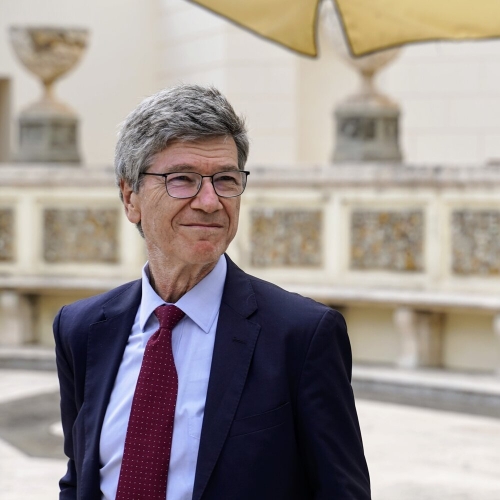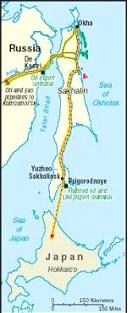vendredi, 27 mai 2022
Nous avons besoin d'un nouveau Bandoeng
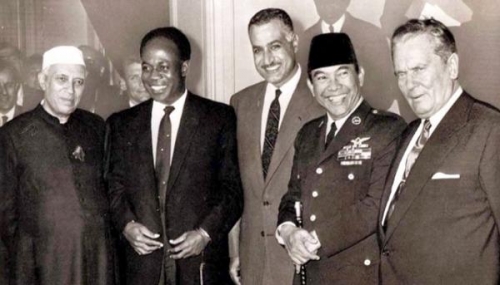
Nous avons besoin d'un nouveau Bandoeng
Konrad Rękas
Source: https://kolozeg.org/?p=362260
L'essence même de la sécurité internationale fait référence à l'héritage du Mouvement des Etats Non-Alignés, à la tradition de Gandhi, Nehru, Nkrumah, Soekharno et Tito. Et cette fois, le nouveau Bandoeng doit être aligné. Aligné sur la cause de la paix, au-delà et contre les guerres impérialistes des capitalistes occidentaux et orientaux.
Au début du printemps, nous sommes passés de la pandémie à une situation de guerre. Et comme nous le savons, la guerre est la méthode préférée des impérialistes pour repousser et dissimuler les contradictions internes et les crises du capitalisme. Rien n'alimente l'économie aussi bien que le sang des travailleurs. Et la guerre russo-ukrainienne, le nouveau rideau de fer et la propagande réactivée qui voit des "Rouges sous tous les lits" - tout cela souligne l'importance de relancer un mouvement anti-guerre à la base et fait entrevoir la nécessité de relancer le Mouvement des États et des Nations non alignés.
Il n'y a pas d'aussi bonnes affaires que les affaires conclues en temps de guerre
L'auto-dissolution du bloc soviétique et l'émergence d'une réalité internationale unipolaire dans les années 1990 ont faussement rassuré les pacifistes du monde entier. La disparition de la menace d'une annihilation nucléaire par les superpuissances était faussement assimilée à une absence totale de menace de guerre. Malheureusement, l'impérialisme ne fonctionne pas sans guerres, et pour le capitalisme, il n'y a pas de meilleurs affaires que celles faites en temps de guerre. Pendant ce temps, les protestations contre chaque opération militaire hégémonique ultérieure se sont considérablement atténuées. De guerre en guerre, les protestations contre les agressions perpétrées contre l'Irak, la Serbie, l'Afghanistan, la Libye, la Syrie, contre le conflit au Yémen, l'intervention au Liban, le blocus de Gaza - devenaient de plus en plus discrètes et de plus en plus insignifiantes. N'impliquant de plus en plus que les protestataires habituels. Le pacifisme et le mouvement pour le désarmement n'ont pas disparu mais ont été houspillés dans le coin d'une pièce avec, pour les désigner, un panneau: "Vieux hippies, sont sympas, mais ne faites pas attention. Nourrissez-les, à l'occasion".
Et les guerres, les crimes de guerre, la privatisation des guerres par les entreprises - se déroulaient quelque part, bien loin, en toute sécurité. Après tout, les téléviseurs et les canaux d'information peuvent toujours s'éteindre, et de toute façon, ils fournissent toujours des diagnostics simples et faciles, grâce auxquels nous pouvons immédiatement distinguer les Bons des Méchants. Et comme un des côtés n'est toujours que bon et l'autre toujours que mauvais - cela n'a pas de sens, il est faux de mettre un signe égal entre eux, n'est-ce pas? Nous devons rester solidaires avec les gentils, leur souhaiter la victoire et les encourager, car être contre les guerres signifie aider les méchants, n'est-ce pas? Certes, ce n'est pas juste, mais nous les avons laissés nous convaincre. Nous voulions être convaincus ! Nous avons laissé nos enfants l'apprendre. Nous avons accepté que cette propagande, l'absolution de toute guerre, de toute agression, de tout armement - triomphe dans les médias, les films, les jeux, dans toute la géoculture.
Nous acceptons en silence la censure militaire, même si notre pays n'est pas formellement partie prenante des conflits. Nous ne pouvons pas nous rétablir après la pandémie - parce qu'il y a la guerre. Nous ne pouvons pas accélérer la réalisation de l'objectif climatique - parce qu'il y a une guerre. Et des sanctions. Et la guerre froide. Et le marchandage des pouvoirs pour de nouvelles répartitions d'influences.
Malheureusement, les capitalistes et les gouvernements ne peuvent rien nous offrir - parce qu'ils sont trop occupés par les guerres. C'est leur point de vue. Et même une sorte de vérité : nous ne tirerons aucune leçon de la soi-disant pandémie, nous ne sortirons pas du cycle des crises du capitalisme - tant qu'il y aura des guerres impérialistes. Par conséquent, le mouvement pour la paix n'est pas et ne peut pas être un passe-temps du dimanche, mais doit être l'essence même de notre opposition au capitalisme et à l'impérialisme.
L'expérience tragique ukrainienne
Sur la base de l'expérience ukrainienne, cependant, quelqu'un pourrait dire: "Eh bien, vous êtes contre les guerres, vous voulez dissoudre l'OTAN et établir des zones dénucléarisées - ne voyez-vous pas ce qui est arrivé aux Ukrainiens?". C'est une très bonne question. Retenez-la quand vous l'entendez. Car c'est l'Ukraine qui confirme à quel point le mouvement anti-guerre a raison. Vladimir Poutine et les Russes sont maintenant présentés comme les seuls responsables de la guerre ukraino-russe, comme l'incarnation de l'archétype des méchants n° 1. Mais c'est le système capitaliste qu'il faut blâmer dans sa quête d'accumulation infinie, réalisée également en Ukraine, gérée par la bourgeoisie compradore. Le conflit d'intérêts des oligarques russes, ukrainiens et occidentaux est de nature purement capitaliste. Car en fait, les sociétés britanniques ou américaines intéressées par la libéralisation et la colonisation de l'Ukraine sont aussi des exemples d'oligarchie. Les coupables de la guerre en Ukraine sont l'impérialisme et le militarisme - venant de l'Occident, utilisant l'OTAN pour absorber de nouvelles zones et augmenter la menace de guerre. Enfin, le nationalisme est à blâmer, et dans sa version la plus horrible, la version nazie, qui a toujours drogué les travailleurs pour qu'ils ne voient pas leurs intérêts de classe.
"Et l'arme nucléaire, après tout, l'Ukraine y a renoncé - et a été attaquée !" - criera quelqu'un. C'est tout le contraire - en tant qu'État neutre dénucléarisé, l'Ukraine était totalement à l'abri, bien que toujours soumise aux pathologies du capitalisme oligarchique. Les Ukrainiens ont été attaqués lorsque, au lieu de la neutralité, on leur a proposé le militarisme de l'OTAN. Lorsque des politiciens nationalistes ont commencé à annoncer l'acquisition d'armes nucléaires et la construction de "bombes sales". Et surtout, la guerre a éclaté lorsqu'il s'est avéré qu'elle servait les intérêts de tous les oligarques-capitalistes concernés. Ne comprendrons-nous rien à cette leçon ?
Évidemment, le désarmement mondial est la toute première étape, mais le mouvement pour la paix ne peut se limiter à ce seul slogan. L'essence de la sécurité internationale est une référence à l'héritage du mouvement des États non alignés, à la tradition de Gandhi, Nehru, Nkrumah, Soekharno et Tito. Et cette fois, le nouveau Bandung doit être aligné. Aligné sur la cause de la paix, au-delà et contre les guerres impérialistes des capitalistes occidentaux et orientaux.
Par Konrad Rękas
Journaliste et économiste polonais vivant à Aberdeen, Écosse, Royaume-Uni
10:53 Publié dans Actualité | Lien permanent | Commentaires (0) | Tags : actualité, bandoeng, pacifisme, mouvement pour la paix, ukraine, politique internationale |  |
|  del.icio.us |
del.icio.us |  |
|  Digg |
Digg | ![]() Facebook
Facebook
mardi, 24 mai 2022
La Turquie et l'ordre multipolaire
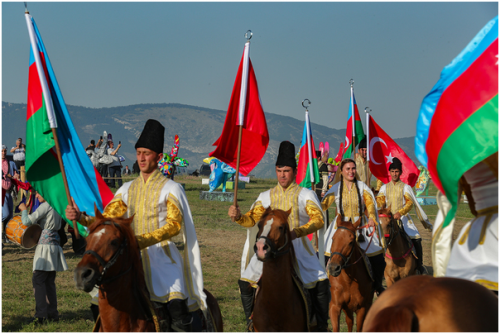
La Turquie et l'ordre multipolaire
par Pierluigi Fagan
Source : Pierluigi Fagan & https://www.ariannaeditrice.it/articoli/turchia-e-ordine-multipolare
Je m'inspire d'un article sur la Turquie paru dans Ria Novosti (Russie), pour montrer la complexité des jeux multipolaires. La Turquie est l'idéaltype d'un lieu géo-historique multipolaire. Pendant plus de six siècles, un empire musulman sunnite, avec un passé plus récent en tant que société réformiste laïque. Asiatique mais toujours méditerranéenne, la Turquie est née de peuples non indigènes qui ont migré il y a des siècles de l'Asie centrale, où leur ethnie et leur langue sont originaires, la zone violette de la carte (ci-dessous, entre la Caspienne et l'Aral, les peuples Orghuz).
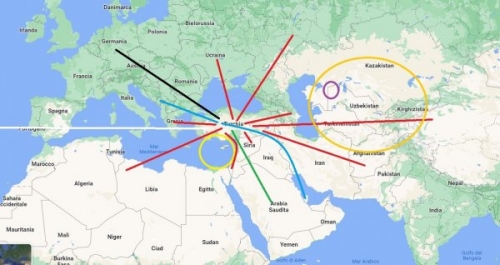
Il va sans dire qu'il existe un penchant naturel pour les peuples de langue turque (les quatre "stans" d'Asie centrale, cercle jaune), bien que ceux-ci soient également courtisés par les États-Unis, sont les alliés (économiques et militaires) pas toujours convaincus de la Russie, qui demeurent en étroite relation économique avec la Chine. En utilisant ces trois zones horaires du cadran général, nous allons procéder dans le sens des aiguilles d'une montre pour voir les autres lignes de relation entretenues par la Turquie contemporaine.
Avec la Chine, la concurrence porte précisément sur la zone de l'Asie centrale et surtout sur les Ouïghours, avec lesquels, soit dit en passant, les ancêtres des Orghuz ont eu un conflit historique au 8e siècle. Les djihadistes ouïghours (chinois) ont été un élément important utilisé par la Turquie dans le récent conflit en Syrie. D'autre part, Ankara regarde avec satisfaction le projet chinois BRI, qui devra compter avec la zone turque pour son développement. L'analyse même des relations avec la Chine montre une dynamique typique des relations multipolaires, à savoir le découplage des intérêts militaires et économiques. On peut être en concurrence sur l'un et collaborer sur l'autre, et investir davantage sur l'un au détriment de l'autre peut servir à équilibrer les relations avec différents partenaires. Le réseau systémique élastique qui en résulte est précisément ce qui caractérise un "ordre multipolaire", un concept que beaucoup ont du mal à comprendre.
Il semble que les Turcs aient désormais une présence militaire dans l'Afghanistan post-conflit, dont ils gèrent actuellement l'aéroport. La Turquie développe fortement son industrie militaire dont elle utilisera les produits pour la géopolitique de sa région, en concurrence avec les Russes, les Chinois et les Américains ou les Européens. Sur l'Iran nous ne rapportons rien de spécial, les relations sont discrètes bien que les deux pays soient des ennemis historiques et naturels.
La courbe bleue signale l'allié organique le plus proche d'Ankara, le Qatar. Mais depuis l'époque des grandes frictions entre le Qatar et les monarchies du Golfe, nous sommes passés à une recomposition des intérêts. Ainsi, après l'affaire du journaliste saoudien taillé en morceaux à Ankara (l'affaire Khashoggi), qui avait rendu les relations avec les Saoudiens très aigres, ceux-ci ont maintenant rouvert des relations diplomatiques selon leurs intérêts (Ligne verte, sur la carte).
La Turquie a un ennemi naturel à sa porte, à savoir les factions kurdes de Syrie (YPG), liées au Parti communiste kurde (PKK) de Turquie, qu'Ankara considère comme des terroristes. C'est la raison, avec d'autres questions d'approvisionnement militaire et de relations avec la Grèce, l'ennemi des ennemis pour Erdogan, pour laquelle les négociations USA-Suède/FIN-TURK donnent le feu vert à l'entrée des Scandinaves dans l'OTAN. Ce problème est moins simple que présenté habituellemen et typique des contradictions entre politique intérieure et extérieure dans les systèmes multipolaires. Pour les Suédois et les Finlandais, il s'agit d'abjurer leur amitié idéale et valorisante avec les formations politiques de la démocratie radicale (le tournant d'Öçalan vers la pensée démo-anarcho-écologiste et féministe de M. Bookchin), pas du tout simple en termes d'échelles de valeurs pour les deux pays historiquement en tête du classement occidental des "démocraties complètes". Le reste, c'est-à-dire les fournitures d'armes et de technologies demandées par Ankara, s'arrangera, mais ce point, en termes de politique intérieure, sera douloureux pour les deux Etats scandinaves.
La nouvelle géopolitique d'Ankara a également conduit à une récente recomposition des relations avec Israël, où Erdogan s'était distingué en étant pratiquement le dernier musulman à soutenir le Hamas (plus de forme que de fond, mais cela compte dans le monde arabe). Cela s'explique également par le cercle jaune ci-dessus. C'est là que se trouve le plus grand trésor, encore caché dans les entrailles de la terre, le gaz naturel. Mais il y a aussi un enchevêtrement multipolaire. La région est dominée par l'Égypte, qui, dans les partitions que constituent les différentes formes de sunnisme politique, est aux antipodes d'Ankara (même si le rapprochement avec les monarchies arabes alliées du Caire pourrait apaiser les esprits) et les deux sont dans des camps opposés en Libye. Il y a ensuite Israël, le Liban et la Syrie, précisément la partie nord-ouest où se trouve une présence militaire russe stratégique. Mais surtout Chypre, ou plutôt le différend historique entre les zones grecque et turque, et bien sûr la Grèce en tant que propriétaire de facto de la mer Égée, autant un ennemi extérieur que les Kurdes sont un ennemi intérieur.
En Libye, Ankara est avec nous et au moins formellement aussi les Américains contre les Russes-Emiratis-Français. L'ancrage turc en Libye est peut-être la présence militaire étrangère la plus importante d'Ankara et fait partie d'une stratégie méditerranéenne très complexe, mais considérée comme stratégique au plus haut degré également parce qu'elle a une base géo-historique solide.
Passons pour l'instant sur la ligne blanche des relations avec les États-Unis, sur laquelle nous reviendrons en conclusion. L'article russe fait allusion à quelque chose de nouveau qui devra être vérifié et suivi. Les Américains auraient promis à Ankara d'entrer dans l'EMS-EPA, qui est un traité de collaboration entre les États-Unis, Israël, la Grèce et Chypre (Grèce) pour forer dans la mer Égée et faire un nouveau gazoduc (East Med) utile à l'opération de désengagement de l'Europe vis-à-vis des approvisionnements russes. Le sujet de beaucoup d'impolitesse mutuelle entre Ankara et Athènes ces dernières années et d'une longue perspective en tout cas. La Grèce, à son tour, s'allie localement avec la France et l'Italie. Un bel enchevêtrement, du pain pour la haute diplomatie, fournir des armes un peu ici et un peu là, ce qui n'est pas du tout facile. Comme dans le cas des sacrifices demandés aux Scandinaves pour lever le blocus turc, convaincre les Grecs sera une tâche ardue, mais là encore, le poids d'Athènes est nul sur le plan international et géopolitique, ils avaleront l'accord à n'importe quel prix, si Washington le veut. Ce n'est pas le cas de la population grecque. La haine des Grecs pour les Turcs est inextinguible, elle est au cœur de l'identité nationale la plus viscérale.
La Turquie a pénétré profondément dans les Balkans musulmans, le Kosovo et l'Albanie en premier lieu. Ankara fait du chantage à l'UE et à l'Allemagne in primis, avec laquelle elle partage une importante communauté étrangère, sur le problème des migrants que les perturbations alimentaires et climatiques récentes et futures vont accroître, augmentant ainsi le pouvoir de chantage d'Erdogan. En outre, alors que l'Ukraine dépose sa demande d'adhésion à l'UE en une demi-heure, Ankara a déposé sa demande d'adhésion à l'UE en 1987, une UE avec laquelle elle partage une présence dans l'OTAN. Et pendant que nous sommes sur le sujet, notez la fourniture de drones turcs mortels à Kiev, comme un acte d'équilibre contre les Russes, pour maintenir l'équilibre à trois dans la mer Noire.
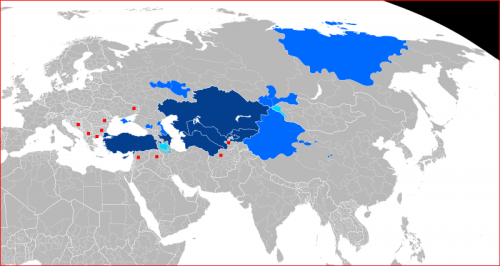
Nous en arrivons ainsi aux relations complexes avec les Russes. Ankara veut maintenir des relations bivalentes sur le plan militaire, mais cordiales sur le plan économique (elle n'a pas participé aux sanctions et a tenté d'organiser des sommets de la paix), un cas typique d'équilibrage avancé. Pour débusquer les "ambiguïtés" d'Erdogan (les mentalités dichotomiques qualifient d'"ambiguïté" tout ce qui n'est pas tout simplement noir ou tout simplement blanc) ou peut-être simplement pour suivre les intérêts des alliés "stan", Moscou a invité Ankara à rejoindre leur union militaire (OTSC), même si elle sait que c'est peu probable puisque les Turcs font partie de l'OTAN. Attention au Caucase. Ankara est avec l'Azerbaïdjan dans l'affaire du Nagorno-Karabakh, contre l'Arménie, la Russie à l'opposé. Je signale la sortie récente de Kadyrov (Tchétchène-Russe) engagé et à bien des égards crucial dans le conflit en Ukraine, un musulman, qui se dresse précisément contre les "ambiguïtés" d'Erdogan, la Tchétchénie est au beau milieu du Caucase et il y a des Tchétchènes qui sont peut-être parrainés par les Turcs du côté ukrainien, chose que n'apprécie pas Kadyrov dont le poids politique en Russie augmente.
Nous pouvons donc conclure en revenant sur les relations avec les États-Unis. En avril dernier, les États-Unis et la Turquie auraient mis en place un nouveau "mécanisme stratégique" conjoint, dirigé par Victoria Nuland (!), dont la première réunion a eu lieu à Washington entre Blinken et Cavasoglu il y a quelques jours. Tous les jeux énumérés ici composent un parallélogramme très complexe dans lequel les États-Unis tentent de s'insérer aux côtés d'Ankara, en donnant et en demandant. Après tout, Erdogan a fait de l'équilibre multipolaire la figure structurelle de sa stratégie géopolitique.
Nous avions besoin du cas turc à la fois pour actualiser le tableau des relations complexes avec le sommet turc et pour montrer à quel point elles sont complexes. On peut compter au moins 25 États de la vaste région "péri-ottomane" impliqués dans les relations avec Ankara, dont, en plus, trois puissances (USA-Russie-Chine), pour six macro-zones -Asie-Arabie-Afrique-Europe-Amérique-Méditerranée-, avec de multiples interrelations militaires, économiques, culturelles-religieuses, énergétiques, migratoires, géopolitiques, compétitives et coopératives.
Ce thème (la géopolitique d'aujourd'hui et de demain) sera désormais comme cela. Vous comprendrez donc comment le fait de s'enfermer dans l'angoisse du jugement, de surcroît litigieux, avant même d'avoir compris 10% du sujet, de cette affaire ou d'autres, expose la plupart au ridicule. Ceux qui minimisent ensuite la complexité vont également au-delà du ridicule, ce qui devrait être souligné et qui était alors le but implicite du poste laborieux.
[Le post mentionne le balayage des sujets mais ne suit pas entièrement le contenu de l'article de Ria Novosti que je joins tout de même par souci d'exactitude: https://ria.ru/20220522/ssha-1789945361.html ].
12:46 Publié dans Actualité, Affaires européennes, Géopolitique | Lien permanent | Commentaires (0) | Tags : turquie, levant, méditarranée, asie centrale, russie, ukraine, europe, politique internationale, affaires européennes, erdogan |  |
|  del.icio.us |
del.icio.us |  |
|  Digg |
Digg | ![]() Facebook
Facebook
L'Amérique se battra jusqu'au dernier Européen
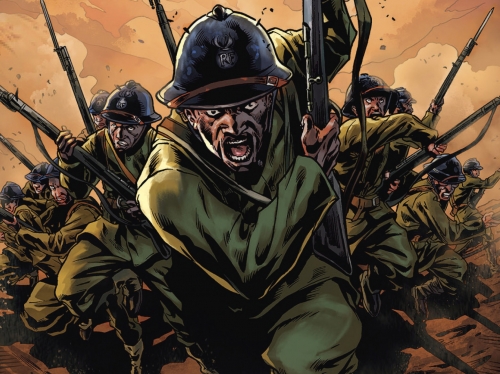
L'Amérique se battra jusqu'au dernier Européen
par Maurizio Bianconi
Source: https://www.destra.it/home/lamerica-combattera-fino-allultimo-europeo/
Mon frère, cadre supérieur sa vie durant, expert du monde d'en haut, m'a envoyé un SMS au début de la guerre : "L'Amérique est prête à combattre la Russie jusqu'au dernier ukrainien". Ces mêmes jours, le président Biden a lancé des épithètes contre Poutine, suicidaire sur le chemin de la paix. Je me suis souvenu d'une citation de Ken Follet: "un imbécile est un imbécile, mais un imbécile à la Maison Blanche est la chose la plus dangereuse au monde".
Ensuite, les choses sont allées sur une pente descendante jusqu'à la fourniture d'armes au pays attaqué avec des crédits faramineux. Il a été dit que les armes seraient utilisées pour aider l'Ukraine à résister. Puis la cible a changé : il a été dit que les armes et l'aide seraient utilisées "pour vaincre la Russie" et que la guerre durerait "très longtemps".
La Russie a annoncé des "armes secrètes" et a renforcé l'effort de guerre, de sorte que, dans un crescendo apparemment insensé, on s'attendait à l'annonce de la "guerre totale" par Poutine. Entre-temps, la demande, jamais formulée au cours des 70 années précédentes, de la Suède et de la Finlande d'adhérer à l'OTAN est apparue. Ce que Brzezinski a dit - selon l'histoire - à l'époque de la tentative d'intégration de la Russie à l'Europe "La Russie doit être repoussée en Asie" m'est revenu en tête.
Aujourd'hui, les choses semblent plus claires et des comportements que l'on croyait dénués de sens peuvent être déclinés à bon escient. Le mondialisme planétaire prôné par la post-démocratie financière envisageait un monde dominé par le marché. Les marchés en haut, les États en bas", comme le dit Tremonti. Le marché devait être dirigé par la finance occidentale.
Dans cette optique, la Chine a été admise au club du marché mondial (W. T. O.) en 2001 et la Russie en 2012. L'objectif était d'amener 2 milliards et plus de consommateurs sur le marché libre pour qu'ils soient également utilisés comme main-d'œuvre bon marché. En outre, des flots de ressources auraient été introduits sur le marché financier, qui seraient autrement à peine utilisables par la spéculation internationale.
Un geste imprudent, et l'Occident financier et mondialiste a eu le sort des cornemuses de montagne. Il a été joué et rejoué. L'Est produit à bas prix mais pour lui-même et envahit les marchés. Ses fonds souverains ont fait le plein et sont venus acheter une grande partie de la dette publique américaine. La Russie est stratégique en matière d'approvisionnement en énergie. Il s'est avéré que le mondialisme spéculatif devenait une arme aux mains de l'Est pour gagner la confrontation économique avec les pharaons de Wall Street. La phrase attribuée à Brzezinski s'est avérée prophétique.
Peu importe que cette guerre ait été causée, même en petite partie, par la pression américaine sur les nerfs à vif de la Russie. Ce qui est important, c'est que cette guerre est la prophase (le "prétexte" selon l'enseignement de l'historien Polybe) pour ramener le mondialisme à des dimensions plus autarciques. Une marche à reculons et un avenir qui sent le passé: l'Ouest par ici, l'Est par là.
Avec quelques précisions : l'Est compte autant de milliards d'habitants que l'Ouest et le jeu économique est désormais grand ouvert, avec une seule : les pauvres (de l'Est) seront plus riches, les riches (de l'Ouest) seront plus pauvres. L'Est possède des armes nucléaires chez tous ses protagonistes (Russie, Chine, Pakistan, Inde); l'Ouest n'en possède pas.
Le continent européen perd toute chance de constituer un bloc autonome et devient avant tout une ressource de guerre au service de l'atlantisme : l'Organisation du traité de l'Atlantique Nord, un avant-poste de l'empire par-delà la mer. Dans ce contexte, la fuite des Américains d'Afghanistan est plus compréhensible mais tout aussi inexcusable.
Une fuite déshonorante, un précédent à rappeler pour les hommes euroricains (Macron, Johnson) et nationaux (Draghi, Mattarella, E. Letta, M. Maggioni pour tous). La première Amérique présuppose un besoin similaire de fuir l'Europe. À ce stade, je reformule le SMS de mon frère : "L'Amérique est prête à combattre la Russie jusqu'au dernier Européen".
12:24 Publié dans Actualité, Affaires européennes | Lien permanent | Commentaires (0) | Tags : états-unis, europe, affaires européennes, russie, ukraine, politique internationale |  |
|  del.icio.us |
del.icio.us |  |
|  Digg |
Digg | ![]() Facebook
Facebook
lundi, 23 mai 2022
Le nouveau rideau de fer de l'Occident
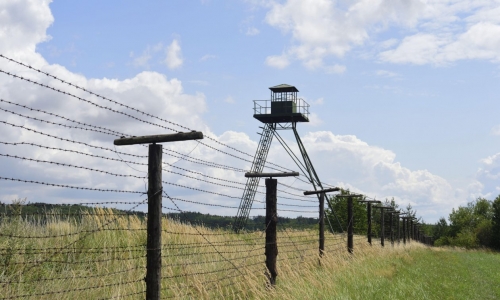
Le nouveau rideau de fer de l'Occident
Markku Siira
Source: https://markkusiira.com/2022/05/20/lannen-uusi-rautaesirippu/
La nouvelle guerre froide en Europe a commencé lorsque Vladimir Poutine est devenu président de la Russie après Boris Eltsine. Certains affirment que la "guerre hybride" de l'Occident contre la Russie dure depuis l'époque des tsars. Elle se poursuivra jusqu'à ce que la Russie soit détruite ou jusqu'à ce qu'elle vainque ses adversaires.
Dans les temps modernes, l'Occident a intensifié sa guerre anti-russe en organisant un coup d'État en Ukraine en 2014 qui a monté les Ukrainiens les uns contre les autres. La stratégie géopolitique de Zbigniew Brzezinski pour déstabiliser et immobiliser la Russie s'est poursuivie avec succès.
Les Etats-Unis ont enregistré une autre victoire dans leur lutte, lorsque les derniers neutres d'Europe, la Finlande et la Suède, ont été encouragés à demander leur adhésion à la machine de guerre transatlantique de Washington, l'OTAN, en invoquant des "conditions de sécurité modifiées".
Comme le souligne Patrick Lawrence, cette alliance renforce encore le mur que Washington, avec l'aide de ses alliés européens, a érigé pour séparer la Russie de l'Europe. Un nouveau rideau de fer s'est levé, cette fois-ci par l'Occident seul, divisant à nouveau ce coin du monde en "un Est et un Ouest".
Les États-Unis sont toujours la première superpuissance mondiale déstabilisatrice et maintenant, grâce à la guerre de l'information menée par les médias 24 heures sur 24, la culture russe est devenue une culture paria, que sous prétexte des événements d'Ukraine, on tente d'éradiquer.
De nombreux exemples de la censure de la culture russe pourraient être cités, visant les athlètes, les artistes, les écrivains et autres citoyens russes, mais citons, comme exemple le plus récent, le fait que la ville de Turku en Finlande a jugé bon de retirer la statue de Lénine du centre ville.
Il est ironique qu'à la suite de l'opération militaire russe, la statue de l'homme qui a donné à l'Ukraine et à la Finlande leur indépendance ait été retirée de l'espace public en Finlande. L'histoire qui nous unit à la Russie est maintenant balayée d'un revers de main, tout comme les statues ont été renversées aux États-Unis au nom de l'idéologie Woke. Est-ce cela que signifie cette "compatibilité avec l'OTAN" dont on parle tant ?
Tout porte les empreintes des stratèges de Washington, car c'est l'État profond américain qui reconstruit l'infrastructure euro-atlantique qui définira la nouvelle guerre froide. L'entrée des Finlandais et des Suédois dans l'OTAN est la dernière étape de la tentative d'isoler la Russie. La mer Baltique doit également être transformée en une "mer de l'OTAN" (dont les ressources naturelles des profondeurs doivent être accaparées par l'élite qui dirige l'Occident...).
Malgré les efforts et les facéties de Washington, il se pourrait bien que l'Occident, qui représente la "communauté internationale" dans son propre imaginaire, s'isole de la majorité des peuples du monde qui n'ont pas rejoint les masses haineuses et russophobes qui arborent des drapeaux ukrainiens sur leurs profils de médias sociaux.
Même l'annonce de la demande d'adhésion de la Finlande à l'OTAN et l'appel sans détour du président Sauli Niinistö à Poutine de "se regarder dans le miroir" n'ont pas, à la déception des zélateurs atlantistes, fait réagir le Kremlin. La Russie a adopté une attitude professionnelle, mais cela n'a fait qu'encourager la presse finlandaise à continuer de ricaner sur le fait que Poutine "n'ose rien faire".
Il y aura certainement une sorte de représailles si et quand la Finlande deviendra un membre officiel de l'OTAN. La Russie a déjà expulsé les diplomates finlandais et les robinets de gaz sont fermés. Il ne fait aucun doute que Moscou verra d'abord quel genre de mouvements militaro-techniques les États-Unis feront sous la bannière de l'OTAN dans l'espace territorial finlandais.
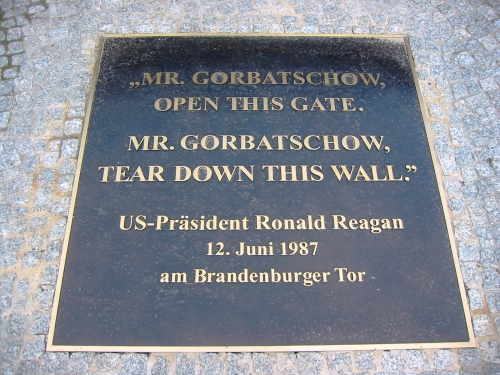
Après que le président américain Ronald Reagan ait demandé au dernier dirigeant soviétique Mikhaïl Gorbatchev, à Berlin en 1987, de "démolir le mur" qui symbolisait la séparation entre l'Est et l'Ouest, le programme "Build Back Better" créé sous la présidence de Joe Biden a pris une nouvelle signification en matière de politique étrangère ces derniers mois, à mesure que le rideau de fer occidental est tombé.
Comme dans les moments les plus froids de la confrontation entre les blocs de l'Ouest et de l'Est, ainsi dans la crise ukrainienne, la conscience des Européens et des Américains a été ratatinée par une éducation médiatique appropriée, de sorte que tout est devenu binaire, manichéen, dualiste. L'objectivité est absente et c'est maintenant la vision du monde en noir et blanc de la Finlande occidentalisée qui est servie au public dans la presse.
La Russie est catégoriquement "mauvaise" dans cette bulle de politique étrangère et de sécurité occidentale, tandis que l'Occident, avec ses guerres par procuration et ses sanctions contre la Russie, est "bon" dans toute sa grotesque exhibition. Les Européens sont prêts à perdre les derniers rêves de souveraineté qui leur restent et à commettre un suicide économique à la poursuite des intérêts de Washington.
La Finlande d'autrefois semble être en train de mourir. En raison de leur complexe d'infériorité, de nombreux Finlandais, y compris l'élite politique, sont prêts à tout pour avoir le sentiment d'"appartenir à l'Occident". La nation unique qui s'est dressée entre l'Est et l'Ouest est en train de reculer, alors que le processus d'américanisation met la touche finale à son adhésion à l'alliance militaire.
L'adhésion à l'Union européenne était déjà une erreur fatale et une perte d'indépendance, mais sur l'échiquier de l'Occident, étant devenue un pion à sacrifier à la politique des grandes puissances, la Finlande officielle abandonne son ancienne position, sûre et respectée, et ce de manière tout à fait inutile.
L'Union européenne s'est également rendue un mauvais service en participant aux plans sinistres de l'administration Biden. Bruxelles peut oublier le rôle potentiel du continent en tant que centre de pouvoir indépendant. Les rêves d'importance politique mondiale des eurocrates peuvent être enterrés à cause de la politique étrangère des États-Unis.
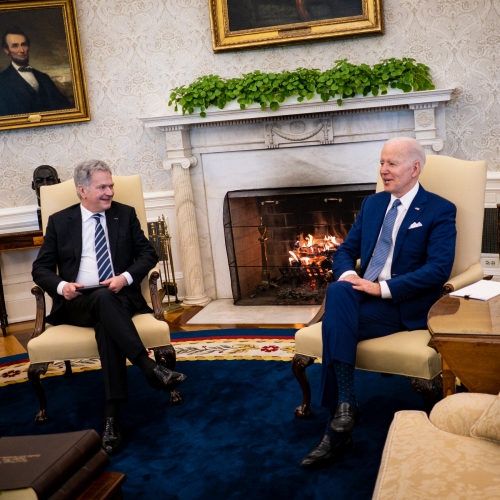
Pour Sauli Niinistö et ses partenaires, le plus important est de promouvoir la cause de l'élite qui dirige l'Occident. La dernière visite à Washington (photo) a été un autre spectacle embarrassant, avec ce vendu souriant comme un laquais à côté du président Biden et de la Première ministre suédoise Andersson. Peut-être que cette théâtralité des Coalitionnistes sera suivie d'une sévère gueule de bois et d'une dépression ?
Heureusement, une grande différence entre la première et la deuxième guerre froide est que maintenant le reste du monde a son mot à dire. Comme l'a dit la Chine, si je me souviens bien, dans le monde actuel d'interdépendance, aucun pays ne peut être simplement isolé par une décision unilatérale des États-Unis.
L'Occident cherche désespérément à déstabiliser et à diviser le monde en camps car sa suprématie est de plus en plus menacée. Elle est prête à lever un nouveau rideau de fer et à construire des murs pour tenter de répéter l'histoire. Bien sûr, cela ne réussira pas très longtemps, mais il ne fait aucun doute que l'hégémon aura le temps de créer davantage de chaos et de destruction avant d'être évincé.
19:15 Publié dans Actualité, Affaires européennes | Lien permanent | Commentaires (0) | Tags : actualité, europe, affaires européennes, états-unis, otan, atlantisme, occident, occidentalisme, finlande, suède, ukraine, russie, mer baltique |  |
|  del.icio.us |
del.icio.us |  |
|  Digg |
Digg | ![]() Facebook
Facebook
dimanche, 22 mai 2022
Les tensions du vingtième siècle derrière le conflit Russie-Ukraine
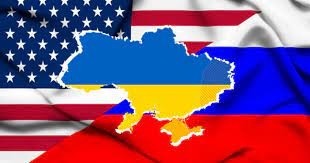
Les tensions du vingtième siècle derrière le conflit Russie-Ukraine
Le rôle des États-Unis, le choc entre l'Ours et la Baleine tandis que l'Europe reste une "belle endormie"
par Giuseppe Del Ninno
Source: https://www.barbadillo.it/104453-le-tensioni-novecentesche-dietro-il-conflitto-russia-ucraina/
Le différend dans la mer d'Azov
La guerre en Ukraine a fait remonter à la surface des mouvements souterrains ataviques, mais elle a aussi confirmé des tendances récentes; de plus, elle a fait exploser des contradictions qui couvaient déjà dans nos sociétés, par exemple en remaniant les distinctions entre la droite et la gauche, au point que les lecteurs de "Avvenire" et de "La Verità" se sont retrouvés sur des positions opposées à l'envoi d'armes en Ukraine, et donc dans le camp opposé à celui occupé par les lecteurs de "Il Giornale", "Corriere" et "Repubblica". Parmi les motions ataviques, il faut surtout compter l'opposition dynamique entre Terre et Mer, déjà théorisée par Carl Schmitt, qui l'a identifiée dans le conflit entre Rome et Carthage, sa première manifestation dans l'histoire ; or, les événements guerriers qui se déroulent à deux heures de vol de chez nous en représentent une variante typique.
Ce n'est qu'avec l'avènement de l'arme nucléaire et l'extension à la planète entière du scénario sur lequel s'affrontent les nouveaux sujets en lutte pour le Pouvoir que s'est imposée la notion de "guerre par procuration", où les véritables protagonistes - l'un, les Etats-Unis, la baleine symbolique dans la métaphore de Carl Schmitt, l'autre le binôme russo-chinois, souvent dépeint comme un ours - choisissent des représentants théâtraux et tragiques de leurs intérêts respectifs, pour déclencher des conflits qui les impliquent le moins possible.
C'est un scénario que nous avons vu mis en scène depuis la guerre de Corée, avec les États-Unis directement engagés contre cette puissance régionale, mais en réalité contre la République populaire de Chine, comme ce fut également le cas au Vietnam. Dans la suite de l'histoire de ce vingtième siècle que l'on croyait "court", mais qui a étiré ses excroissances malignes jusqu'au vingt-et-unième, la superpuissance américaine a toujours été présente, soit à la première personne, soit comme leader de coalitions, sous le signe de cette "alliance atlantique" qui, par son nom même, souligne son appartenance à la catégorie "mer" : avant l'Ukraine, nous en avons eu un avant-goût en Syrie.
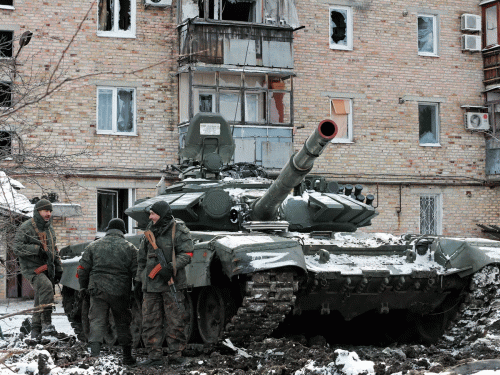
Dès lors, l'opposition réactivée entre cet ours et cette baleine, qui une fois de plus - après Belgrade et le Kosovo, autres exemples récents - a choisi l'Europe comme lieu de cette conflictualité représentative, atavique et tragique, ne doit pas surprendre. À nos yeux, ce sont donc moins les causes occasionnelles du conflit - que l'on veut de manière simpliste faire remonter et réduire à l'invasion russe de l'Ukraine - qui comptent que ces funestes tendances souterraines que nous avons mentionnées. Avec un minimum de prévoyance et de mémoire historique, le conflit, avec son cortège sanglant de mort et de dévastation, aurait pu être évité.
Quant au rôle évanescent de l'Europe, dans son pâle avatar qu'est l"Union européenne", nous sommes toujours dans le déjà vu: le chimérique "empire de 400 millions d'hommes" rêvé par des légions de politiciens et de penseurs d'orientations les plus diverses, de De Gaulle à Schumann en passant par Jean Thiriart, a ressemblé dès son origine à l'empire byzantin en déclin, destiné à être avalé par la jeune puissance islamique, dans ses diverses configurations impériales. Il n'est pas nécessaire d'en dire trop sur son asservissement à l'OTAN, le bras militaire de l'Hégémonie atlantique: même dans notre propre pays en lambeaux, après l'unanimité initiale pour défendre le pays envahi, des réserves et des distinctions sont émises, presque de tous les côtés de l'échiquier politique, et des questions sont posées sur les intérêts réels des acteurs en jeu. En effet, les Etats-Unis ne cachent pas leur intention fondamentale, qui ne consiste pas tant en un changement de régime qu'en l'usure de la puissance russe jusqu'à son déclassement économique, militaire et politique, jeu, qui plus est, qui se jouerait sur un théâtre éloigné de leur territoire; tandis qu'en Europe - notamment dans certaines de ses composantes comme l'Allemagne et l'Italie, qui dépendent de l'ours russe sur le plan de l'énergie - l'idée d'un éventuel élargissement et prolongement du conflit ne répond à aucune stratégie géopolitique cohérente et rationnelle.
Et à propos de l'Italie, il est à peine utile de noter l'inversion accessoire du rapport Gouvernement-Parlement, ce dernier étant appelé uniquement et de plus en plus rarement à ratifier les choix de l'Exécutif. Ce n'est que lorsqu'il s'est agi d'éviter la dissolution des Chambres - et le résultat défavorable probable d'élections anticipées pour les détenteurs du pouvoir depuis des décennies - que la nature de notre pays en tant que république parlementaire a été invoquée, avec l'assentiment "alimentaire" de nombreux députés et sénateurs, craignant de perdre prématurément leurs salaires et indemnités.
Il y a ensuite un aspect de cette guerre qui, s'il ne s'agissait pas d'un événement tragique, prêterait à sourire, à savoir la connotation "légaliste" de chaque initiative: la Russie de Poutine - et non le peuple russe, s'empresse-t-on de préciser - doit être punie pour avoir violé le droit international avec son "opération spéciale". D'ailleurs, l'une des conséquences de ce conflit se répercute sur l'utilisation des mots: ce n'est pas la guerre, mais précisément une "opération spéciale", et ce n'est pas la reddition du bataillon Azov, mais l'évacuation; ou bien on utilise des périphrases, pour ne pas définir comme "co-belligérants" ou "alliés" ceux qui fournissent des armes à l'une des parties en conflit. Mais quand la politique du pouvoir a-t-elle jamais adhéré aux règles du droit international? La diplomatie du XIXe siècle appelait déjà les traités "chiffon de papier"...
La guerre entre la Russie et l'Ukraine
Et maintenant, il suffirait de rappeler qu'aucune des guerres après 45 n'a été déclarée selon ces règles; sans parler de l'action de l'"intelligence" adverse et de l'organisation des différents "coups d'État": ces arguments suffiraient à démasquer "avec quelles larmes et avec quel sang" s'écrivent chaque politique impériale, chaque relation conflictuelle entre États. Ne parlons pas de la prétention de qualifier de "génocide" les massacres inévitables de tout conflit et d'invoquer les tribunaux internationaux pour frapper les perdants (mais on se garde bien d'appeler la République populaire de Chine à la barre, ne serait-ce que pour établir une responsabilité, dont les contours commencent à se dessiner, à l'égard de cette pandémie dans laquelle nous nous débattons encore). Malheureusement, nous avons vu des génocides au sens strict du terme, et ils n'avaient rien à voir avec ce qui se passe entre Lviv et Kharkiv, entre Kiev et Odessa : il suffit de penser au massacre des Amérindiens, à la persécution des Arméniens et, surtout, à l'Holocauste, pour comprendre ce que signifie le mot "génocide".
Parmi les dégénérescences de la culture "occidentale", en bref, il y a l'intention louable d'encadrer le conflit récurrent entre Léviathan et Béhémoth dans les catégories du droit, pour tenter de l'exorciser; mais le Mythe et la Technologie, qui donnent corps et âme à la Politique, ne se laissent pas gouverner par l'Économie et l'Éthique (en fait, en ce qui concerne ces dernières, les vainqueurs se posent toujours en gardiens et protecteurs de la Morale Unique). Et bien sûr, le corollaire du Droit - ou son incontournable contrepartie - est la Démocratie, que l'Hégémonie atlantique voudrait imposer au Globe entier, avec le fracs de ses bombes et l succession des coups d'Etat qu'elle organise ; une catégorie de la Pensée grecque transplantée outre-mer et exquisément européenne, qui s'est affinée au cours des millénaires et qu'elle voudrait maintenant imposer à des portions de la planète comme un corps étranger à ces cultures disparates. Dans le conflit russo-ukrainien, il y a aussi le recouvrement hypocrite des intérêts géopolitiques par des arguments de principe vertueux. Malheureusement, si notre Europe est la Belle au bois dormant du conte de fées, il n'y a pas de prince charmant à l'horizon prêt à la réveiller avec son baiser salvateur.
Giuseppe Del Ninno
10:31 Publié dans Actualité, Affaires européennes, Géopolitique | Lien permanent | Commentaires (0) | Tags : actualité, europe, russie, ukraine, affaires européennes, politique internationale, géopolitique |  |
|  del.icio.us |
del.icio.us |  |
|  Digg |
Digg | ![]() Facebook
Facebook
mercredi, 18 mai 2022
La russophilie et la russophobie comme facteurs géopolitiques en Europe de l'Est
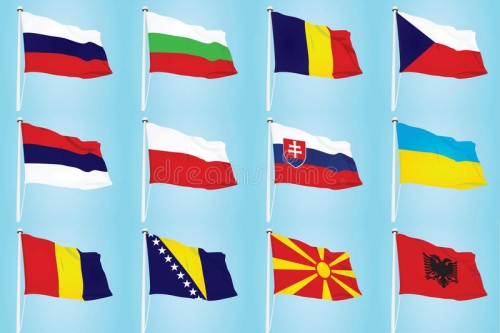
La russophilie et la russophobie comme facteurs géopolitiques en Europe de l'Est
par le comité de rédaction de Katehon
Source: https://www.ideeazione.com/russofilia-e-russofobia-come-fattori-geopolitici-nelleuropa-orientale/
Le rôle clé dans la position des pays est joué par la présence ou l'absence d'élites souveraines au pouvoir.
L'opération militaire spéciale (SVO, abréviation russe) menée par la Russie en Ukraine dure depuis trois mois et est loin d'être terminée. Cette longue campagne n'aurait pas été possible sans l'assistance militaire sans précédent de l'OTAN au régime ukrainien. Les pays d'Europe de l'Est limitrophes de l'Ukraine jouent un rôle clé à cet égard. D'une part, c'est par le territoire de ces États que passent les livraisons d'équipements militaires. Ils fournissent également de vieilles armes soviétiques, avec lesquelles l'armée ukrainienne a l'habitude de travailler. D'autre part, ce sont ces pays qui accueillent la plus grande part des réfugiés ukrainiens. Ils supportent les principaux coûts et risques d'une confrontation avec la Russie.
Dans cette optique, le facteur idéologique acquiert une importance particulière. La russophobie ancrée dans la psychologie nationale ou, au contraire, une attitude traditionnellement amicale ou neutre envers la Russie peuvent être des facteurs influençant la stabilité dans un pays donné. À cet égard, les pays d'Europe de l'Est ne sont pas homogènes.
Slovaquie
En avril, les autorités slovaques ont livré à l'Ukraine leur système unique de défense aérienne S-300. La livraison du complexe a eu lieu en secret. L'opposition s'est fortement opposée à ce geste. Elle a accusé les autorités slovaques d'entraîner le pays dans le conflit et de réduire ainsi la capacité de défense du pays. Les États-Unis ont promis d'envoyer des systèmes de défense aérienne Patriot à la Slovaquie. Toutefois, ils seront contrôlés par du personnel militaire non slovaque, ce qui prive la Slovaquie du contrôle de son espace aérien, dé-souverainisant de la sorte ce petit pays.
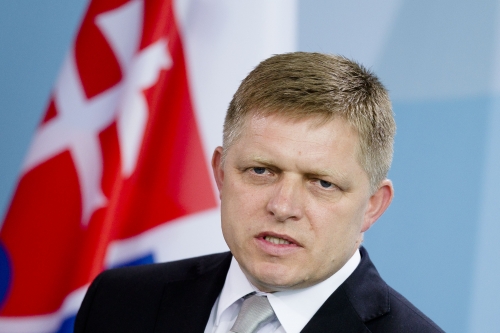
L'ancien premier ministre slovaque et leader du parti Smer-SD, Robert Fico (photo), affirme que "le transfert des S-300 pour la défense aérienne à l'Ukraine est un acte de guerre aux conséquences imprévisibles pour la Slovaquie".
Malgré les protestations, le Premier ministre slovaque Eduard Heger est allé plus loin et, le 12 avril, a proposé de fournir des avions MiG-29 slovaques à l'Ukraine. L'armée de l'air slovaque possède une douzaine de ces appareils. Auparavant, même la Pologne n'osait pas prendre une telle mesure, craignant les attaques russes sur son territoire. Dans le même temps, malgré la propagande anti-russe, un tiers des Slovaques soutiennent l'opération militaire spéciale russe en Ukraine.
Le 4 mai, la Slovaquie a également annoncé qu'elle était prête à réparer les équipements militaires ukrainiens endommagés. Ainsi, la république, où les sentiments pro-russes, a-t-on noté, étaient les plus prononcés parmi tous les pays d'Europe centrale avant l'opération militaire spéciale, est la plus intensément impliquée dans les hostilités parmi tous les pays du flanc oriental de l'OTAN. La raison en est que ce pays est le moins "sujet" de sa propre histoire. En 2018, la Slovaquie a connu sa "révolution colorée", les manifestations "anti-corruption" fomentées par l'Occident ont conduit à la démission de Robert Fico, puis à la perte de la majorité parlementaire par le parti Smer-SD. Le gouvernement slovaque peut être contraint de faire ce que même la Pologne n'ose ouvertement pas faire. Cette politique s'accompagne de répressions : ils tentent de priver Robert Fico de son mandat de député et l'arrêtent pour avoir divulgué des informations sur les violations fiscales de ses adversaires (les informations auraient été obtenues illégalement). Auparavant, un autre leader de l'opposition, le chef du parti populiste de droite Notre Slovaquie, Marian Kotleba, a été privé de son mandat parlementaire sur la base d'accusations forgées de toutes pièces.
Pologne
Le 30 mars, le Premier ministre polonais Mateusz Morawiecki a déclaré que la Pologne "établissait des normes d'un certain type" sur ce que l'on appelait auparavant la russophobie. Varsovie se sent comme un nouveau centre de l'Europe qui, sur la vague du sentiment anti-russe, tente de démontrer son leadership. D'une part, cela s'applique à la France et à l'Allemagne. D'autre part, la Hongrie. Le vice-premier ministre du gouvernement polonais et véritable leader du parti au pouvoir Droit et Justice, Jaroslaw Kaczynski, a déclaré que la Pologne "ne peut plus coopérer" avec la Hongrie tant que celle-ci ne change pas de cap.
Nous parlons de la coopération entre la Hongrie et la Russie. Le Premier ministre hongrois Viktor Orban tente de bloquer toute tentative d'imposer des sanctions européennes sur le gaz et le pétrole russes, car elles "tueraient la Hongrie". La Hongrie est également le seul pays européen à réclamer une enquête objective et indépendante sur la tragédie de Bucha. D'autres ont déjà accusé la Russie de tout.
"Lorsque le Premier ministre Orban dit qu'il ne peut pas voir ce qui s'est exactement passé à Bucha, on devrait lui conseiller de consulter un ophtalmologue", a poursuivi le chef du parti Droit et Justice au pouvoir.
Malgré la tentative de la Pologne de jouer les premiers violons dans le concert russophobe des puissances occidentales, cela n'a pas amélioré ses relations avec Bruxelles. Les dirigeants conservateurs de la Pologne sont depuis longtemps en conflit prolongé avec les dirigeants de l'UE. Pour cette raison, l'UE a suspendu l'allocation de fonds à la Pologne.
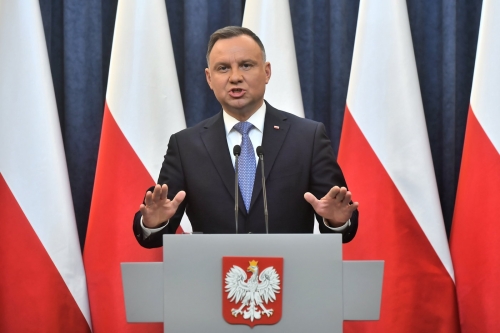
Le 4 mai, le président polonais Andrzej Duda (photo) a déclaré dans une interview au Wall Street Journal que pour lui "la présence de troupes américaines dans notre région" est une garantie contre "l'expansion de la politique impériale russe". Il a souligné qu'il serait "très heureux si ces troupes restaient ici de façon permanente".
Hongrie
La décision de Viktor Orban de payer le gaz russe en roubles pourrait entraîner l'isolement de la Hongrie, a menacé le ministre allemand de l'économie Robert Habeck.
Selon lui, les actions du Premier ministre hongrois contredisent la décision du G7 de payer l'énergie russe dans les devises stipulées dans les contrats: dollars et euros. Ainsi, l'UE commence déjà à mettre en œuvre sa politique d'isolement, qui a été clairement évoquée en prévision de la victoire électorale d'Orban.
La position de la Hongrie a été critiquée par d'autres pays de l'OTAN et de l'UE pendant les mois de l'opération militaire spéciale. Les dirigeants ukrainiens ont accusé Budapest de planifier la saisie de territoires ukrainiens (sans noter l'existence de tels plans en Pologne). En conséquence, le Premier ministre hongrois Viktor Orban s'est retrouvé sur le site Myrotvoretz dans la liste des ennemis de l'Ukraine.
Dans l'UE, la Hongrie s'oppose fermement aux plans visant à imposer un embargo pétrolier à la Russie, même avec une prolongation pour la Hongrie et la Slovaquie jusqu'à la fin de 2023. Parmi les pays d'Europe centrale et orientale, la Hongrie adhère à la position la plus indépendante, ce qui complique la construction d'un front commun anti-russe.
Roumanie
En Roumanie, le pompage de la société par la propagande anti-russe a conduit à une attaque terroriste contre l'ambassade de Russie le 6 avril, lorsqu'un citoyen local faisant l'objet d'une enquête pour pédophilie s'est déclaré ukrainien et a foncé sur les grilles de l'ambassade de Russie à Bucarest, après quoi il s'est immolé avec sa voiture.
La Roumanie, en cas d'escalade du conflit en Transnistrie, pourrait prendre le contrôle de la République de Moldavie, selon des sources médiatiques russes. Le sud de la Bessarabie - une partie de la région ukrainienne d'Odessa, séparée du principal territoire ukrainien par une barrière naturelle - l'estuaire du Dnestr - revêt également une importance stratégique pour la Roumanie.
La Roumanie, comme la Pologne, joue un rôle clé dans l'approvisionnement de l'Ukraine en carburant et en armes occidentales. La présence des troupes américaines dans le pays augmente. Dans le même temps, la Roumanie intensifie sa coopération avec l'Ukraine pour envoyer des marchandises via la Moldavie. Par conséquent, la Roumanie devient d'une importance capitale dans la fourniture d'armes au sud de l'Ukraine et à la région d'Odessa et dans l'exportation de produits ukrainiens.
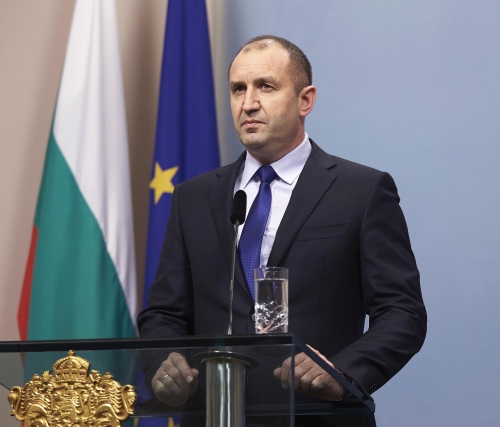
Bulgarie
En Bulgarie, des manifestations ont eu lieu tout au long du mois d'avril contre les livraisons d'armes à l'Ukraine. Les manifestations étaient organisées par le parti parlementaire "Vazrazhdane" ("Renaissance"). Le président Rumen Radev (photo) s'est opposé à la fourniture d'une assistance militaire à l'Ukraine. La décision de Gazprom de suspendre les ventes de gaz à la Bulgarie a heurté les positions des russophiles bulgares. Cependant, cette situation a été causée par le refus du gouvernement du pays lui-même d'acheter du gaz en roubles.
Le 4 mai, le parlement bulgare (à l'exception des députés de Renaissance) a voté en faveur de la fourniture d'une assistance humanitaire et militaro-technique à l'Ukraine. Kiev souhaiterait réparer ses équipements militaires en Bulgarie et exporter des céréales via le port de Varna (les ports roumains sont déjà pleinement utilisés par l'Ukraine). Le président Radev a critiqué la décision du parlement, déclarant qu'"il y a un danger d'entraîner la Bulgarie dans ce conflit". Selon le chef de l'État, "le conflit ne sera pas court, il s'intensifiera et nécessitera des solutions raisonnables, et le terme même d'"assistance militaro-technique" est plutôt vague et risqué".
Il convient de noter qu'en Bulgarie, le niveau de soutien à la Russie au cours des derniers mois (février à mai) a chuté de 32% à 25%. En même temps, il faut tenir compte du fait que dans le contexte de la propagande hystérique anti-russe et de la réticence de nombreux Bulgares à parler aux sociologues de leur véritable état d'esprit, par peur de la répression et de l'ostracisme, dans le contexte du discours anti-russe dominant dans les médias, 25% est un chiffre substantiel. Dans cette situation, au moins un quart de la population déclare ouvertement son désaccord avec le récit anti-russe.
Grèce
En Grèce, tout comme en Bulgarie, des manifestations contre la fourniture d'armes à l'Ukraine ont eu lieu début avril. Cependant, aujourd'hui, les principaux arguments des manifestants sont la critique de l'augmentation des prix de l'énergie associée à l'adhésion de la Grèce aux sanctions anti-russes.
En général, les facteurs de russophilie ou de russophobie ne jouent pas un rôle particulier en Grèce. Les principales forces anti-guerre du pays sont la gauche. La détérioration de la vie des gens ordinaires est un facteur clé pour contrer l'implication dans le conflit. En général, dans les pays de l'OTAN d'Europe de l'Est, le facteur russophilie et russophobie joue un rôle en Slovaquie et en Bulgarie, où les forces pro-russes étaient auparavant au moins un peu évidentes. C'est dans ces pays que se pose aujourd'hui la question de la stabilité politique et d'éventuelles élections anticipées en raison de problèmes politiques internes, mais un facteur externe agit comme un catalyseur : le conflit en Ukraine et la perspective d'être entraîné dans une guerre avec la Russie.
Dans les États baltes, en Pologne et en Roumanie, la situation est plus stable. Toutefois, d'une manière générale, la pression de Washington, Londres et Bruxelles est si forte que l'opposition des forces pro-russes en Bulgarie et en Slovaquie risque d'être brisée. Le rôle clé dans la position des pays, comme le montre l'exemple de la Hongrie, est joué par la présence ou l'absence d'élites souveraines au pouvoir. Dans le premier cas, même l'expérience historique relativement négative des relations avec la Russie ne fait pas obstacle à une évaluation sobre de la situation. Au contraire, dans les pays totalement dépendants de l'Occident et dotés d'élites faibles, aucune expérience historique positive ne joue un rôle particulier ; de plus, il est possible en peu de temps de "raviver" la conscience de la majorité de la société par une exposition médiatique intense.
16 mai 2022
18:57 Publié dans Actualité, Affaires européennes | Lien permanent | Commentaires (0) | Tags : russie, europe, pologne, slovaquie, hongrie, roumanie, bulgarie, grèce, peco, europe centrale, europe orientale, ukraine, affaires européennes, politique internationale, russophilie, russophobie |  |
|  del.icio.us |
del.icio.us |  |
|  Digg |
Digg | ![]() Facebook
Facebook
mardi, 17 mai 2022
L'UE veut s'endetter pour l'Ukraine
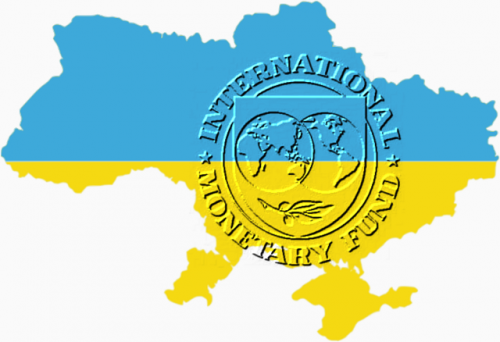
L'UE veut s'endetter pour l'Ukraine
Bernhard Tomaschitz
Source: https://zurzeit.at/index.php/eu-will-schulden-fuer-die-ukraine-aufnehmen/
Pour se maintenir à flot économiquement, l'Ukraine a besoin d'environ 15 milliards d'euros au cours des trois prochains mois, soit cinq milliards d'euros par mois. Cette somme doit par exemple permettre de payer les retraites, d'assurer l'approvisionnement des personnes déplacées à l'intérieur du pays ou de régler d'autres coûts liés à la guerre. Les Etats-Unis se sont engagés à couvrir un tiers des besoins financiers de l'Ukraine au cours des trois prochains mois, et les deux tiers restants seront pris en charge par l'Union européenne, selon un rapport du magazine "Politico".
Comme l'écrit "Politico" en citant des diplomates, la Commission européenne prévoit de trouver l'argent pour Kiev sous la forme d'une dette commune de l'UE. Les États membres devraient ensuite garantir les dettes contractées par la Commission européenne. "Cela ressemble au programme SURE, qui a été utilisé pendant la pandémie pour collecter des fonds pour les chômeurs de courte durée, ont déclaré les diplomates", rapporte "Politico". A l'époque, la Commission avait demandé des garanties à hauteur de 25 milliards d'euros pour lever 100 milliards d'euros.
Le projet de la Commission européenne ne fait pas l'unanimité. En effet, certains pays, dont l'Allemagne, l'Autriche et la Grèce, ont demandé à la Commission de fournir des options de financement alternatives avant la présentation de son plan le 18 mai. Quoi qu'il en soit, la présidence française a l'intention de soumettre le dossier à la discussion fin mai afin que les chefs d'Etat et de gouvernement puissent en débattre.
17:07 Publié dans Actualité, Affaires européennes | Lien permanent | Commentaires (0) | Tags : ukraine, europe, affaires européennes, dettes, union européenne |  |
|  del.icio.us |
del.icio.us |  |
|  Digg |
Digg | ![]() Facebook
Facebook
jeudi, 12 mai 2022
Les Non-Alignés dans le conflit russo-ukrainien
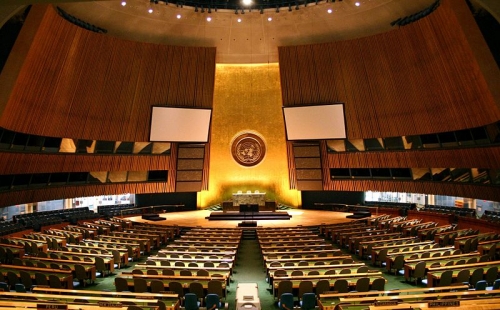
Massimiliano Palladini:
Les Non-Alignés dans le conflit russo-ukrainien
Source: https://novaresistencia.org/2022/05/10/os-nao-alinhados-no-conflito-russo-ucraniano/
Le récit hégémonique prétend que la Russie est isolée et que la "communauté internationale" l'a condamnée ? Mais est-ce vrai ? Il est crucial d'analyser les positions concrètes des pays dans les forums internationaux et de lire entre les lignes des votes de l'Assemblée générale des Nations unies.
Depuis le début de l'opération russe en Ukraine, il est courant d'entendre que Moscou est isolé de la communauté internationale. Les partisans de cette thèse s'appuient sur la résolution adoptée par l'Assemblée générale des Nations Unies le 2 mars. Entre autres choses, le document non seulement "désapprouve dans les termes les plus forts l'agression de la Fédération de Russie" mais exige également qu'elle "retire immédiatement, complètement et inconditionnellement toutes ses forces militaires du territoire de l'Ukraine à l'intérieur de ses frontières internationalement reconnues" (donc également de la Crimée et des oblasts de Donetsk et de Lougansk) [1].
En fait, la résolution a été adoptée avec des chiffres qui semblent soutenir la thèse de l'isolement de la Russie de la société internationale: 141 pour, 35 abstentions et 5 contre, tandis que 12 États n'ont pas participé au vote [2].
Des pays très peuplés comme la Chine, l'Inde, le Pakistan, le Bangladesh, l'Éthiopie, le Vietnam et l'Iran ont choisi de s'abstenir ou de ne pas participer au vote (cas de l'Éthiopie) tandis que l'Afrique accueille le plus grand nombre de pays s'abstenant ou ne participant pas au vote. Le vote à l'Assemblée générale a divisé le continent : 28 pour, 25 abstentions ou absences et un contre (Érythrée).
Ces dernières années, la Russie a fait des efforts pour projeter son influence en Afrique, principalement en tirant parti des fournitures militaires et en renforçant des relations remontant à l'époque de l'Union soviétique. En 2019, le président Vladimir Poutine a accueilli le sommet Russie-Afrique, auquel ont participé 43 chefs d'État et de gouvernement africains [3]. En novembre de cette année se tiendra la deuxième édition du sommet [4], qui sera un indicateur utile pour évaluer dans quelle mesure la guerre en Ukraine a affecté les relations entre Moscou et le continent africain.
En ce qui concerne la résolution du 2 mars, il y a au moins deux points importants à souligner: les pays qui s'abstiennent, s'opposent ou sont absents représentent au moins 40% de la population mondiale; la résolution non seulement n'a pas de conséquences contraignantes, mais ne fait pas non plus référence aux sanctions contre la Russie et à l'envoi d'armes et d'aide financière aux belligérants.
Les résolutions adoptées avec des numéros de plébiscite sont celles qui n'ont pas de conséquences contraignantes, comme celle du 2 mars. Le 7 avril, l'Assemblée générale a adopté une autre résolution suspendant la Russie du Conseil des droits de l'homme de l'ONU. Ainsi, la résolution du 7 avril, contrairement à celle du 2 mars, a eu des conséquences contraignantes et, en fait, le nombre de ceux qui y étaient favorables a diminué de près de cinquante pourcents, bien qu'elle soit restée majoritaire.
La résolution du 7 avril a été adoptée avec le résultat suivant : 93 pour, 24 contre, 58 abstentions, 18 absences [5]. Les États qui s'opposent, s'abstiennent ou s'absentent représentent au moins 50 % de la population mondiale. Les abstentions ont été augmentées par le vote favorable de certains États le 2 mars. Il s'agit notamment de l'Arabie saoudite, du Brésil, de l'Égypte, du Ghana, de l'Indonésie, de la Jordanie, du Kenya, du Koweït, de la Malaisie, du Mexique, du Nigeria, d'Oman, du Qatar, de la Thaïlande et de la Tunisie.
Comme mentionné ci-dessus, la résolution du 2 mars ne fait aucune référence à des sanctions contre la Russie, ni à l'envoi d'armes aux parties belligérantes. Quels États ont sanctionné la Russie ? Lesquels ont décidé d'armer l'Ukraine ? Ces questions ne peuvent être ignorées si nous voulons évaluer pleinement la réaction de la société internationale à l'invasion russe.
Les États occidentaux ont adopté la position la plus sévère à l'encontre de la Russie. Il convient de noter que les pays appartenant à ce groupe n'ont pas tous réagi de la même manière, notamment en ce qui concerne la fourniture d'armes à l'Ukraine. Le type et la quantité d'armes envoyées varient d'un État à l'autre, mais les pays de l'OTAN ont sans aucun doute adopté la ligne la plus ferme.
L'aide militaire fournie par les membres de l'Alliance de l'Atlantique Nord ne vise pas seulement à renforcer les capacités défensives de l'Ukraine, mais aussi, sinon principalement, à affaiblir les capacités offensives de la Russie, la forçant ainsi à investir plus de ressources que prévu dans la campagne ukrainienne [6]. Le conflit russo-ukrainien a ainsi pris des connotations qui le font ressembler à une guerre par procuration: les pays de l'OTAN, menés par les États-Unis et le Royaume-Uni, financent et arment l'Ukraine dans l'intention explicite d'affaiblir la Russie. En pratique, en finançant et en armant Kiev, Washington poursuit son intérêt stratégique (affaiblir Moscou pour tenter de provoquer un changement de régime) sans avoir à supporter les coûts d'une confrontation directe.
Si l'on regarde au-delà de la sphère d'influence des États-Unis, on remarque immédiatement que le reste du monde a adopté une position très différente. Les présidents du Mexique et du Brésil, entre autres, ont proclamé leur neutralité, refusant de condamner ouvertement la Russie, tandis que le président de l'Afrique du Sud a déclaré que la guerre est également la responsabilité de l'OTAN et de son expansion continue vers l'est. Des considérations similaires ont également été exprimées par Luiz Inácio Lula da Silva, candidat aux élections présidentielles brésiliennes [7].
Le 2 mars, à l'occasion de l'adoption de la résolution de l'Assemblée générale, l'ambassadeur brésilien aux Nations unies a exprimé son opposition aux "sanctions aveugles" car elles entravent le dialogue diplomatique [8].
L'Amérique latine, l'Asie et l'Afrique se dissocient des sanctions et des ventes d'armes à l'Ukraine. Dire que la communauté internationale a condamné la Russie est donc faux. Ou plutôt, cela dépend de ce que l'on entend par condamnation. Si l'on entend par là le vote d'une résolution sans conséquences concrètes, alors oui, la Russie a été condamnée par une grande partie de la communauté internationale. Si, toutefois, nous considérons les décisions ayant des conséquences matérielles, la situation change radicalement.
Le reste du monde répond à la politique anti-russe des pays occidentaux par le non-alignement. Les accusations plus ou moins explicites contre la Russie n'ont pas été suivies de contre-mesures concrètes comparables à celles prises par les États-Unis et leurs alliés.
Notes:
[1] Pour le texte complet de la résolution, voir UN resolution against Ukraine invasion : Full text, aljazeera.com, 3 marzo 2022. Dernier accès le 8 mai 2022.
[2] Pour la carte du vote, voir Ivana Saric, Zachary Basu, 141 pays votent pour condamner la Russie à l'ONU, axios.com, 2 marzo 2022. Dernier accès le 8 mai 2022.
[3] Antonio Cascais, Russia's re-engagement with Africa pays off, dw.com, 9 marzo 2022. Dernier accès 8 maggio 2022.
[4] Kester Kenn Klomegah, Russia Chooses St. Petersburg for Second African Leaders Summit, indepthnews.net, 12 gennaio 2022. Dernier accès le 8 mai 2022.
[5] Pour le tableau des votes, voir Avec 93 "oui", dont l'Italie, l'AGNU suspend la Russie du Conseil des droits de l'homme, onuitalia.org, 7 avril 2022. Dernier accès le 8 mai 2022.
[6] Julian Borger, Pentagon chief's Russia remarks show shift in US's declared aims in Ukraine, theguardian.com, 25 aprile 2022. Dernier accès le 8 mai 2022.
[7] Dave Lawler, The world isn't lining up behind the West against Russia, axios.com, 6 maggio 2022. Dernier accès le 8 mai 2022.
[8] Le Brésil vote pour la résolution de l'ONU, mais critique les "sanctions indiscriminées" contre la Russie, reuters.com, 2 mars 2022. Dernier accès le 8 mai 2022.
Source : Eurasia Rivista
22:05 Publié dans Actualité | Lien permanent | Commentaires (0) | Tags : actualité, onu, guerre russo-ukrainienne, russie, ukraine, politique internationale |  |
|  del.icio.us |
del.icio.us |  |
|  Digg |
Digg | ![]() Facebook
Facebook
mardi, 10 mai 2022
"Dans la nouvelle étape, les États-Unis seront un acteur important, mais ils ne seront pas une puissance hégémonique comme il y a quelques années"
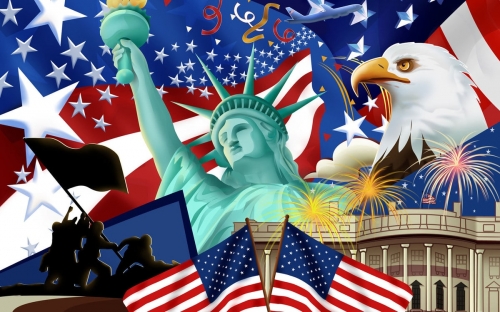
"Dans la nouvelle étape, les États-Unis seront un acteur important, mais ils ne seront pas une puissance hégémonique comme il y a quelques années"
Entretien avec Andrés Berazategui
Propos recueillis par Santiago Asorey
Source: https://www.agenciapacourondo.com.ar/internacionales/en-la-nueva-etapa-estados-unidos-sera-un-actor-importante-pero-no-sera-una-potencia?fbclid=IwAR3jCX7vWjQV37h3rUow1Mp60ea7Uxj_azUWF5vURLH1ClWfc9BpeiJpKuY
Andrés Berazategui est titulaire d'un diplôme en relations internationales, d'un master en stratégie et géopolitique et d'un diplôme en analyse stratégique internationale. Il est également membre du groupe de réflexion et du projet d'édition Nomos. Dans une interview accordée à l'AGENCIA PACO URONDO, il a réfléchi au conflit géopolitique qui oppose les puissances atlantistes de l'OTAN et la Fédération de Russie en Ukraine.
APU : Commençons par le conflit lui-même, en Ukraine, et la rapidité avec laquelle le différend entre les puissances atlantistes et la Chine et la Russie a développé des tensions dans le monde entier, sur la base des pressions exercées par les États-Unis pour imposer une guerre économique à la Russie. Comment le nouvel ordre international émerge-t-il de ce nouveau scénario ?
AB : Deux aspects importants peuvent être soulignés, au-delà de ceux déclarés par la Russie en relation avec la région de Donbass. D'une part, les aspects strictement géopolitiques: la Russie en tant que puissance ne peut pas permettre (comme toute puissance qui se respecte) des voisins hostiles à sa périphérie. Les puissances sont mal à l'aise face aux menaces proches de leurs frontières. D'autant plus que l'Ukraine appartient à l'ancien espace soviétique, une zone que les Russes considèrent comme leur zone naturelle et immédiate de projection d'intérêts. Et ce d'autant plus que l'Ukraine est particulièrement sensible dans l'histoire de la Russie, tant pour des raisons historico-culturelles que militaires (c'est la zone classique d'empiètement de l'Ouest sur l'Est).
D'autre part, il existe un conflit d'une plus grande portée: le défi permanent lancé par Poutine à l'ordre libéral international. Poutine a remis en question à plusieurs reprises les politiques, les valeurs et les institutions de l'ordre dirigé par les États-Unis. Le président russe n'est pas d'accord avec le projet libéral et l'expansion de ce modèle d'ordre, mais cherche à faire reconnaître la nouvelle répartition mondiale du pouvoir et où la Russie doit être reconnue comme un acteur important. Ce point est particulièrement sensible, car il remet en cause l'ordre international né avec la fin de la guerre froide, c'est-à-dire qu'il ne s'agit pas d'une question conjoncturelle. Il s'agit du désir de la Russie d'organiser un ordre dans lequel elle est plus favorisée, et le principal obstacle est un États-Unis qui cherche à étendre ses propres valeurs et institutions de manière compulsive. Cette situation est déjà de plus en plus remise en question, même à Washington, et il faut donc s'attendre à des changements importants dans l'ordre international.
Quant à la Chine, elle s'est tenue à distance prudente du conflit en Ukraine. D'après ce que l'on peut voir dans ses médias, il est largement admis que le PCC n'est pas d'accord avec l'intervention elle-même ; mais pour la Chine, elle a beaucoup plus à gagner de la Russie en tant que partenaire stratégique, elle ne s'opposera donc pas non plus activement au Kremlin.
APU : "Que se passe-t-il aujourd'hui ? C'est la destruction du système d'un monde unipolaire qui s'est formé après la chute de l'URSS", a déclaré Poutine il y a un mois. Voyez-vous un déclin de l'hégémonie atlantiste ?
AB : Il est certain qu'il y a un déclin des États-Unis et donc un relâchement du maintien des politiques de l'ordre libéral international. Il y a une Chine défiante qui se rapproche de plus en plus de l'équilibre des attributs du pouvoir dans tous les segments de la compétition avec les États-Unis. Il existe une Russie révisionniste qui cherche à déplacer davantage de frontières et qui a conclu un accord avec la Chine. Il y a des mouvements en Europe qui pourraient conduire à une autonomie croissante du vieux continent par rapport aux États-Unis. Dans notre Amérique, le drapeau de l'intégration a déjà été hissé et, bien que ralentie, elle reste un objectif... c'est un monde en transition : nous passons d'un ordre unipolaire à un ordre de grands espaces où le grand espace atlantique (Grossraum, en langage schmittien) sera un parmi d'autres. Les États-Unis seront un acteur important, mais en aucun cas une puissance hégémonique comme il y a quelques années.
APU : La hausse du coût de l'énergie pour les populations européennes dépendantes du gaz et des hydrocarbures russes constitue également un problème électoral pour les dirigeants européens qui tentent de défendre une position pour le moins discutable d'un point de vue national. Cependant, les États-Unis ont prévalu. Quelle explication trouvez-vous à cela ?
AB : Étant donné que les événements se déroulent toujours, il reste à voir dans quelle mesure les États-Unis ont fait prévaloir leurs vues. De plus, en Europe, les points de vue sur l'approvisionnement en énergie ne sont pas unanimes, aussi des mesures prudentes ont-elles été prises sur cette question. Je pense que les Allemands, en particulier, sont impatients de voir le conflit en Ukraine prendre fin dès que possible et de revenir à la normalité (au fait, qu'est-ce que la "normalité" aujourd'hui ?), au moins en ce qui concerne l'approvisionnement en énergie. Cependant, en raison des enjeux que j'ai mentionnés plus haut, je pense que les questions énergétiques ne sont pas les plus importantes aujourd'hui. Je crois qu'en fin de compte, nous parlons des forces souterraines de l'histoire qui mettent à l'épreuve la force des cultures et des peuples dans une lutte où s'affrontent de grandes volontés collectives. Et les tensions générées par ces volontés seront utiles à ceux qui sauront en tirer parti, que ce soit par une intervention ouverte dans la lutte ou par la sagesse de ceux de "l'extérieur" dans la gestion de leurs intérêts.
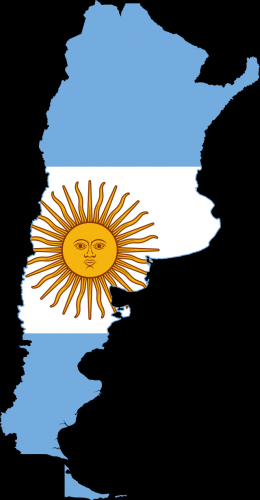
L'Argentine dans le monde
APU : La deuxième partie de l'interview porte sur la position de l'Argentine, mais dans la perspective de la troisième position historique du péronisme.
AB : La troisième position est née comme une alternative qui promouvait l'épanouissement individuel en harmonie (et dans un rapport de subordination) avec le destin collectif. En politique étrangère, compte tenu du fait que la seconde après la Seconde Guerre mondiale divisait deux blocs, l'un mettant l'accent sur l'individualisme capitaliste et l'autre sur le collectivisme marxiste, la troisième position a marqué ses propres modes d'organisation de la vie sociale et politique et a établi une neutralité face au conflit Est-Ouest, évitant ainsi de s'aligner sur l'un des deux blocs. En même temps, cela laissait la voie ouverte pour tirer parti et maximiser les intérêts avec l'un ou l'autre lorsque cela était nécessaire, car il ne s'agissait pas d'une position d'opposition compulsive : en bref, sans nous aligner politiquement ou sur les questions de sécurité, nous avons commercé avec les deux blocs, par exemple. La troisième position a promu son propre modèle philosophique politique dans les affaires intérieures et a recherché la liberté d'action en politique étrangère. En ce qui concerne la confrontation entre l'Occident et la Russie au sujet du conflit actuel en Ukraine, je ne pense pas que la troisième position s'applique, notamment en raison de deux problèmes : D'une part, nous ne sommes pas dans un moment bipolaire analogue à celui de la guerre froide (il est possible que cela se produise à long terme entre les États-Unis et la Chine, mais il est encore prématuré de l'affirmer) ; en fait, nous sommes aujourd'hui en transit vers un monde multipolaire. D'autre part, nous évoluons également vers un monde plus pragmatique et moins idéologique qu'à l'époque. Dans la conjoncture actuelle, j'ai tendance à valoriser la validité de la troisième position - comme je l'ai fait dans un autre ouvrage - en tant que contrepoint à la dialectique entre l'individualisme libéral et le collectivisme des "nouvelles luttes" dans le style de Tony Negri, Holloway et d'autres. Une dialectique qui, par ailleurs, dans ses expressions politiques concrètes finit (du moins en Occident) par être légitimée par un discours libéral, tant de gauche que de droite, si ces concepts ont un sens aujourd'hui.
APU : Comment analysez-vous le vote argentin à l'ONU sur l'expulsion de la Russie du Conseil des droits de l'homme ?
AB : Je considère que c'est incorrect. Il y avait au moins la possibilité de s'abstenir. C'est une méfiance gratuite, sachant que les implications pratiques de l'appartenance à un tel organisme sont secondaires. Je considère qu'il s'agit d'un impact plus symbolique que matériel, ce qui explique qu'il n'affecte pas non plus la Russie de manière substantielle, mais il s'agit toujours d'une position prise par l'Argentine et ce n'est pas une position appropriée à prendre : il s'agit d'un conflit dans lequel nous devrions adopter la neutralité. Quel était l'avantage de l'expulser ? Que gagne l'Argentine ? En quoi ce vote nous positionne-t-il mieux ? Je ne vois rien de positif dans cette décision.
APU : L'Argentine est également confrontée à un défi lié aux conditions imposées par l'accord avec le FMI. La construction d'une centrale nucléaire à laquelle participe la China National Nuclear Corporation est menacée par la pression des Etats-Unis, quelle analyse proposez-vous sur ce point de conflit ?
AB : En ce qui concerne le FMI, il s'agit d'un passif absolu. Elle limite sérieusement nos options économiques, mais aussi nos options de politique étrangère, car la dette est une conditionnalité politique, même si nos politiciens veulent la formuler en termes strictement financiers. Cela devrait être compris par tous et faire l'objet d'un débat public : la dette et les organismes internationaux de prêt sont des instruments de projection de puissance par les pouvoirs en place. Le FMI ne demande pas seulement de faire fonctionner la politique fiscale ou telle ou telle variable macroéconomique. Et vous avez raison de faire le lien avec la centrale nucléaire. Si nous ne trempons pas nos barbes dans l'eau, cette initiative et d'autres seront bloquées par des États-Unis en pleine concurrence avec une Chine montante. La question que nous devons toujours nous poser est "qu'est-ce qui est dans notre meilleur intérêt". Et il n'est pas dans notre intérêt d'être liés à la dette, pas plus qu'il n'est dans notre intérêt de nous tourner vers les États-Unis pour qu'ils nous "aident" à résoudre nos problèmes. Il est vrai que lorsque vous négociez, vous devez céder quelque chose, mais quand avons-nous jamais bien négocié avec le FMI ? Les organisations internationales sont nées, façonnées et principalement financées par les grands acteurs internationaux et sont des plateformes de projection de leur pouvoir : il faut le comprendre une fois pour toutes.
22:06 Publié dans Actualité, Entretiens, Géopolitique | Lien permanent | Commentaires (0) | Tags : actualité, andrés berazategui, argentine, russie, ukraine, entretien, politique internationale, amérique du sud, amérique ibérique, amérique latine |  |
|  del.icio.us |
del.icio.us |  |
|  Digg |
Digg | ![]() Facebook
Facebook
L'Ukraine, le monde à la croisée des chemins
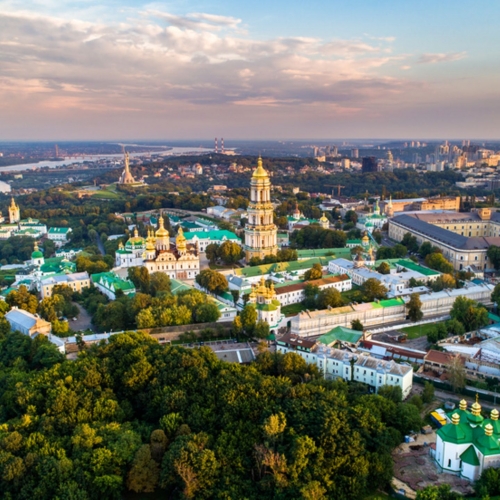
L'Ukraine, le monde à la croisée des chemins
par Giacomo Gabellini
Propos recueillis par Luigi Tedeschi
Source : Italicum & https://www.ariannaeditrice.it/articoli/ucraina-il-mondo-...
Entretien avec Giacomo Gabellini auteur du livre "Ukraine, le monde à la croisée des chemins", Arianna Editrice 2022
1) Les frontières de l'Ukraine sont indéfinissables et son identité unitaire s'avère donc floue. L'Ukraine actuelle correspond à la République socialiste soviétique instituée par Staline à la fin de la 2e guerre mondiale. À l'intérieur des frontières ukrainiennes, il existe des populations ethniquement, culturellement, linguistiquement et même religieusement très diverses, telles que des Ukrainiens, des Russes, des Polonais, des Hongrois, des Tatars, etc. ... Par conséquent, avec la rupture définitive des liens politiques, culturels et économiques avec la Russie et la sécession des régions orientales et de la Crimée (territoires pro-russes), l'identité ukrainienne n'apparaît-elle pas comme celle d'un État créé artificiellement, c'est-à-dire sur la base des sphères d'influence russes ou américaines ? Les valeurs unificatrices ne sont-elles pas représentées uniquement par l'adhésion à l'OTAN et à l'Union européenne, c'est-à-dire par l'occidentalisation américaniste et russophobe du pays ? N'assistons-nous pas à une énième reproduction de la logique de Versailles, qui s'est toujours révélée être un échec et un signe avant-coureur de nouveaux conflits potentiels ?
Il est difficile de prévoir avec un haut degré de certitude la configuration que prendra l'État ukrainien. Tout porte à croire, cependant, que le véritable ciment de ce qui restera de l'Ukraine sera un nationalisme aux traits russophobes marqués et un désir de vengeance contre le Kremlin. Beaucoup ont tendance à attribuer ce résultat uniquement à l'attaque déclenchée par la Russie, mais en réalité, la radicalisation du pays représente un phénomène qui était déjà largement observable avant même le déclenchement du Jevromajdan. Il ne faut pas oublier qu'en 2010, le président de l'époque, Viktor Juščenko, arrivé au pouvoir en pleine révolution orange, a décerné le titre de "héros de l'Ukraine" à Stepan Bandera, leader de l'aile maximaliste de l'Organisation des nationalistes ukrainiens (OUN), composée en grande partie de Novorusses catholiques de Galicie, vétérans des campagnes irrédentistes menées contre la Pologne dans les décennies précédant la "grande guerre". Le 21 juin 1941, à l'arrivée des troupes nazies, Bandera proclame l'indépendance de l'Ukraine et participe avec l'OUN et sa branche armée (UPA, l'Armée insurrectionnelle ukrainienne) à la fondation du bataillon Nachtigall, composé de volontaires ukrainiens et soumis à la chaîne de commandement de l'Abwehr (les services secrets militaires allemands). Travaillant aux côtés des envahisseurs et des divisions SS ukrainiennes comme celle de Galicia, l'Oun a activement contribué à l'extermination de dizaines de milliers de Juifs ukrainiens et à la campagne militaire allemande contre l'Union soviétique. L'association avec les envahisseurs a duré plusieurs mois, jusqu'à ce que l'échec de la reconnaissance allemande de l'indépendance ukrainienne, promise à l'Oun à la veille de l'opération Barbarossa, conduise Bandera et ses partisans à retourner leurs armes contre les Allemands. Le chef de l'Oun a ensuite été capturé par la Wehrmacht, puis libéré sur la base d'un accord avec l'Abwehr, qui prévoyait la formation d'une division ukrainienne du Schutz-Staffeln pour aider les troupes allemandes dans la déportation des Juifs et la répression des minorités polonaises. À leur tour, les Polonais ont riposté en s'alliant à l'Armée rouge et en brûlant des villages ukrainiens entiers, ce qui a donné lieu à une guerre civile prolongée et sanglante qui entraînera la mort de plus de 90.000 civils polonais et 20.000 civils ukrainiens. La guérilla antisoviétique menée par l'OUN sous la direction du chef militaire de l'UPA, Roman Šučevič, s'est poursuivie dans les années qui ont suivi la fin de la Seconde Guerre mondiale, mais lorsque la perspective de la défaite a commencé à se profiler, un grand nombre de ses figures de proue ont fui à l'étranger. Bandera, son collaborateur de confiance Yaroslav Stetsko et Lev Rebet, ancien membre du gouvernement ukrainien collaborationniste, s'installent à Munich. Bandera et Rebet seront attrapés et assassinés par un tueur à gages du KGB entre 1957 et 1959, tandis que Stetsko a réussi à survivre et à entrer dans les bonnes grâces de certaines personnalités de la politique américaine telles que Ronald Reagan et George H.W. Bush. D'autres militants de l'OUN et de l'UPA profitent de l'intercession du directeur de la CIA, Allen Dulles, pour s'installer au Canada et aux États-Unis, où ils créeront des mouvements d'exil à vocation ultra-nationaliste marquée. Au lendemain de Jevromajdan, on assiste d'une part à un processus de "nationalisation des masses" par la prolifération de statues et de monuments portant le nom de personnalités telles que Bandera, Šučevič et Stetsko. D'autre part, l'inclusion de membres dirigeants de mouvements extrémistes tels que Azov, Aidar, Dnepr, Pravij Sektor, Natzionalnyj Korpus et C-14 dans les corps spéciaux et les rangs de la police, grâce à l'intercession du très puissant ministre de l'intérieur Arsen Avakov. C'est grâce aux efforts d'Avakov et aux ressources mises à disposition par des oligarques de la trempe d'Ihor Kolomojs'kyj - propriétaire de la chaîne de télévision qui a lancé la série Serviteur du peuple, qui a garanti à Zelens'kyj une grande popularité, et principal financier de la campagne électorale de l'ancien acteur - que l'Ukraine a pu devenir un centre de gravité de très haut niveau pour le monde de l'extrême droite, capable d'attirer de nouveaux militants de trois continents différents grâce à une utilisation particulièrement efficace des principaux réseaux sociaux. On se demande quels résultats l'Union européenne espère obtenir en accueillant dans ses rangs un pays constamment tenu en échec par des éléments de ce genre.
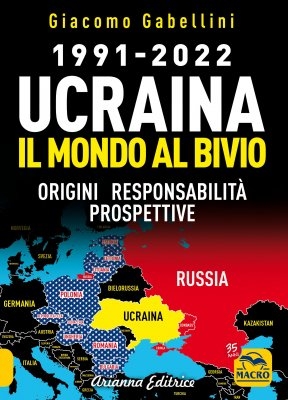
2) La guerre russo-ukrainienne revêt des significations géopolitiques qui vont au-delà des motivations spécifiques du conflit. La crise ukrainienne est, en fait, un conflit arbitré entre les États-Unis et la Russie, dont l'enjeu est l'existence même de deux grandes puissances. La Russie est un empire qui, depuis l'arrivée au pouvoir de Poutine, est animé par la nécessité de survivre à l'effondrement de l'URSS. La perte de l'Ukraine impliquerait la dissolution de la Russie elle-même, étant donné les liens historiques et culturels et l'interconnexion économique qui existent depuis des siècles entre les deux pays. L'Ukraine serait donc une partie intégrante et une terre ancestrale de la Russie. Pour les États-Unis, leur rôle de puissance mondiale disparaîtrait si un nouvel hégémon eurasien (Europe ou Russie) s'affirmait. La fin du leadership américain en Europe signifierait également la fin de la stratégie d'endiguement de la Chine dans l'Indo-Pacifique. La perspective d'un conflit qui pourrait s'étendre à de nombreux foyers de guerre étendus à l'ensemble de l'Eurasie, donnant lieu à une troisième guerre mondiale, bien que de faible intensité, entre la Russie et les États-Unis de durée indéterminée, n'est-elle pas en train de se dessiner ?
Comme l'a souligné l'influent politologue russe Sergei Karaganov, l'importance de l'Ukraine pour la Russie devrait être fortement réduite. Ce n'est pas tant parce que les liens historiques et culturels incontestables qui unissent les deux pays pourraient également résister à la formidable épreuve de l'agression russe, mais parce que la Russie est une nation inattaquable à tous égards. Toute la campagne de sanctions imposée par les États-Unis et l'Union européenne était fondée sur la prédiction que la Russie ne serait pas en mesure de résister à une longue période de pression économique et financière extérieure, en vertu de la faiblesse structurelle, du retard et des déséquilibres qui caractérisent son système productif. Les principales catégories de produits des exportations russes (pétrole, gaz, matières premières, produits agricoles) dressent le tableau d'une économie relativement peu avancée, à l'exception de quelques éléments discordants (les machines et équipements représentent la quatrième source de revenus d'exportation) et de quelques pics d'excellence dans les domaines aérospatial, informatique et militaire. Les économies avancées d'aujourd'hui, structurées comme elles le sont sur la base des orientations stratégiques suivies depuis les années 1980, reposent avant tout sur des activités à haute valeur ajoutée imputables au secteur tertiaire, qui contribuent bien plus à la formation du PIB que les macro-secteurs inclus dans les secteurs primaire et secondaire. Dans les économies modernes, les services financiers et d'assurance, le conseil, les technologies de l'information, les nouveaux systèmes de communication et le design prédominent sur l'agriculture, l'industrie manufacturière et l'extraction d'énergie et de minéraux. De plus, le PIB de la Russie est encore bien inférieur à celui du Japon, de l'Allemagne, de la France et même de l'Italie, mais il repose sur une production absolument indispensable car non remplaçable pour satisfaire les besoins de base. Les hydrocarbures, les métaux, les céréales, les engrais et le fourrage sont des ressources essentielles pour garantir le chauffage et la sécurité alimentaire et énergétique. Ces conditions sont assurées en période de calme, mais deviennent soudainement chancelantes en présence de situations géopolitiques hautement conflictuelles, dans lesquelles on redécouvre la primauté du pétrole, du gaz, de l'aluminium, du nickel, du blé, des engrais, etc. sur tout le reste. En d'autres termes, la Russie joue un rôle (géo-)économique énormément plus incisif et "lourd" que ce que l'on peut déduire de l'analyse aseptique des données relatives à la taille et à la composition de son PIB, de sorte à lui assurer une capacité de résilience presque inconcevable pour tout autre Pays. Ainsi qu'un éventail d'options alternatives à celle consistant à s'entêter à se tailler un rôle de co-protagoniste dans le "concert occidental". Pour l'Ukraine, cependant, c'est le contraire qui est vrai. Penser que la survie d'un pays aux caractéristiques similaires peut faire abstraction du rétablissement d'une relation de collaboration avec un colosse de la trempe de la Russie, avec laquelle il partage 2 000 km de frontière, est une pieuse illusion.
3) Le régime de sanctions sévères imposé par l'Occident à la Russie vise à provoquer non seulement la défaillance de la Russie elle-même, mais aussi un changement de régime conduisant à la défenestration de Poutine. Selon les plans de Washington, la fin du régime de Poutine entraînerait une nouvelle expansion économique et politique de l'Occident en Eurasie. De tels horizons sont-ils crédibles ? Actuellement, les sanctions ont entraîné une réorientation de la Russie vers l'Asie, avec de nouveaux accords commerciaux avec la Chine et l'Inde, ainsi que le renforcement des relations avec les pays arabes et le Moyen-Orient, pour lesquels l'importation de céréales et d'engrais en provenance de Russie est d'une importance vitale. La création de nouvelles zones commerciales avec des monnaies hors de la zone dollar (notamment le yuan chinois) se profile donc à l'horizon, afin de contourner les sanctions. Verrons-nous une contraction significative de la zone dollar dans le monde entier à court terme ? Par le biais de sanctions, l'Occident veut imposer l'isolement de la Russie dans le contexte mondial. Mais l'espace atlantique, dominé par le dollar, ne va-t-il pas se retrouver isolé et marginalisé tant sur le plan économique que géopolitique ?
Les sanctions n'ont pas réussi à provoquer des changements de régime dans des pays bien moins équipés pour amortir le choc, comme l'Iran et le minuscule Cuba, sans parler de la Russie. Où, comme l'aurait prédit toute personne ayant un minimum de connaissance de l'esprit du peuple russe, un sondage réalisé par le Levada Center (qualifié d'agent étranger par Moscou), qui n'est même pas proche du Kremlin, a certifié que le taux d'approbation de Poutine parmi la population russe est supérieur à 80%. L'attaque contre l'Ukraine a donné une brusque accélération au processus de réorientation géopolitique et économique de la Russie vers l'Est et le Sud, fondé précisément sur l'incapacité structurelle de la Fédération à faire face au commerce international. Les corollaires de ce changement de registre sont l'exclusion du dollar dans le commerce bilatéral, le développement de systèmes de paiement alternatifs à Swift, et la création d'infrastructures de communication alternatives à celles hégémonisées par les Etats-Unis. En bref, la Russie lance une attaque simultanée contre les piliers de l'ordre international sur lesquels les États-Unis ont fondé leur domination. En perspective, le conflit et la campagne de sanctions qui s'ensuit pourraient conduire à une segmentation du scénario international "mondialisé" en blocs géo-économiques beaucoup moins communicants que ce que nous avons vu jusqu'à présent. La première ressemble à une sorte de G-7 élargi avec environ un milliard de personnes, fortement inégalitaire du point de vue des balances commerciales et caractérisé par une position financière nette agrégée profondément négative. Sur le plan politique et culturel, ce bloc - et en particulier son pays le plus puissant, les Etats-Unis - remet en cause avec de plus en plus de vigueur le principe d'égalité formelle des Etats établi par la Charte des Nations Unies afin de préconiser l'introduction d'éléments discriminatoires favorables aux démocraties, qui priveraient peut-être la Russie et la Chine de leur droit de veto au Conseil de sécurité de l'ONU. Le second tourne autour du "triangle stratégique" - pour reprendre une expression d'Evgenij Primakov - Russie-Chine-Inde, réunissant plus de 3,4 milliards de personnes, associant pour la plupart des pays aux balances commerciales positives et enregistrant une position financière nette globale largement positive. Le "triangle stratégique" Russie-Chine-Inde est un bloc de structures économiques largement complémentaires dont l'énergie, les matières premières, les terres arables, l'industrie, la capacité de consommation et le savoir-faire technologique connaissent une croissance rapide. Ses pays membres sont généralement très impatients face à la prétention des pays occidentaux à être les porte-parole de l'ensemble de la communauté internationale, ce qui exclut clairement toutes les nations qui ne répondent pas aux exigences politiques, économiques et culturelles fixées de manière totalement arbitraire et discrétionnaire par l'alliance euro-atlantique. L'Union européenne est dépendante des importations d'énergie de la Fédération de Russie et survit grâce à des excédents commerciaux toujours plus colossaux, principalement avec les États-Unis et la République populaire de Chine, qui se traduisent par la compression systématique de la demande intérieure par des politiques d'assainissement budgétaire catastrophiques. Les Etats-Unis, avec une dette commerciale stratosphérique (859 milliards de dollars en 2021) et une position financière nette terriblement négative (plus de 13 000 milliards de dollars en 2021), n'ont plus de tissu industriel digne de ce nom, ne produisent que des services et importent toutes sortes de produits grâce à l'impression continue de dollars. Pour les Etats-Unis, l'accélération du processus de détérioration de la position dominante occupée par le dollar depuis 1945 en raison de l'abus de sanctions et des gigantesques déséquilibres structurels qui pèsent sur l'économie nationale représente une menace capitale. Le rééquilibrage d'une situation aussi critique ne peut faire abstraction du "confinement" de l'Amérique du Nord et de l'Europe dans le périmètre d'un espace énergétique-technologique-commercial transatlantique qui garantirait d'abord la rupture des liens de dépendance entre le "vieux continent" et les deux ennemis jurés des Etats-Unis, à savoir la Russie et la Chine. Si le projet de Washington devait aboutir, l'Europe serait confrontée à un avenir de colonie barbare, peu sûre et appauvrie des États-Unis.
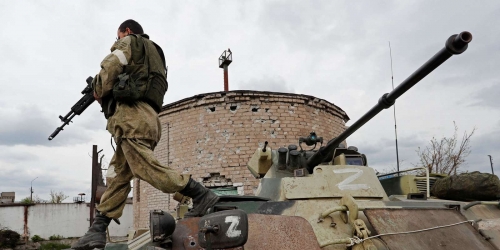
4) La dissolution de l'URSS a déterminé l'expansion de l'OTAN à l'Est. La crise ukrainienne elle-même est tout à fait cohérente avec la stratégie américaine de pénétration en Eurasie, qui impliquerait de déplacer indéfiniment vers l'est les frontières du nouveau rideau de fer. Le démembrement de l'ex-URSS a entraîné une diminution de la composante européenne au sein de la Russie, tant en termes de territoire que de population. La menace expansionniste de l'OTAN a conduit à une réorientation économique et géopolitique de la Russie vers l'Asie. Le développement de l'échange économique croissant et la nécessité d'une défense commune contre l'expansionnisme américain ont donné lieu à l'émergence d'un nouvel axe géopolitique composé de la Chine et de la Russie. Dans ce contexte, pour la Russie, les revenus tirés de la fourniture de gaz à l'Europe ne sont plus aussi cruciaux. La politique américaine de russophobie, déjà historiquement héritée de la Grande-Bretagne, n'est-elle pas responsable de cette conversion de la politique étrangère russe en une politique asiatique ? La mémoire historique devrait mettre en garde l'Occident. Si l'URSS et la Chine de Mao avaient été alliées pendant les années de la guerre froide, quel aurait été le sort de l'Occident ? Et ce n'est pas tout. La dissolution des liens historico-politiques entre la Russie et l'Europe ne signifierait-elle pas la disparition du rôle géopolitique séculaire joué par la Russie en tant que pont entre l'Europe et l'Asie et, en même temps, en tant qu'avant-poste pour défendre l'Europe contre la pénétration asiatique en Europe même ?
La dissolution de l'Union soviétique a été décrite à juste titre par Poutine comme la principale catastrophe géopolitique du 20e siècle, car elle a réduit quelque 25 millions de Russes ethniques vivant en Ukraine, dans les États baltes et en Asie centrale au rang d'étrangers chez eux, voire d'apatrides purs et simples. D'autre part, l'échec substantiel des pourparlers de Pratica di Mare en 2001 et le processus d'expansion de l'OTAN vers l'est ont privé le soi-disant "rideau de fer" d'une localisation géographique précise. Alors que pendant la guerre froide, elle allait "de Stettin à Trieste", pour reprendre une expression formulée par Churchill en 1946, elle va aujourd'hui de Mourmansk à Sébastopol, en passant par l'axe Saint-Pétersbourg-Rostov. La "ligne de front" s'est donc déplacée de 1 200 km vers l'est, à une distance du cœur historique, démographique et économique de la Russie qui n'a jamais été aussi dangereusement réduite depuis l'époque d'Ivan le Grand. La présence de l'Alliance atlantique à proximité des frontières russes prive le Kremlin de l'espace nécessaire à toute forme de repli, obligeant Moscou à réagir à chaque initiative de l'arsenal ennemi avec la dureté et l'imprévisibilité que l'on retrouve chez tout sujet qui se trouve dans les conditions de devoir faire face à des menaces existentielles. D'où la fermeté avec laquelle Poutine a indiqué le maintien de l'Ukraine dans un état de neutralité géopolitique et la permanence de la Biélorussie dans la sphère d'influence russe - avec ou sans Loukachenko - comme les deux "lignes rouges" dont la violation ne sera dorénavant tolérée en aucune manière. Le principal effet généré par la russophobie atlantiste fervente a été de recalibrer l'esprit d'initiative du Kremlin envers l'Est, et en particulier envers la République populaire de Chine. Les relations de coopération entre Moscou et Pékin ne cessent de s'intensifier, notamment dans les domaines sensibles de l'énergie, de la défense et des hautes technologies. Du point de vue américain, la relation de coexistence heureuse établie par le "couple étrange" en question n'est pas destinée à durer pour des raisons historiques, culturelles et géopolitiques qui sont déjà apparues pendant la guerre froide. Contrairement à l'époque où la "diplomatie triangulaire" de Nixon et Kissinger exacerbait les tensions sino-soviétiques, jetant ainsi les bases de l'enrôlement actif de la République populaire de Chine dans le front occidental et, à son tour, de l'isolement de Moscou, la Russie et la Chine poursuivent actuellement des objectifs qui, à bien des égards, coïncident ou sont du moins compatibles, et toutes deux sont ancrées dans la défense de ce droit international que les États-Unis n'hésitent pas à fouler aux pieds avec une systématique obstinée. En d'autres termes, ce sont des nations qui ont identifié - certaines par volonté délibérée (la Chine), d'autres comme un "choix obligatoire" (la Russie) - la trajectoire stratégique à suivre pour procéder au démantèlement de l'ordre mondial défini par la logique atlantiste, auquel l'Europe dans son ensemble reste encore tragiquement ancrée. Tant que le "vieux continent" ne cherchera pas à s'affranchir de la "tutelle" octogénaire des Etats-Unis pour établir une relation de collaboration concrète avec une envergure eurasienne qui redonne à la Russie le rôle fondamental de pont entre l'Est et l'Ouest, il y aura très peu de chances d'enrayer le déclin politique, économique et culturel qui touche l'Europe.
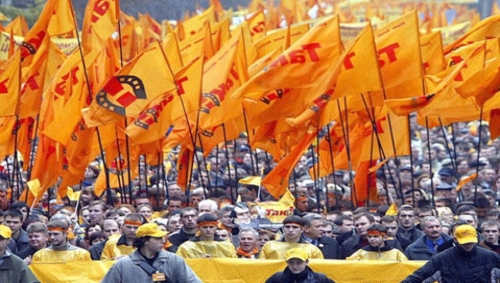
5) Il est encore largement admis que cette guerre est un piège tendu par l'Occident pour user la Russie et provoquer la chute de Poutine. Selon Poutine, l'invasion de l'Ukraine est "une question de vie ou de mort pour la Russie". Il est clair que cette guerre transcende la question ukrainienne. La détérioration progressive des relations entre la Russie et l'Occident aurait conduit Poutine à un tournant géopolitique historique pour la Russie, qui entraînerait une révision complète de la stratégie de la Russie vis-à-vis de l'Asie et la fin de la politique d'intégration modernisatrice de la Russie à l'Occident. Cette rupture définitive entre la Russie et l'Occident ne va-t-elle pas générer, dans un avenir proche, une transformation radicale des équilibres mondiaux, avec la configuration d'un monde multipolaire, avec la fin de l'unilatéralisme américain et la fin de la mondialisation imposée par le modèle économique néo-libéral made in USA, qui sera remplacée par de nombreuses mondialisations de dimensions continentales ?
À mon avis, les États-Unis ont dépensé des ressources considérables depuis au moins 2004 pour transformer l'Ukraine en un couteau pointé du côté de la Fédération de Russie. En témoignent le soutien non dissimulé à la Révolution orange, l'intensification des relations entre certains oligarques très puissants (Viktor Pinčuk in primis) et le clan Clinton, la pénétration progressive de l'OTAN dans l'appareil de sécurité de Kiev, le soutien manifeste aux forces radicales qui ont dirigé le Jevromajdan, le sabotage des faibles et contradictoires tentatives de médiation de l'Allemagne et de la France (emblématisées par le célèbre "Fuck the European Union ! ", prononcée en 2014 par la fonctionnaire du Département d'État Victoria Nuland à l'ambassadeur des États-Unis à Kiev Geoffrey Pyatt), le maintien artificiel de l'État ukrainien par des crédits non remboursables fournis par le FMI (en violation de ses statuts), la fourniture d'armes et de formations aux forces militaires et paramilitaires ukrainiennes. L'objectif stratégique poursuivi par Washington consistait à ouvrir un fossé irrémédiable entre l'Europe et la Fédération de Russie, car dans la logique des "appareils" américains qui ont toujours manœuvré la politique depuis les coulisses, le danger mortel, encore plus grand que celui incarné par l'avancée à grande échelle de la République populaire de Chine, reste la synergie entre les ressources naturelles et la puissance militaire russe d'une part, et la technologie et la puissance industrielle européennes - et particulièrement allemandes - d'autre part. Mais il y a plus. Le "nouveau rideau de fer" qui s'élève des rives de la mer Baltique à celles de la mer Noire pourrait probablement faire office de barrière contre l'initiative chinoise "Belt and Road", qui menace de transformer l'ancien Empire céleste en point d'appui d'un nouvel ordre international fondé sur le dépassement de la phase unipolaire menée par les États-Unis.
6) Actuellement, l'Ukraine est déjà reconnue comme une partie intégrante de l'Europe. Cependant, les protagonistes exclusifs du conflit russo-ukrainien sont les États-Unis et la Russie, l'Europe étant complètement marginalisée. Si l'Ukraine devait rejoindre l'UE, la politique de domination économique de l'Allemagne serait répétée. C'est-à-dire incorporer l'Ukraine dans l'Europe de l'Est en tant que pays subordonné à l'espace économique allemand. L'Ukraine deviendrait un important fournisseur de matières premières et de main-d'œuvre bon marché, ainsi qu'un territoire attrayant pour les délocalisations industrielles. Mais, je me demande si le modèle d'expansionnisme économique allemand, déjà expérimenté en Europe de l'Est, est reproductible aujourd'hui, compte tenu de l'état du conflit interne et externe en Ukraine, destiné à se prolonger également dans l'après-guerre et en considération du changement profond de la stratégie géopolitique globale américaine ? L'Allemagne n'a-t-elle pas pu se hisser au rang de puissance économique mondiale dans le cadre d'un alignement politique et militaire sur l'Alliance atlantique, c'est-à-dire sur l'OTAN, qui s'oppose désormais aux intérêts de l'Allemagne ?
Au cours des premiers mois de 2014, alors que les tensions internes en Ukraine étaient à leur comble, l'attitude de l'Allemagne était pour le moins ambiguë, mais clairement dictée par le désir de tirer le meilleur parti de cette situation extrêmement critique. Plus précisément, l'ambition de Berlin n'était pas seulement de recruter l'Ukraine en tant que fournisseur direct de matières premières pour l'industrie allemande, mais de l'incorporer dans le bloc manufacturier étroitement soudé que l'Allemagne avait méticuleusement construit depuis la réunification. L'objectif, en d'autres termes, était d'intégrer l'Ukraine dans la périphérie fordiste du pôle industriel allemand, qui comprenait déjà la République tchèque, la Slovaquie, la Pologne, la Hongrie et la Roumanie. Sous le prétexte fallacieux d'une pénurie de travailleurs hautement qualifiés dans leur pays, les entreprises manufacturières allemandes voulaient obtenir le feu vert pour étendre à l'Ukraine le phénomène, déjà systématiquement appliqué au reste de l'Europe centrale et orientale, des maquiladoras inversées, en référence aux usines mexicaines où sont assemblés des produits américains à haute valeur ajoutée. Dans ce contexte, l'industrie allemande a gardé son cerveau opérationnel chez elle, transplantant certaines de ses productions phares de l'autre côté de la frontière afin de recomposer cette Europe centrale plus "attractive", pour des raisons culturelles et de proximité géographique, que les usines italiennes, espagnoles et nord-africaines sur lesquelles elle s'était concentrée pendant la guerre froide. L'ambitieux projet expansionniste poursuivi par Berlin s'est soldé par un échec substantiel en raison de l'hostilité non pas tant de la Russie que des États-Unis. En 1990, Berlin avait obtenu de Washington l'autorisation de reconstruire son "arrière-cour" en Europe centrale et orientale - et donc de poursuivre ses propres intérêts économiques - en échange de l'adhésion du pays réunifié au camp occidental, conformément au fameux accord verbal conclu à l'époque par le président Mikhaïl Gorbačëv et le secrétaire d'État James Baker, selon lequel l'Alliance atlantique incorporerait l'Allemagne dans son giron sans s'étendre "d'un pouce" à l'est de l'Elbe. L'accord, dont l'existence a été niée par le secrétaire général de l'OTAN, M. Stoltenberg, mais confirmée à la fois par l'ancien ambassadeur américain à Moscou, M. Jack Matlock, et par un document récemment découvert dans les archives nationales britanniques par l'hebdomadaire "Der Spiegel", a été violé depuis 1997, lorsque la Hongrie, la Pologne et la République tchèque ont rejoint l'Alliance atlantique. Le fait est que, de par ses lourdes implications commerciales et géopolitiques, le modèle mercantiliste allemand est entré dans le collimateur de Washington dès l'administration Obama, avec le fameux - et très instrumental - scandale du Dieselgate et les sanctions imposées à la Deutsche Bank, mais c'est sans doute sous Trump que la véritable escalade a eu lieu. Combinée à l'adoption d'une série de mesures protectionnistes, la redéfinition de l'ALENA selon une logique visant manifestement à frapper les exportations allemandes a infligé un coup dur à l'économie allemande, exposée comme nulle autre aux dynamiques extérieures. La position des États-Unis à l'égard de l'Allemagne n'a pas changé de manière significative, même après l'entrée en fonction de l'administration Biden, comme en témoigne la forte pression économique et politique exercée par les États-Unis pour bloquer la construction du gazoduc Nord Stream-2. Une continuité substantielle, prouvant que le mercantilisme teuton pouvait être toléré comme un "mal nécessaire" à l'époque de la guerre froide, certainement pas dans l'ordre géopolitique actuel tendant vers la multipolarité.
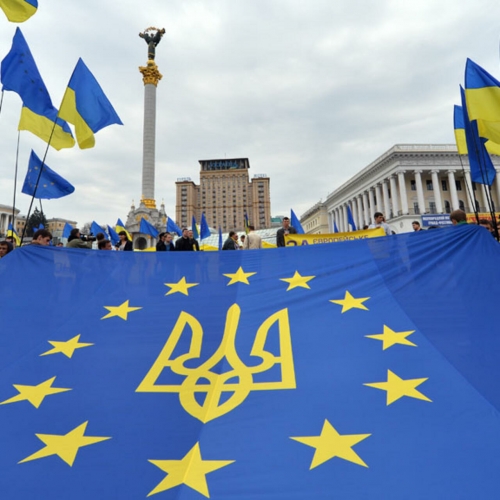
7) Cette guerre pèsera lourdement sur le sort de l'Europe. Incapable de jouer un rôle géopolitique autonome, qui aurait pu éviter cette guerre entre peuples européens, puisqu'une telle stratégie neutraliste aurait impliqué une rupture avec l'OTAN, l'Europe est condamnée à en subir les conséquences économiques et politiques, en tant que zone géopolitique subordonnée aux États-Unis. Surtout, n'y aura-t-il pas un déclassement de la puissance économique allemande, compte tenu de la perte de son importance politique et stratégique en Europe de l'Est, de ses liens énergétiques forts avec la Russie et des perspectives potentielles d'expansion économique dans le commerce avec la Chine ? De plus, avec le réarmement de l'Allemagne dans le contexte atlantique, la perspective d'une transformation de l'Allemagne elle-même, de leader économique incontesté en Europe à puissance géopolitique continentale ayant pour fonction de contenir la Russie en Europe de l'Est et de sauvegarder le leadership américain en Europe, est-elle crédible ?
La dynamique déclenchée par l'attaque russe contre l'Ukraine a entraîné une nette modification des objectifs initiaux poursuivis par les États-Unis à travers leur manipulation de l'Ukraine, qui consistaient essentiellement à séparer l'Europe de la Russie. La guerre et la campagne de sanctions qui a suivi risquent de faire de l'Europe une colonie, y compris économique, des États-Unis, car elles privent le "vieux continent" des approvisionnements à bas prix en matières premières, en énergie et en produits agricoles sur lesquels repose la compétitivité de son industrie, tout en ouvrant le marché européen aux armes, au gaz de schiste et aux produits agricoles américains. Un renversement des relations commerciales transatlantiques traditionnelles se profile à l'horizon, caractérisé par l'accumulation d'excédents commerciaux structurels avec l'Europe, que les États-Unis - pays débiteur par excellence à tous égards - entendent utiliser pour prolonger leur tendance à l'importation massive de marchandises chinoises, malgré le déclin constant du dollar en tant que monnaie de référence internationale. Dans ce contexte, il est illusoire de penser que par le réarmement, l'Allemagne peut se libérer de la relation de vassalité qui la lie aux États-Unis depuis 1945. Surtout dans la situation actuelle où le parti vert ultra-atlantiste - qui doit son succès à la campagne de propagande incarnée par Greta Thunberg, qui a ponctuellement disparu du radar maintenant qu'il est question d'importer du gaz de schiste américain, avec son impact environnemental littéralement dévastateur - exerce une influence décisive sur la politique du gouvernement dirigé par le chancelier Olaf Scholz. Dans la pratique, l'Europe ne peut même pas imaginer un avenir caractérisé par la reconstruction de sa relation avec les États-Unis sur une base non pas tant de parité, mais au moins de subordination moins marquée que ce n'est encore le cas aujourd'hui.
21:04 Publié dans Actualité, Affaires européennes, Entretiens, Géopolitique, Histoire | Lien permanent | Commentaires (0) | Tags : actualité, europe, ukraine, russie, affaires européennes, géopolitique, entretiens, histoire, politique internationale |  |
|  del.icio.us |
del.icio.us |  |
|  Digg |
Digg | ![]() Facebook
Facebook
samedi, 07 mai 2022
Le président du Parlement hongrois : une confrontation géostratégique a lieu en Ukraine
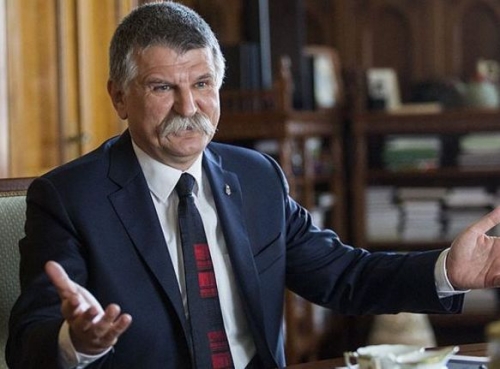
Le président du Parlement hongrois: une confrontation géostratégique a lieu en Ukraine
Source: https://zuerst.de/2022/05/06/ungarischer-parlamentspraesident-in-der-ukraine-findet-eine-geostrategische-konfrontation-statt/
Budapest - Le président du Parlement hongrois, László Kövér, ne mâche pas ses mots. Dans une interview accordée à la chaîne "Inforadio Arena", il a souligné que le conflit actuel en Ukraine ne se résumait pas à un affrontement entre Kiev et Moscou.
"En réalité, la guerre en Ukraine est une guerre russo-américaine, annonciatrice d'une confrontation géostratégique entre les Etats-Unis et la Chine. L'objectif est de "séparer" l'Europe économiquement et politiquement de la Russie et de l'Asie afin d'empêcher la création d'un espace politique et économique unifié de l'Atlantique au Pacifique, a déclaré M. Kövér. L'énorme potentiel économique d'un espace économique aussi vaste entraînerait le risque pour les Etats-Unis de se faire distancer.
Pour la Hongrie, le plus important est de "préserver les acquis des 12 dernières années [depuis l'arrivée au pouvoir de Viktor Orbán, ndlr], notamment la sécurité de l'existence nationale, le soutien aux familles", a-t-il déclaré. C'est pourquoi "beaucoup de choses seront accomplies si nous ne nous joignons pas au chœur des bellicistes, afin de mettre fin à cette guerre avec le moins de victimes possible et le plus rapidement possible", a souligné M. Kövér.
Sur le plan politique, il n'y a jamais eu autant de chaos dans l'UE. Mais rares sont ceux qui osent évoquer ouvertement l'objectif final de Bruxelles: l'élimination des États-nations. Autrefois, le monde et l'Europe étaient dirigés par des personnes qui étaient des hommes politiques talentueux, de grande envergure, et des visionnaires. "Ceux qui dirigent l'Europe aujourd'hui, et le monde occidental, sont des caricatures monstrueuses de cette génération", a-t-il déclaré.
Certains d'entre eux n'ont aucune compréhension des défis à relever, d'autres ont été détournés, achetés, corrompus ou sont des "personnages sans caractère". D'autres encore sont bénéficiaires des élites mondiales, dont le scénario est la soi-disant "fédéralisation" de l'Europe. En résumé, "il y a très peu de gens qui comprennent ce qui se passe, et encore moins qui sont assez courageux pour l'exprimer et s'allier à des personnes partageant les mêmes idées", a résumé Kövér (mü).
Demandez ici un exemplaire gratuit du magazine d'information allemand ZUERST ! ou abonnez-vous ici dès aujourd'hui à la voix des intérêts allemands : https://zuerst.de/abo/ !
Suivez également ZUERST ! sur Telegram : https://t.me/s/deutschesnachrichtenmagazin
22:40 Publié dans Actualité, Affaires européennes | Lien permanent | Commentaires (0) | Tags : lazlo kövér, hongrie, europe, affaireseuropéennes, politique internationale, ukraine |  |
|  del.icio.us |
del.icio.us |  |
|  Digg |
Digg | ![]() Facebook
Facebook
jeudi, 05 mai 2022
La présidence hyperréelle de l'acteur Zelenski - Une vision baudrillardienne
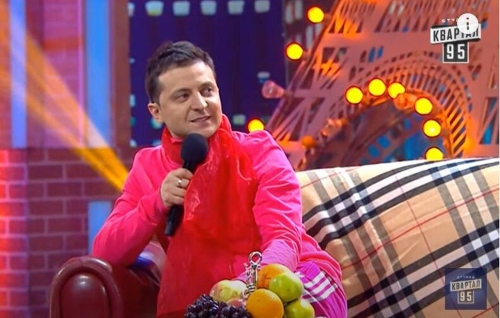
La présidence hyperréelle de l'acteur Zelenski
Une vision baudrillardienne
Source : https://reactionair.nl/artikelen/het-hyperreeele-presidentschap-van-de-acteur-zelenski/
Jean Baudrillard (1929-2007) était un philosophe post-marxiste surtout connu pour son concept d'hyperréalité. Il entend par là que nous avons atteint un stade de l'histoire où la conscience humaine n'est plus capable de distinguer la réalité d'une simulation de celle-ci.
Prenez un pub irlandais, par exemple. Vous y trouverez des choses que vous associez à l'Irlande, comme les trèfles à quatre feuilles, la nourriture irlandaise, la musique irlandaise, les vieux meubles en bois, etc. Mais lorsque vous vous rendez réellement en Irlande, ce concept n'existe pas. Le symbole du pub irlandais représente une réalité inexistante. Avec le temps, un symbole peut devenir plus populaire que ce à quoi il fait référence, car il s'agit d'une exagération qui a plus d'attrait que l'original. Par exemple, les vrais pubs irlandais ne servaient pas de nourriture à l'origine, mais ils le font maintenant, à cause des "pubs irlandais" d'ailleurs.
Baudrillard distingue trois phases dans l'histoire du simulacre, c'est-à-dire de l'imitation. Dans le premier, le symbole représente encore clairement la réalité. Puis, à partir de la révolution industrielle, elle commence à s'effriter. Enfin, dans le monde postmoderne et capitaliste tardif, le symbole précède la réalité. La réalité est désormais façonnée par le monde symbolique. Considérez la célèbre citation d'Oscar Wilde: "La vie imite l'art bien plus que l'art n'imite la vie" (1). Permettez-moi de donner quelques exemples supplémentaires.
Le parc national de Hoge Veluwe. Le Néerlandais moyen y trouvera une scène belle et naturelle, ou du moins une reproduction fidèle de la nature. Mais ce n'est ni l'un ni l'autre. Nous voyons un paysage de bruyère, quelque chose qui n'est apparu qu'au Moyen-Âge par la surexploitation et le surpâturage dans des endroits où il y avait autrefois des forêts. En fait, il faut beaucoup d'efforts humains pour qu'une réserve naturelle ressemble à cela. Les animaux doivent être importés et les arbres abattus. Sans intervention humaine, la forêt repousserait. Une fois de plus, le symbolisme l'emporte sur la réalité. D'autres bons exemples de simulations hyperréalistes sont Disneyland et la pornographie; tous deux imitent une réalité qui est, pour ainsi dire, moins réelle que l'imitation.
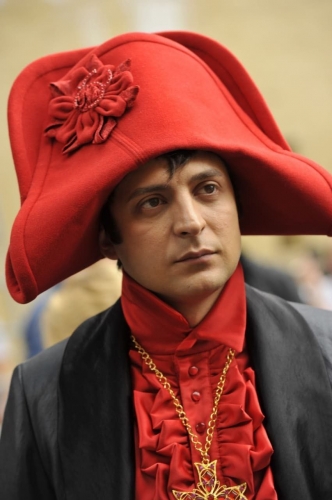
Examinons un autre exemple dans lequel le simulacre a précédé et façonné la réalité: le président ukrainien Vladimir Zelensky. Dans une image, on le voit recevoir un appel téléphonique de l'Union européenne, pour découvrir qu'il était en fait destiné au Monténégro. Mais ce n'est pas réel. C'est là que Zelensky a joué le rôle du président pour une série télévisée comique (2). Cette série était très populaire en Ukraine, ce qui a finalement conduit Zelensky à se présenter aux élections présidentielles et, avec l'aide des mêmes oligarques de l'ombre qui ont stimulé sa carrière d'acteur, à gagner. Encore une fois: la vie imite l'art.
Baudrillard est connu pour avoir affirmé que la première guerre du Golfe n'a pas vraiment eu lieu (3). L'Irak n'avait aucune chance contre l'armée américaine. Ce que Saddam Hussein a fait, c'est sacrifier des soldats afin de maintenir son propre pouvoir. La question suivante se pose donc: quelle est la stratégie de l'Ukraine dans cette guerre? Il me semble qu'il veut provoquer une indignation morale maximale afin d'inciter l'OTAN à intervenir. L'Ukraine ne peut pas gagner une guerre ouverte et symétrique contre la Russie, elle opte donc pour la tactique du Volkssturm. Les civils ont pour instruction de lancer des cocktails Molotov (ou comme ils les appellent eux-mêmes: des Bandera-smoothies), ce qui brouille la ligne entre combattant et non-combattant et explique pourquoi les citoyens de Marioupol n'ont pas été autorisés à fuir sans combattre.
Plus grossier encore, l'armée ukrainienne a tiré sur les troupes russes depuis un réacteur nucléaire à Zaporizhzhia. Cela a provoqué une réponse russe, à laquelle les médias occidentaux ont répondu que le réacteur était en feu - quod non.
De telles choses n'arrivent pas par hasard. C'est une guerre post-moderne. L'objectif est d'entraîner l'OTAN dans la guerre. Les politiciens polonais, tchèques et slovènes se sont également laissés berner par l'acteur Zelensky (entre parenthèses: ce garçon populaire ukrainien et ordinaire est aisé, avec plusieurs villas dans son pays et à l'étranger et des comptes bancaires bien garnis dans des paradis fiscaux) et ont appelé l'OTAN à intervenir.
Il ne s'agit pas d'une guerre ordinaire de pays contre pays. La Russie règne sur le ciel et possède suffisamment d'armes pour raser les villes ukrainiennes. Ils ne font pas cela pour le bien des civils. Les hommes adultes ne sont pas autorisés à quitter le pays et pendant le couvre-feu, tout le monde doit rester à l'intérieur.
La stratégie ukrainienne pour la victoire consiste à gagner la guerre de propagande. L'ensemble de l'Ukraine est devenu une scène sur laquelle le protagoniste Zelensky joue à la guerre dans l'espoir de rallier les puissances étrangères à sa cause. Ce n'est pas pour rien que les figures du showbiz et les produits médiatiques sont richement représentés dans son cabinet. Ce n'est pas pour rien que la profession d'acteur était autrefois considérée comme inférieure à celle d'une prostituée.
Notes:
-
(1) Oscar Wilde, The picture of Dorian Gray.
-
(2) Wikipedia, Servant of the People.
-
(3) Jean Baudrillard, The Gulf War Did Not Take Place.
08:15 Publié dans Actualité | Lien permanent | Commentaires (0) | Tags : volodymir zelensky, ukraine, actualité, hyperréalité, jean baudrillard |  |
|  del.icio.us |
del.icio.us |  |
|  Digg |
Digg | ![]() Facebook
Facebook
Le nationalisme libéral contre les communautés organiques
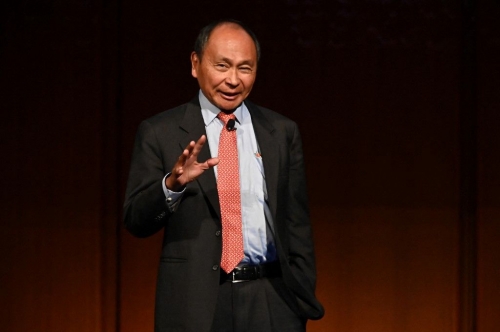
Le nationalisme libéral contre les communautés organiques
Alexander Bovdunov
Source: https://www.geopolitika.ru/pt-br/article/o-nacionalismo-liberal-contra-comunidades-organicas
Qui aurait pu l'imaginer ? Francis Fukuyama s'est récemment fait l'avocat du "nationalisme" et suggère de repousser l'avènement de la société mondiale. Mais s'agissait-il d'une "conversion" ou d'une diversion pour arriver à l'État mondial en empruntant à mi-chemin une route nationaliste?
Le penseur libéral sans originalité qu'est Francis Fukuyama a récemment publié un article dans lequel il appelle les libéraux à abandonner la cause de la création d'une "société mondialisée et à embrasser plutôt le nationalisme" (entendu comme un nationalisme civique) [1].
Bien sûr, il n'est pas surprenant que Fukuyama prône le "nationalisme libéral", puisqu'il affirme depuis 2000 qu'il est nécessaire de soutenir et de cimenter la création de structures modernes ("États-nations") dans le monde entier afin que le libéralisme puisse les utiliser comme un outil pour détruire les restes de communautés et de traditions pré-modernes qui survivent encore. L'article dit en substance: "Nous voulons créer un monde sans États-nations, mais comme cela est encore impossible, il vaut mieux utiliser les États-nations comme moyen d'atteindre cet objectif". Il affirme également que "malheureusement, l'opération militaire spéciale russe en Ukraine montre que nous n'avons pas encore créé un monde post-historique".
Fukuyama est favorable à un nationalisme civique de type jacobin qui détruit toutes les formes de communautés et de solidarités organiques, car "les sociétés libérales ne devraient pas reconnaître officiellement les groupes fondés sur des identités fixes telles que la race, l'ethnie ou la tradition religieuse. Ce n'est que par le "nationalisme" que l'on peut construire des valeurs et des attitudes uniformes compatibles avec le libéralisme. En outre, Fukuyama considère que le fédéralisme renforce les "identités ethniques et religieuses" pré-modernes.
Étrangement, Fukuyama considère l'Ukraine comme un parfait exemple de "nationalisme" libéral, puisque "ses citoyens se sont engagés en faveur de l'indépendance et de l'idéologie libérale et démocratique, faisant clairement savoir qu'ils sont prêts à se battre pour elle jusqu'à leur dernier souffle. Cependant, ils n'ont pas été en mesure de construire un État qu'ils peuvent appeler le leur". Fukuyama considère apparemment que les "droits de l'homme" et la société ouverte de Karl Popper ont pour représentant légitime le "bataillon d'Azov", allant jusqu'à laisser entendre que le nationalisme ukrainien est très similaire à celui épousé par les "pères fondateurs" des États-Unis.
Pourtant, Fukuyama admet que dans les États-nations où il existe des groupes ethniques et religieux hétérogènes, le fédéralisme peut résoudre les conflits des peuples qui "occupent le même territoire depuis des générations et ont leurs propres traditions culturelles et linguistiques", mais "le fédéralisme exige la dévolution du pouvoir à des entités infranationales indépendantes". Toutefois, cette solution a été écartée par l'Ukraine.
08:02 Publié dans Actualité, Affaires européennes | Lien permanent | Commentaires (0) | Tags : nationalisme libéral, libéralisme, francis fukuyama, ukraine |  |
|  del.icio.us |
del.icio.us |  |
|  Digg |
Digg | ![]() Facebook
Facebook
mercredi, 04 mai 2022
Changement "du" système ou changement "dans" le système?
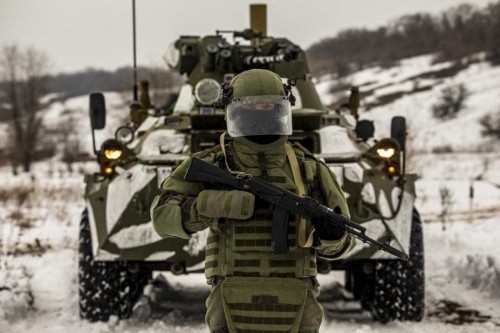
Guerre régionale ou guerre générale?
Irnerio Seminatore
Sources:
Clausewitz et ses enseignements
"Si l'un des deux belligérants est décidé à s'engager sur la voie des grandes décisions par les armes, ses chances de succès sont considérables, pour peu qu'il soit certain que l'autre ne désire pas s'y engager" (Clausewitz). Cette proposition s'applique parfaitement à la Russie et à l'Ukraine. Les deux belligérants y étaient engagés depuis longtemps et leur dialogue, diplomatique et militaire, était soutenu, en sous mains, par des co-belligérants occultes, américains, britanniques, allemands, français, polonais, baltes et autres, qui armaient et entrainaient les Ukrainiens de Zelenski. Ainsi le réveil européen pour la guerre n'a été qu'une "fake news". "La bulle" de la grande hypocrisie occidentale, qu'on avait ignoré. La primauté de la politique n'est point une proposition théorique. L'Occident et la Russie étaient déjà en guerre, mais ils ne le savaient pas encore officiellement, ou ils feignaient plutôt de l'ignorer. Sinistre Illusion ! Les Européens de l'Ouest ont mis dans les armoires de leurs chimères du passé, amnésiques, les livres trompeurs de Kant, Alain, Russell et autres munichois et humanistes.
Par ailleurs les institutions européennes, en antennes éminentes du cartel international de la morphine historique, dont la Commission s'est voulue l'outil "géopolitique”, sont passées à la livraison d'armements pour prolonger le carnage des peuples. Les plus lucides n'ont pas découvert aujourd'hui la guerre ou sa barbarie, mais le visage et la perversion d'eux-mêmes, sous le masque d'un agitateur de théâtre. C'était la violence des Yankees, le cynisme d’Albion, la logique déraisonnable et non rationnelle des Français et l'échine paralysée des Allemands. Tous croupis, au fond d'eux-mêmes, par la peur et par le manque de lucidité et de courage. Paix et Guerre, une intimité antique !
Révisons ensemble la dialectique de l'antagonisme historique et considérons les issues possibles de chaque type de paix et de chaque type de guerre. Une lecture qui sera conduite à la lumière de la politique étrangère, comportant l'unité du verbe diplomatique et de l'action militaire, unité qui, au sein de l'alliance atlantique, exclut la solidarité totale de tous les alliés. Or, puisque la subordination de la guerre à la politique dépend d'un ensemble d'intérêts, de facteurs et de circonstances, laquelle des politiques pratiquées les Européens suivront-ils, en calquant le chemin de Zelenski, de la Commission européenne et de l'Alliance Atlantique ? Pour quels enjeux et jusqu’où ? Clausewitz nous en rappelle les issues possibles: "Si la politique est grandiose et puissante, la guerre le sera aussi et pourra même atteindre les sommets, où elle prend sa forme absolue". Or l'inégalité des buts de guerre et l'inégalité de force et de résolution, subordonnera la montée aux extrêmes de la guerre à la réaction de l'autre et cela suite au principe de polarité.
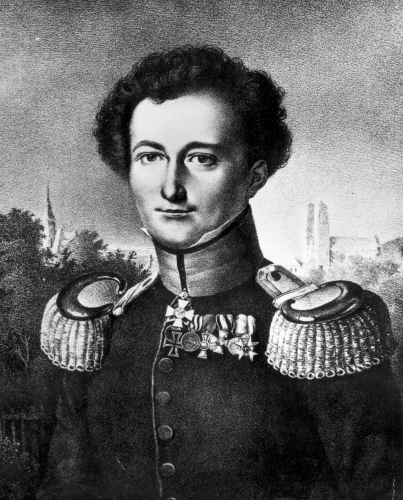
La Macht-Welt-Politik et ses revers
Si nous assumons le principe que le "type de paix" souhaitée détermine en large partie le "type de guerre" à mener, dans le but de parvenir à une "paix de satisfaction", une classification ternaire des paix (d'équilibre, d'hégémonie ou d'empire), nous indique que la violence des conflits est imputable à la géométrie des rapports de force. C'est la grandeur des enjeux qui accroit la détermination politique et l'ardeur des combats. Dans le cas du conflit ukrainien l'enjeu pour les deux parties c'est le passage d'une configuration du système international à un autre (bipolaire à multipolaire). Cela signifie pour l'Ukraine sa disparition en tant qu'Etat de la scène inter-étatique et son passage d'une zone impériale (atlantique) à une autre (russe).
Pour la Russie l'enjeu existentiel, serait, en cas d'échec, un déclassement de puissance à long terme et un tremblement géopolitique inacceptable, interne et extérieur, qui serait tectonique et fatale pour l'Europe, la Russie et l'Eurasie. Par son étendue il concernerait une turbulence élargie à l'ensemble des relations systémiques, multipolaires, intercontinentales et inter-étatiques. Dans la perception de la Russie et des autres acteurs de la communauté internationale le glissement inévitable de la guerre vers un conflit d'ampleur, amènerait à la restauration d'une zone impériale, qui rivaliserait avec la puissance hégémonique déclinante. Dans cette hypothèse une guerre de grande ampleur serait inévitable car elle mettrait en cause le pivot dominant du système (les Etats-Unis), les poussant prématurément à agir.
La signification historique et systémique de la crise Ukrainienne
Entrer dans la crise ukrainienne ou s'y laisser entraîner revêt une signification plus générale et plus abstraite. En effet il s'agit d'une "crise d'équilibres" régionale qui déplace le centre de gravité du système, la fameuse "Balance of Power" vers l'Est et montre la vanité de la résistance d'une zone de jonction géopolitique (l'Ukraine de Zelenski), rendant évidente l'incapacité des Etats européens de l'Ouest à influer sur les autres et tous ensemble sur la Russie. Celle-ci, contrairement à l'Ouest du continent doit son existence et sa sécurité à elle-même, tandis que les Etats européens, derrière l'encadrement de l'alliance atlantique doivent leur existence et leur sécurité à un acteur extérieur au continent, l'Amérique.
C'est l'Amérique qui choisit son ennemi principal, son théâtre décisif et le centre de gravité de son empire futur, ailleurs (Asie- Pacifique), que dans une zone d'influence disputée. Gagner ici (théâtre régional européen), c'est perdre dans l'Indo-Pacifique (théâtre systémique), au profit de la puissance chinoise. Or la "Paix d'équilibre" qui conviendrait à l'Europe, dictée par "the anxiety with to the the balance of power is apparent..(David Hume) et se situe entre la puissance extérieure dominante (Etats-Unis) et la puissance extérieure révisionniste (Fédération de Russie).
Selon David Hume et selon "le common sens and obvious reasoning", jamais un Etat (en l'espèce la Russie? ou la Novorossyia? ou un nouvel Empire?), ne doit posséder des forces telles que les Etats voisins soient incapables de défendre leurs droits et leurs libertés contre lui (argument invoqué par la Pologne, les pays baltes, la Finlande et la Suède). Cet argument est à l'image du cas de l'empire romain, qui fut capable de soumettre l'un après l'autre ses adversaires et ses ennemis, avant qu'ils fussent en mesure de préserver les alliances qui auraient dû préserver leur indépendance. Cependant, puisque dans les relations internationales la réussite des grandes épreuves est fondée sur la légitimité, bien qu'hétérogène et sur les rapports de force, bien que variables, il est à supposer que l'unité des Etats européens de l'Ouest se réalisera davantage par la coordination des pays qui disposent d'un vrai noyau de force (France et Allemagne) et qui, par la perte de légitimité de l'Union, fera de celle-ci une expérience marginale, non prioritaire et non décisive du processus de rapprochement des Etats du continent. En réalité l'hétérogénéité du principe de légitimité de l'Union (cas de la Pologne et de la Hongrie) est à la base de sa fissuration politique et l’asymétrie de son "noyau dur", est à la base de sa différente conception de la souveraineté et de sa géopolitique mondiale, dont la crise ukrainienne est l'une des manifestations.
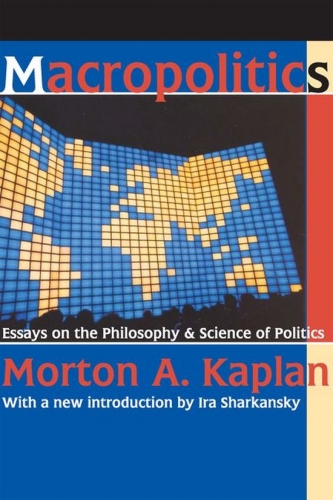
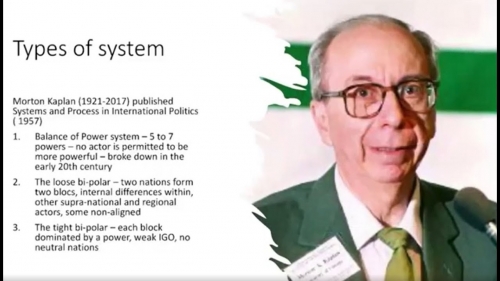
David Hume, Morton Kaplan et la théorie de l'équilibre
Que la politique de l'équilibre continental ou son statu-quo antérieur au conflit, plus favorable au camp de l'alliance atlantique, serve à préserver le système et justifie les puissances insulaires (Grand Bretagne et Etats-Unis), dans leur rôle de pourvoyeuses d'armements, est apparu immédiatement, comme l'un des objectifs de la coalition des puissances globalistes et de leur intervention indirecte, limitée et tardive. De ce point de vue il faut empêcher à tout prix l'unification des terres slaves par la Russie, -ont elles pensé- après l'élimination historique de l'Allemagne avec la IIème guerre mondiale, comme acteur principal du continent et porteur de la possibilité d'une soudure de la terre centrale (le Heartland) en fonction anti-hégémonique. La Russie sait pertinemment qu'elle est tenue pour un Etat perturbateur, soupçonné de vouloir reconstituer un ensemble politique impérial et dominateur dans son pourtour d’Etats indépendants.
Dans de pareilles conditions, après l'effondrement de l'Union soviétique elle s'attend à être tenue comme une menace pour l'hégémonie et, par les Etats-Unis, comme la réémergence d'un rival. Or, si en fonction du "système européen" du XIXème David Hume avait défini la formule la plus simple de l'équilibre, analysant en particulier la rivalité de la France et de l'Allemagne, la politique de " l'équilibre multipolaire" du XXIème, définie de façon générale comme "Balance of Power" a été formulée dans les années cinquante par Morton Kaplan, qui repère six règles abstraites, auxquelles doivent s'attendre les unités politiques si un Etat aspire à l'Hégémonie en perturbateur du système, suscitant l'hostilité de tous les Etats conservateurs. C'est exactement ce qui arrive à la Russie aujourd'hui, qui a pris l'initiative des hostilités, dans l'acharnement des sanctions économiques et financières et dans la tentative d'isolement international et d'affaiblissement politique et militaire, dont témoigne l'envoi d'armements lourds à l'Ukraine de Zelenski.
"Paix d'équilibre" ou "paix d'empire" ? Changement "du" système, ou changement "dans" le système ?
"Entre la "paix d'équilibre" et la "paix d'empire", s'intercale "la paix d'hégémonie" dit Raymond Aron, mais, il ajoute, "l'hégémonie est une modalité précaire de l'équilibre", assurée par une volonté marquée d'indépendance, car les amitiés et les inimitiés sont historiquement temporaires. La "paix d'équilibre" de l'Europe du XIXème avait un caractère conjoncturel et se limitait à la "prépondérance" de l'Allemagne de Bismarck, que la Grande Bretagne empêchera de se transformer en hégémonie continentale. Aujourd'hui, en cas de victoire de la Russie poutinienne, les occidentaux pourront-ils l'empêcher de devenir une puissance hégémonique à l'échelle multipolaire et globale (Russie, Chine, Inde, Iran, tiers non engagés), de puissance prépondérante qu'elle était à l'échelle continentale (Europe orientale et sud orientale) ?
Cette perspective historique est rendue plausible par le fait que le modèle "parfait" de guerre, selon la typologie classique, est la "guerre inter-étatique" ou nationale, qui met aux prises des unités politiques de même nature et de même zone de civilisation, dans le but de préserver l'existence du pays, tandis que les "guerres impériales" visent l'élimination d'un belligérant et la constitution d'une unité politique supérieure, composée de plusieurs unités hétérogènes.
La guerre qui caractérise l'issue entreprise par la Russie, serait pour ses adversaires le début d'une entreprise sans fin, une confrontation imparfaite et hétérogène qui met aux prises des relations inter-étatiques, trans-nationales et sociétales, qu'il faut stopper au plus vite et par tous les moyens. Il s'agirait d'un type de conflit qui ne peut donner lieu à une "paix de satisfaction", mais à des conflits prolongés, à des armistices précaires et belliqueux, asymétriques, terroristes et hybrides, dus à la coexistence d'intérêts contradictoires, dépourvus d'une perspective commune. Bien que né de la revendication d'un principe de légitimité, le principe de souveraineté étatique, revendiqué par l'Ukraine cet amalgame d'intérêts attisera des rivalités perpétuellement renaissantes surtout en Europe et conduirait qu'à une paix belliqueuse et, plus probablement, à un guerre civile permanente.
Dans le cas de la crise ukrainienne, dirigée de l'extérieur par les Etats-Unis et en subordre, par les Européens, le but de guerre et l'issue finale, changeront-ils "le" système international ou bien produiront-ils une modification des rapports de force "dans" le système ? On pourrait opiner avec Joe Biden que la "bonne" hypothèse est dans la première réponse et donc dans l'option d'une guerre limitée et dans la préservation de l'hégémonie américaine et avec Vladimir Poutine dans la deuxième, autrement dit dans le double désir de sécurité et de gloire (ou de prestige), car changeraient alors les deux éléments qui commandent à tout système international, le rapport de force, qui deviendrait plus favorable aux puissances de la terre (Russie, Chine, Inde, Iran, non-Alignés) et le principe de légitimité (oligarchique, autocratique ou despotique), renversant le cours de l'histoire, qui est allée jusqu'ici de l'Occident vers l'Orient.
Bruxelles le 23 avril 2022
20:31 Publié dans Actualité, Affaires européennes | Lien permanent | Commentaires (0) | Tags : politique internationale, actualité, relations internationales, ukraine, russie, europe, affaires européennes |  |
|  del.icio.us |
del.icio.us |  |
|  Digg |
Digg | ![]() Facebook
Facebook
mardi, 03 mai 2022
Soulèvement des généraux italiens: "Ce n'est pas notre guerre, arrêtons de suivre les États-Unis!"
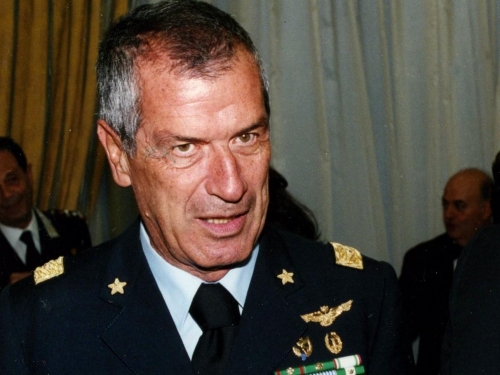
Soulèvement des généraux italiens: "Ce n'est pas notre guerre, arrêtons de suivre les États-Unis!"
Source: https://unser-mitteleuropa.com/aufstand-italienischer-generaele-das-ist-nicht-unser-krieg-stoppen-wir-die-usa/
Le général Leonardo Tricarico (photo, ci-dessus), ancien chef d'état-major de l'armée de l'air italienne et actuel président de la fondation ICSA, a déclaré à propos du conflit en Ukraine:
"La neutralité ? Je suis tout à fait d'accord avec cela. Et je pense qu'avant de mettre à exécution les menaces d'extension du conflit à l'OTAN de part et d'autre, nous devons faire en sorte que ce conflit se termine. Et de ce point de vue, je ne vois personne qui s'engage, au contraire, je vois toute une série de pyromanes qui font exactement le contraire".
Il a ajouté :
"Tout d'abord, notre pays devrait tout faire, et je ne vois pas qu'il le fait, pour que le conflit puisse se terminer. Quand je dis "tout faire", je veux dire que nous devons nous mettre d'accord avec d'autres pays européens, notamment la France et l'Allemagne, sur une position commune vis-à-vis des pays belligérants menés par les États-Unis, pour qu'ils cessent leurs manoeuvres, pour qu'ils favorisent un cessez-le-feu et des négociations, même au risque de perturber nos relations avec les États-Unis".
En accord avec Alessandro Orsini, directeur de l'Observatoire de la sécurité internationale de l'Université de Luiss :
"Et si l'article 5 du traité de l'Atlantique est déclenché, selon lequel la solidarité atlantique est activée, il sera alors possible de discuter du maintien des concepts fondateurs de l'OTAN, qui prévoient en tout le volontariat, et à ce moment-là, l'Italie pourra dire si elle veut se positionner en soutien ou rester à la fenêtre". - a conclu Tricarico - et elle pourra le faire après un large débat au niveau de l'opinion publique et institutionnelle. Ce n'est pas une décision simple que l'on prend instinctivement.
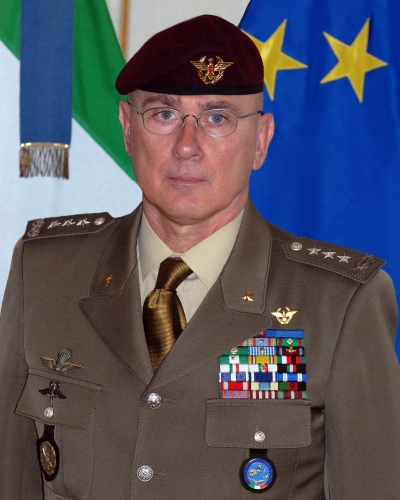
"C'est un conflit dont nous devons essayer de nous tenir à l'écart le plus longtemps possible", a déclaré Marco Bertolini, lieutenant général de l'armée italienne à la retraite et désormais à la tête du département de défense de Fratelli d'Italia:
"La guerre a commencé avec l'intervention de la Russie, qui ne fait pas partie de l'OTAN, en Ukraine, qui ne fait pas davantage partie de l'OTAN: c'est un affrontement entre deux pays européens qui n'ont rien à voir avec l'OTAN et rien à voir avec l'Italie. Je ne pense pas que nous puissions discuter de neutralité ou d'autre chose".
Orsini avait déclaré que l'Italie devrait rester neutre si la Russie attaquait un pays de l'OTAN:
"Si un pays membre de l'OTAN est concerné, il ne fait aucun doute que l'article 5, qui prévoit l'intervention de l'Alliance atlantique, doit être appliqué", avait répondu Bertolini.
"Mais", a ajouté le lieutenant-général iR, "jusqu'à présent, la Russie n'a pas frappé un pays de l'OTAN, puisque l'Ukraine n'est pas membre de l'Alliance, et même l'évocation d'une telle possibilité ne fait qu'envenimer les esprits et réduire les possibilités de réconciliation, que je considère comme indispensables. Je répète : "indispensables".
Quant à la question de savoir si la guerre menée ces derniers mois est une guerre juste ou injuste, le raisonnement de Bertolini est indiscutable :
"Dans le milieu catholique, il y a toujours eu un débat pour savoir si une guerre est juste ou non. Beaucoup de théologiens en ont discuté, Saint Augustin, Saint Thomas d'Aquin, et ont dit quels étaient les critères d'une guerre juste ou injuste. - se souvient le lieutenant-général qui commandait les forces spéciales. - Je pense que pour qu'une guerre soit considérée comme juste, elle doit avant tout être "notre" guerre. Et celle-ci ne l'est pas".
Source : VoxNews
19:35 Publié dans Actualité, Affaires européennes | Lien permanent | Commentaires (1) | Tags : italie, marco bertolini, leonardo tricarico, europe, ukraine, affaires européennes |  |
|  del.icio.us |
del.icio.us |  |
|  Digg |
Digg | ![]() Facebook
Facebook
La Pologne est déjà en guerre. Elle vise à annexer Lviv
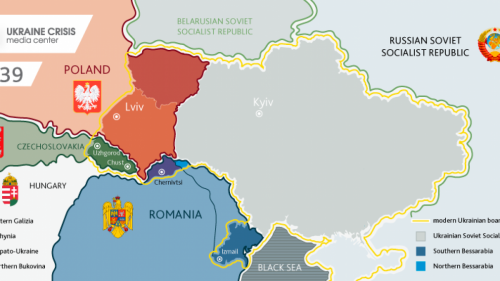
La Pologne est déjà en guerre. Elle vise à annexer Lviv
Maurizio Blondet
Source: https://www.maurizioblondet.it/polonia-gia-in-guerra-mira-ad-annettersi-leopoli/
"La Pologne a livré 200 chars T-72 à l'Ukraine pour l'équipement de deux brigades blindées". Polskie Radio rapporte.
Le gouvernement polonais vient de promulguer une loi "pour la défense de la patrie", entrée en vigueur le 23 avril de cette année, qui rétablit le service militaire obligatoire pour tous, y compris les femmes. En fait, il est écrit :
Art. 5. 1. les citoyens polonais sont tenus d'effectuer un service militaire dans le cadre spécifié par cette loi à partir du jour où ils ont 18 ans jusqu'à la fin de l'année civile au cours de laquelle ils ont 55 ans, et ceux ayant le grade de sous-officier ou d'officier - 63 ans.
- L'obligation d'effectuer le service militaire ne s'applique pas aux personnes visées au paragraphe 1 qui ont été déclarées définitivement inaptes à ce service en raison de leur état de santé.
- L'obligation d'effectuer le service militaire ne s'applique pas aux femmes enceintes et aux femmes dans la période de 6 mois après l'accouchement."
Le premier ministre, le banquier Mateusz Morawiecki, ancien président du groupe bancaire Santander, qui a été hissé au pouvoir (comme Draghi) sans même être membre du parti PiS au pouvoir, a mis en place une censure paramilitaire contre toutes les voix dissidentes, avec des perquisitions de contre-espionnage et des intimidations sans précédent. Les Polonais à la tête froide sont réduits au silence. Le gouvernement a également tenu ses citoyens dans l'ignorance du traité d'alliance qu'il a signé avec la Grande-Bretagne et le régime de Kiev. On en sait encore moins sur les termes et les motivations de cette alliance tripartite, qui s'est probablement formée dès 2014, après le coup d'État à Kiev.
Entre-temps, la planification d'un vaste "exercice" polonais en mai semble avoir été confirmée.
Tous ces éléments confirment la récente déclaration du chef du Service de renseignement extérieur (SVR), Naryshkin :
"Washington et Varsovie travaillent sur des plans visant à établir un contrôle militaire et politique étroit de la Pologne sur ses possessions historiques en Ukraine". Par possessions historiques polonaises, on entend essentiellement la ville de Lviv et sa région environnante, sur laquelle la Pologne a régné plusieurs fois dans le passé, la dernière fois entre les deux guerres mondiales".
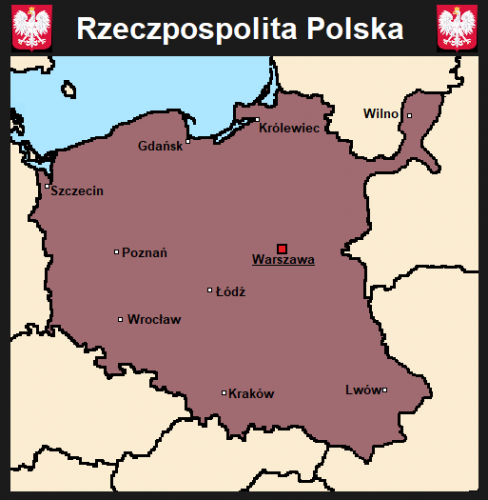
Le SVR a donné quelques détails sur le complot que les Américains auraient conçu avec Varsovie: "Les États-Unis ont un plan avec la Pologne selon lequel les forces polonaises de 'maintien de la paix', initialement sans mandat de l'OTAN, entreraient dans des parties de l'Ukraine occidentale où les chances d'un affrontement avec les forces russes sont faibles".
La Russie signale depuis plusieurs jours que le conflit pourrait se terminer par une partition forcée de l'Ukraine.
Le régime polonais a démenti: "Désinformation diffusée par Moscou. Les mensonges sur les prétendus plans de la Pologne pour attaquer l'Ukraine occidentale se répètent depuis plusieurs années", a déclaré Stanislaw Zaryn, porte-parole du coordinateur des services spéciaux polonais.
Les objectifs nostalgiques de la Pologne ultra-nationaliste de Lviv sont également bien connus. Le démenti du complot est d'autant plus nécessaire que si Varsovie a effectivement obtenu la permission de Washington de l'annexer, cela donne paradoxalement raison à la Russie: l'Ukraine serait alors une pure expression géographique dont les frontières ne sont pas intangibles et sacrées, mais sujettes à changement et à partition. La libération par les Russes du Donbass et de Lugansk, où vivent des millions de russophones, est donc parfaitement justifiée.
Dans une implication de plus en plus directe et ostensible de Londres dans l'escalade de la guerre, voici la nouvelle que 8000 soldats britanniques seront envoyés en Europe de l'Est pour participer à des exercices militaires destinés à combattre l'agression russe.
Le déploiement - qui est l'un des plus importants depuis la guerre froide - verra des troupes placées dans des pays allant de la Finlande à la Macédoine du Nord, et bien sûr, en Pologne.
Des dizaines de chars et plus de 100 véhicules de combat blindés seront envoyés sur place cet été, selon des plans qui ont été renforcés depuis le début de la guerre en Ukraine."
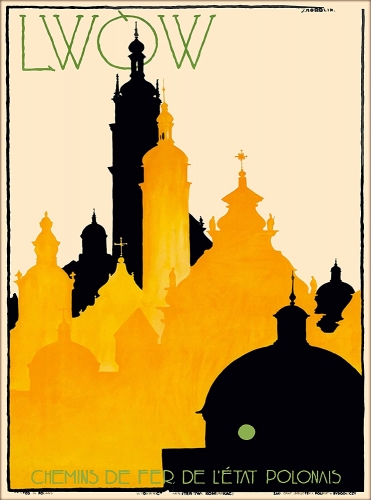
Pour plus d'exhaustivité et de lucidité, lisez l'article de Buffagni :
Comment se déroulera la phase 3 des hostilités en Ukraine?
par Roberto Buffagni
Compte tenu du succès probable de la prochaine offensive russe et de la neutralisation consécutive des forces armées ukrainiennes, les Britanniques, qui jouent un rôle de premier plan dans la gestion des hostilités, préparent la phase trois de la guerre : une fois les Ukrainiens hors jeu, laissons les Polonais et les Baltes entrer en campagne.
La phase trois de la guerre en Ukraine entre la Russie, les États-Unis et l'OTAN se déroulerait comme suit.
- L'offensive suivante, dans laquelle la Russie utilise sa puissance de feu supérieure, neutralise le gros des forces armées ukrainiennes désormais fortifiées dans le Donbass. L'Ukraine n'est plus en mesure de résister efficacement. Fin de la deuxième phase des hostilités.
- Début de la phase 3. À la demande du gouvernement ukrainien (peut-être un réfugié en exil) aux gouvernements polonais et baltes pour une aide militaire, des troupes régulières polonaises et baltes et un contingent de faux et vrais mercenaires entrent en Ukraine. Les vrais mercenaires sont fournis par des sociétés qui fournissent des ce type de combattants. Les faux mercenaires sont des soldats des pays de l'OTAN qui démissionnent de leurs propres armées afin de ne pas impliquer légalement leurs pays en tant que belligérants, et partent au combat sans insigne. Un contingent est déjà rassemblé en Pologne, qui, d'après ce que j'ai compris, compte déjà environ 120.000 hommes. Une aide financière et matérielle substantielle afflue en Pologne en provenance des États-Unis et de l'OTAN.
- Le contingent polono-balte combat les Russes en Ukraine. Les Russes peuvent riposter sur le territoire ukrainien, mais ils ne peuvent pas frapper les centres de commandement et de logistique du contingent, qui sont situés en Pologne et dans les pays baltes, afin de ne pas entrer dans un conflit direct avec l'OTAN.
- Les hostilités en Ukraine entre les États-Unis, l'OTAN et la Russie, opposant les forces polonaises et baltes aux armées russes, deviendraient ainsi interminables, car l'afflux de troupes en Ukraine pourrait se poursuivre pendant des années, et la Russie ne pourrait pas frapper à la source sans entrer en conflit direct avec l'OTAN dans son ensemble.
- L'objectif de la phase trois des hostilités serait le suivant: ouvrir une plaie permanente dans le flanc de la Russie + l'isoler politiquement + l'épuiser économiquement avec le coût des hostilités ajouté aux sanctions. En bref: saigner à blanc la Russie en vue de sa désintégration politique.
19:24 Publié dans Actualité, Affaires européennes | Lien permanent | Commentaires (0) | Tags : actualité, lvov, lviv, lemberg, pologne, europe, ukraine, affaires européennes |  |
|  del.icio.us |
del.icio.us |  |
|  Digg |
Digg | ![]() Facebook
Facebook
lundi, 02 mai 2022
Les dangers d'une guerre par procuration entre les États-Unis et la Russie
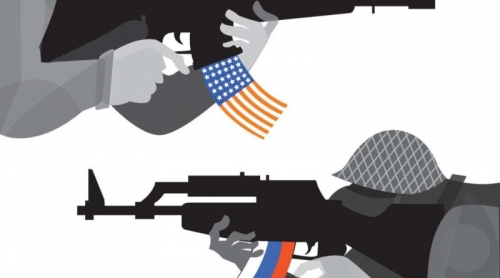
Les dangers d'une guerre par procuration entre les États-Unis et la Russie
Markku Siira
Source: https://markkusiira.com/2022/04/28/yhdysvaltojen-ja-venajan-sijaissodan-vaarat/
À stade où nous en sommes, il est probablement clair pour beaucoup d'observateurs que les États-Unis et la Russie mènent une guerre par procuration en Ukraine, tout comme ils l'ont fait en Syrie. C'est une façon de faire le tri dans les relations enflammées et les futures politiques de pouvoir dans le nouvel ordre post-libéral.
Alors que tout ceci n'est peut-être rien de plus qu'un sinistre théâtre du capitalisme destructeur scénarisé par les banquiers centraux, sans aucun égard pour les dommages collatéraux et les vies humaines, un autre point de vue est soulevé par les analystes classiques qui appellent à une "gouvernance responsable".
"Des déclarations récentes suggèrent que l'administration Biden est de plus en plus déterminée à utiliser le conflit en Ukraine pour mener une guerre contre la Russie visant à affaiblir, voire à détruire l'État russe", écrit l'analyste et historien britannique Anatol Lieven.
L'administration "kaganiste" de Biden semble prête à adopter une stratégie que les administrations américaines de la guerre froide se sont efforcées d'éviter. Le soutien à la guerre en Europe pourrait dégénérer en une confrontation militaire directe entre la Russie et l'OTAN.
Lieven estime que si l'affaire ukrainienne suscite bel et bien un sentiment anti-guerre critique chez les Russes, "la guerre contre les tentatives américaines d'endommager et d'assujettir la Russie séduira beaucoup plus fortement le public".
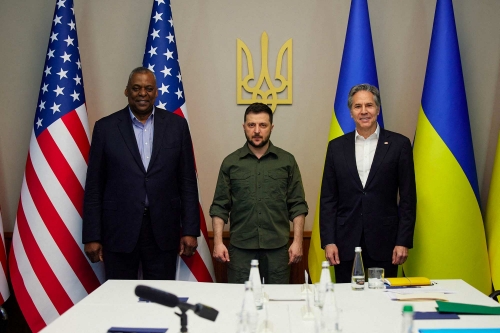
Lors de sa visite à Kiev, le secrétaire américain à la défense, Lloyd Austin, a ouvertement déclaré que les États-Unis souhaitaient voir "la Russie affaiblie au point qu'elle ne puisse plus faire les choses qu'elle a faites en Ukraine".
Le même jour, le ministre russe des Affaires étrangères, Sergueï Lavrov, a déclaré à la télévision russe qu'en fournissant des armes lourdes à l'Ukraine, l'OTAN est déjà "fondamentalement" engagée dans une guerre par procuration contre la Russie.
Beaucoup ont comparé la situation à la crise des missiles cubains. Selon Lieven, "les gens ont oublié à quel point nous sommes passés près de la destruction nucléaire à l'automne 1962". On dit qu'"à un moment donné, le sort du monde a dépendu de la sagesse et de la prudence d'un seul officier de la marine soviétique, Vasily Arhipov, à bord d'un sous-marin nucléaire".
Affaiblir la Russie n'est pas "nécessaire", sauf pour renforcer la propre position des États-Unis. Selon Lieven, "rien n'indique que la Russie veuille ou même puisse attaquer d'autres pays". Selon lui, l'armée russe n'est pas en état d'attaquer les pays de l'OTAN.
Quant à la Géorgie, la Moldavie et le Belarus, la Russie dispose déjà des "positions nécessaires" dans ces pays. Mais lorsqu'il s'agit de combattre les mouvements extrémistes islamistes en Asie centrale et ailleurs, "les intérêts de la Russie et de l'Occident sont en fait alignés", convient Lieven.
Les États-Unis semblent toujours croire que l'Ukraine peut miraculeusement "gagner" la guerre contre la Russie avec le bon équipement et le soutien occidental. Dans ce contexte, Lieven se demande ce que signifie réellement cette "victoire".
L'Ukraine ne peut pas facilement reconquérir tout le territoire qu'elle a perdu au profit de la Russie et des séparatistes pro-russes du Donbass depuis 2014, même avec l'aide de l'Occident. Cela ne serait qu'une "recette pour une guerre continue et des pertes et souffrances massives pour les Ukrainiens".
Même après l'administration de Poutine, aucun futur gouvernement russe ne pourrait accepter d'abandonner, par exemple, la Crimée, que la plupart des Russes considèrent comme un "territoire national" de la fédération. Ainsi, la seule façon de "gagner" le conflit actuel du point de vue des Américains et des Ukrainiens serait de détruire l'État russe.
L'effondrement de la Russie est prédit depuis des décennies, mais le conflit en Ukraine et la politique de sanctions ont peu de chances de le provoquer. Il convient également de rappeler que si la Chine a jusqu'à présent été réticente à soutenir la Russie en Ukraine, Pékin ne peut tolérer une stratégie américaine consistant à renverser le régime russe pour ensuite isoler la Chine.
Un état de guerre ne peut se terminer que par la défaite d'une des parties ou par une paix négociée. Si Moscou propose un cessez-le-feu comme base des pourparlers de paix après la libération du Donbass, les Occidentaux seront confrontés à un choix : accepteront-ils cette proposition ou continueront-ils à inciter l'Ukraine à riposter et à l'armer?
Lieven se demande à juste titre "combien de temps la Russie accepterait une telle stratégie occidentale avant de décider d'envenimer la situation et d'essayer d'intimider les Européens en particulier pour qu'ils se détachent de l'Amérique et recherchent un accord de paix".
Compte tenu de la dégradation de la situation économique, qui ne fera qu'accroître la polarisation entre les citoyens et les détenteurs du pouvoir, dans quelle mesure l'"unité de l'Occident", telle que vantée dans les médias, sera-t-elle maintenue dans ces circonstances? Par exemple, l'impopulaire président français Macron, qui s'est vu accorder un délai supplémentaire, devrait remercier sa bonne étoile d'avoir été bombardé de tomates il y a quelques jours seulement.
Les pays les plus arrogants de l'UE seront sans doute encore durement touchés. Les robinets de gaz russe ont maintenant été fermés à la Pologne et à la Bulgarie. Pendant ce temps, de nombreuses entreprises européennes et même certains pays commercent en roubles avec la Russie. À cet égard, le front commun États-Unis-UE a déjà commencé à se fissurer, bien que l'Occident puisse avoir d'autres plans pour affaiblir l'économie russe.
Lieven compare comment "pendant la guerre froide, aucun président américain n'a oublié que Washington et Moscou avaient la capacité de détruire la civilisation et de mettre fin à l'existence de l'humanité". La dissuasion nucléaire était suffisante pour maintenir l'équilibre dans un environnement autrement instable.
Les dirigeants d'aujourd'hui devraient également se rappeler que "lorsque les deux parties se sont engagées dans des guerres par procuration en dehors de l'Europe, les conséquences ont été désastreuses pour elles-mêmes et encore plus pour les peuples qui sont devenus les pions de ces superpuissances". Lieven demande : "N'avons-nous vraiment rien appris de l'histoire ?"
21:24 Publié dans Actualité, Affaires européennes | Lien permanent | Commentaires (0) | Tags : états-unis, otan, russie, ukraine, politique internationale, europe, affaires européennes |  |
|  del.icio.us |
del.icio.us |  |
|  Digg |
Digg | ![]() Facebook
Facebook
Vers une finlandisation de l'Ukraine?
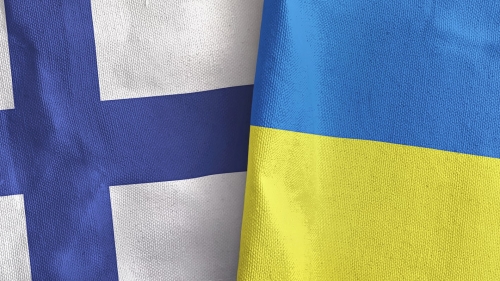
Vers une finlandisation de l'Ukraine?
Erich Körner-Lakatos
Source: https://zurzeit.at/index.php/kommt-es-zur-finnlandisierung-der-ukraine/
Neutralité et renonciation à l'adhésion à l'OTAN : une alternative envisageable
Au vu de la situation en Ukraine, il est question ces derniers jours que le pays situé sur les rives du Dniepr pourrait à l'avenir renoncer à adhérer à l'OTAN et devenir un Etat durablement neutre. Des signes en ce sens sont même apparus dans la bouche du président Volodymyr Selenski (soit dit en passant, le prénom Volodymyr correspond à Vladimir; Zelenski et son adversaire Poutine partagent donc au moins le même prénom). Avant cela, Emmanuel Macron avait déjà évoqué le terme de finlandisation, car la Finlande et l'Ukraine sont tout à fait comparables d'un point de vue géographique: tous deux ont une longue frontière avec leur voisin oriental, la Russie, qui est militairement surpuissante.
En d'autres termes, la finlandisation signifie que le petit voisin ne peut affirmer son indépendance limitée que si sa neutralité présente une caractéristique particulière, à savoir un déséquilibre en faveur de la Russie. Un autre parallèle saute aux yeux: la Finlande et l'Ukraine ont longtemps fait partie de la Russie tsariste, l'Ukraine même après, pendant la période de domination communiste. Les deux pays n'ont pu obtenir leur indépendance étatique que pendant une période de faiblesse de la Russie.
Pour comprendre ce que signifie la finlandisation pour la future Ukraine, il est nécessaire de se pencher sur l'histoire de la Finlande pendant la période où cette forme particulière de neutralité a existé.
Comme on le sait, la Finlande faisait partie de la sphère d'intérêt soviétique en vertu du protocole additionnel secret au pacte Molotov-Ribbentrop d'août 1939. C'est pourquoi les troupes soviétiques ont envahi les trois États baltes, l'Estonie, la Lettonie et la Lituanie, sans rencontrer de résistance. Il en alla autrement en Finlande: pendant la guerre dite d'hiver en 1939/40, l'armée finlandaise, relativement petite, remporta des succès défensifs et mit à mal l'Armée rouge, affaiblie par les purges de Staline. Ce n'est qu'au bout de six mois que la supériorité de Moscou se fit sentir et qu'Helsinki dut demander un armistice et subir des pertes territoriales, tout en étant épargnée par l'occupation.
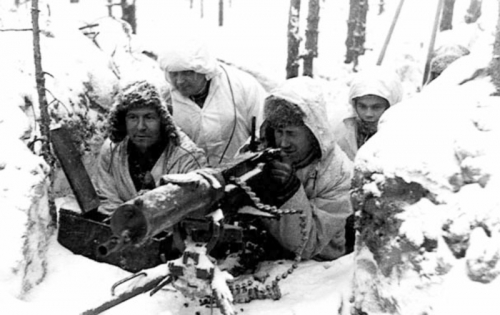
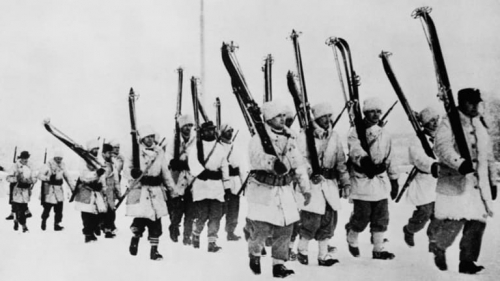
La situation fut similaire après la guerre de Continuation du côté allemand dans le cadre de l'opération Barbarossa. En 1944, la Finlande n'est pas non davantage occupée, mais commence alors une période qui durera jusqu'à l'effondrement de l'Union soviétique et qui est connue sous le nom de "finlandisation", c'est-à-dire de prise en compte particulière des sentiments et des souhaits de Moscou.
Sous les présidences de Juho Paasikivi (1946-1956) et d'Urho Kekkonen (1956-1981), la Finlande eut plutôt le statut de vassal de l'Union soviétique, du moins en politique étrangère. Kekkonen, qui appartenait au parti paysan du centre et gouverna de manière presque dictatoriale, fit participer les communistes finlandais au gouvernement. On murmure même que Kekkonen a travaillé pendant des années pour les services secrets soviétiques, le KGB.
L'obéissance anticipée d'Helsinki fut frappante. Lorsque la télévision suédoise diffusa un film basé sur la nouvelle d'Alexandre Soljenitsyne Un jour dans la vie d'Ivan Denissovitch, la Finlande coupa les émetteurs des îles Åland (un groupe d'îles dans le golfe de Botnie entre la Suède et la Finlande) parce que le bureau de la censure d'Helsinki interdit le film comme étant hostile aux Soviétiques. Le roman L'Archipel du Goulag, également écrit par Soljenitsyne, ne put pas être publié en finnois - le chef de l'État Kekkonen s'y opposa. Par crainte d'effrayer Moscou.
Les manuels scolaires ne devaient rien contenir qui puisse fâcher les amis russes (les deux pays ont signé un traité d'amitié en 1948). Même la vie culturelle fut soumise à une censure sévère: les acteurs et les artistes de cabaret qui se permettent de faire de petites blagues sur le voisin de l'Est n'obtenaient plus de rôles.
Leonid Brejnev et son Politburo vieillissant se réjouissent d'autant plus des quelque mille manifestations festives organisées en Finlande en 1970. L'occasion en est le retour du centenaire de la naissance de Vladimir Ilitch Lénine, le fondateur de l'Union soviétique.
D'autre part, entre 1945 et 1979, l'économie finlandaise connut un essor fulgurant, basé sur l'économie de marché occidentale. On se transforma pour le voisin de l'Est en une sorte d'épicerie fine, qui profita certes en premier lieu à la nomenklatura, c'est-à-dire à la classe des fonctionnaires du PC soviétique.
En ce qui concerne l'Ukraine, une neutralité à la finlandaise serait un moindre mal. D'autres scénarios - un État vassal à la manière de la Biélorussie, voire une incorporation totale dans la Fédération de Russie - ne sont probablement pas du goût des citoyens ukrainiens.
20:36 Publié dans Actualité, Affaires européennes | Lien permanent | Commentaires (0) | Tags : neutralité, finlande, ukraine, histoire, actualité, géopolitique, politique internationale, europe, affaires européennes |  |
|  del.icio.us |
del.icio.us |  |
|  Digg |
Digg | ![]() Facebook
Facebook
jeudi, 28 avril 2022
Le général de brigade à la retraite Erich Vad: il règle maintenant ses comptes avec les écolos fauteurs de guerre
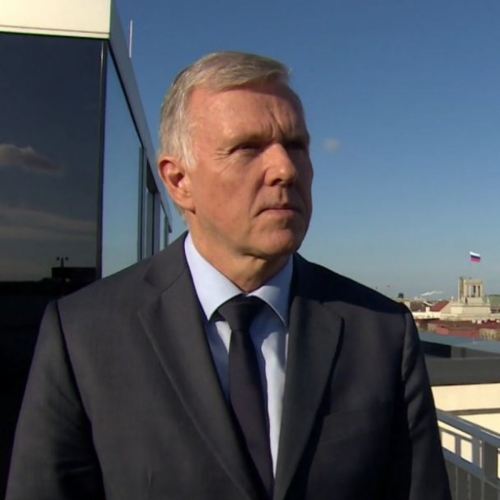
Le général de brigade à la retraite Erich Vad: il règle maintenant ses comptes avec les écolos fauteurs de guerre
Par Sven Reuth
Source: https://www.compact-online.de/brigadegeneral-a-d-erich-vad-jetzt-rechnet-er-mit-gruenen-kriegstreibern-ab/?mc_cid=3b95b79c94&mc_eid=128c71e308
Une escalade de la guerre en Ukraine comporte d'énormes risques pour l'Allemagne. C'est ce que le général de brigade à la retraite Erich Vad n'a cessé de rappeler ces dernières semaines. Il s'est exprimé clairement sur le bellicisme des Verts.
Erich Vad est un homme qui possède la plus grande expérience et a occupé les plus hauts postes de direction. De 2006 à 2013, il a été chef de groupe à la Chancellerie fédérale, secrétaire du Conseil fédéral de sécurité et conseiller en politique militaire de la chancelière Angela Merkel. Cette ascension a été possible malgré le fait que Vad ait donné en 2003 une conférence à l'Institut für Staatspolitik sur le thème "Le maintien de la paix et la géopolitique dans la pensée de Carl Schmitt". En 1996, Vad avait déjà publié le livre Stratégie et politique de sécurité. Perspectives dans l'œuvre de Carl Schmitt.
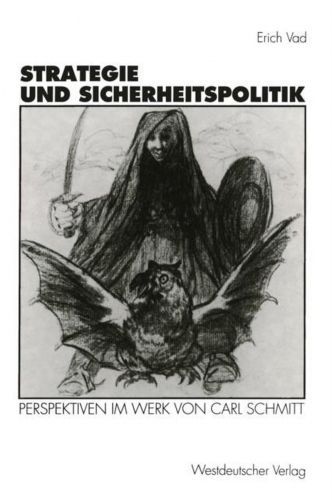
"Nous n'avons pas besoin d'une guerre par procuration"
Il y a deux semaines à peine, Vad avait déjà provoqué un scandale selon l'ambassadeur ukrainien Melnyk parce que, dans une interview accordée à Die Welt, il ne voulait pas attribuer à Poutine une intention de bombarder une clinique et faisait en outre référence au nombre élevé de victimes que les guerres menées par l'Occident avaient fait au cours des dernières décennies. Son message principal à l'époque était le suivant:
"Si nous ne voulons pas de la troisième guerre mondiale, nous devrons tôt ou tard sortir de cette logique d'escalade militaire et entamer des négociations".
Hier, dans le talk-show Maybritt Illner, Erich Vad a de nouveau suscité l'irritation en critiquant à la fois la ligne belliciste des Verts et l'attitude complètement naïve de la majorité de la société allemande face à une éventuelle escalade de la guerre en Ukraine. Son message de base était que l'établissement d'un cessez-le-feu rapide devrait être prioritaire par rapport à la question de savoir quel camp remporterait la victoire à la fin.
Vad a déclaré à ce sujet:
"Nous n'avons pas besoin en Europe centrale d'une guerre par procuration pendant des années, qui a le potentiel de dégénérer en guerre nucléaire".
"Nous ne voulons pas d'une victoire de l'Ukraine"
Toute "rhétorique guerrière" devrait être évitée. Afin de montrer clairement que la négociation rapide d'un cessez-le-feu et la recherche d'une solution politique à long terme au conflit sont prioritaires, aussi le gouvernement allemand devrait enfin déclarer :
"Nous ne voulons pas la victoire de l'Ukraine".
Il s'est montré particulièrement critique à l'égard du rôle actuel des Verts dans la politique fédérale. Il a déclaré à ce sujet :
"Ce qui me dérange, c'est quand les politiciens des Verts présentent les solutions militaires comme l'objectif ultime. C'est complètement fou ! Ce sont des politiciens Verts qui ont refusé et condamné le service militaire à l'époque !"
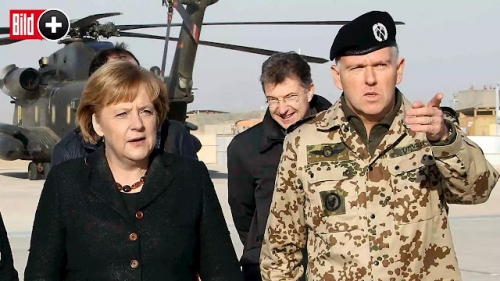
Vad avait déjà déclaré dans son interview à Die Welt qu'il estimait totalement erroné de dénier au président russe son humanité et de le qualifier de despote pathologique avec lequel personne ne peut plus parler. Après tout, il y a eu dans un passé récent d'autres guerres terribles et contraires au droit international, en Irak, en Syrie, en Libye et en Afghanistan, menées par des puissances occidentales.
Voici revenu le temps du nazisme
La bulle de gauche libérale et woke de Twitter est déjà en ébullition suite aux déclarations de Vad. On y fait notamment référence à un texte de Vad paru il y a 19 ans dans le magazine intellectuel de droite Sezession pour justifier l'interdiction imposée à cet expert patenté de participer à un talk-show. Si la campagne devait aboutir, l'un des rares critiques de la guerre encore en vie disparaîtrait de la scène publique.
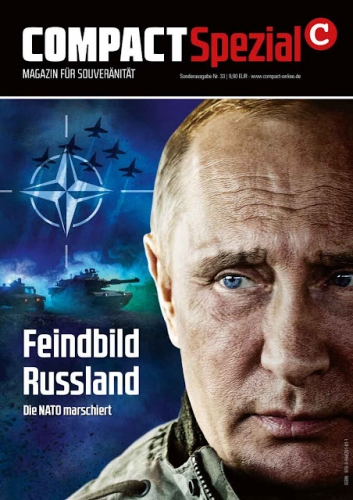
COMPACT-Spécial "L'image de l'ennemi russe - L'OTAN en marche" fournit les arguments pour un nouveau mouvement pour la paix. L'Allemagne doit rester neutre dans le conflit ukrainien - c'est la seule façon de protéger notre pays ! Commandez ici: https://www.compact-shop.de/shop/compact-spezial/compact-... !
10:25 Publié dans Actualité, Affaires européennes | Lien permanent | Commentaires (0) | Tags : actualité, ukraine, allemagne, verts, écologistes, erich vad, europe, affaires européennes |  |
|  del.icio.us |
del.icio.us |  |
|  Digg |
Digg | ![]() Facebook
Facebook
mardi, 26 avril 2022
Bombes de vérité : comment les Etats-Unis ont mis la main sur l'Ukraine
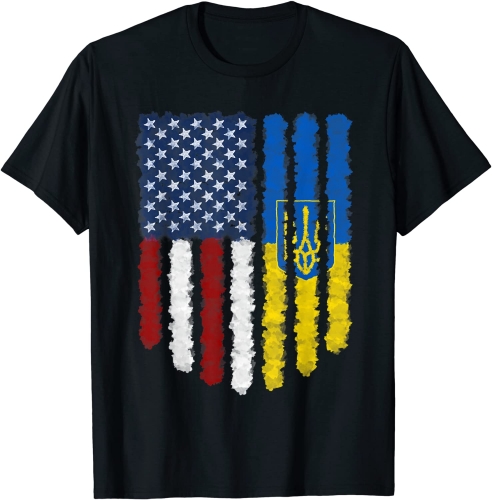
Bombes de vérité : comment les Etats-Unis ont mis la main sur l'Ukraine
par Fabio Mini
Source : Il Fatto quotidiano & https://www.ariannaeditrice.it/articoli/bombe-di-verita-cosi-gli-usa-hanno-messo-le-mani-sull-ucraina
Il y a quelques semaines, lors d'une apparition à la télévision américaine, la célèbre journaliste Lara Logan a lâché tant de "bombes de vérité" sur un public médusé que les présentateurs du programme ont dû supplier (sur des téléphones internes) pour une pause commerciale. Les "bombes" étaient en fait des choses que les soi-disant complotistes disaient au monde entier depuis longtemps, sauf aux Américains bien sûr.
Outre la rhétorique poutiniste, qui reflète la rhétorique anti-poutiniste, ce qui est étonnant, c'est la réaction du public: une avalanche de compliments pour les vérités non dites, quelques objections, de nombreuses expressions d'admiration pour le courage et tout autant de prières de la part de ceux qui craignent pour la vie de Lara.
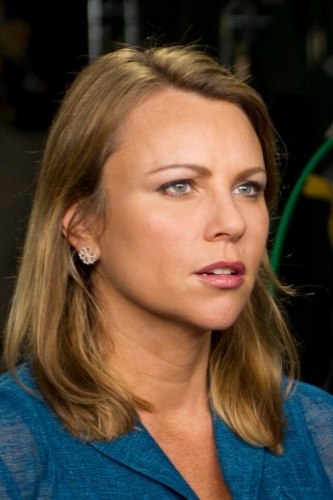
Lara Logan.
Même au pays de la liberté d'expression, si vous dites quelque chose qui dérange les pouvoirs en place, vous êtes mort. La tirade de Lara Logan est plus que cela: c'est un appel clair à la responsabilité du leadership américain dans ce qui se passe en Ukraine. Là-bas, la rhétorique des bons gars et des méchants voyous a explosé, tout comme au Vietnam, en Irak et en Afghanistan, mais pour les Américains qui se sont habitués à l'idée d'être les bons gars, c'est toujours une "découverte" saine mais traumatisante.
Rechercher des traces d'une implication directe des États-Unis dans cette guerre, présentée comme une question subalterne qui ne concerne que la Russie et l'Ukraine et tout au plus l'UE ou l'OTAN et la Russie, est moins difficile qu'il n'y paraît.
Les États-Unis sont présents en Ukraine depuis 1991 et n'en sont jamais repartis. Lorsque l'URSS s'est désintégrée, l'Ukraine s'est retrouvée avec le troisième arsenal nucléaire le plus puissant du monde, après les États-Unis et la Russie. Pas moins de 176 missiles intercontinentaux avec 1240 têtes nucléaires.
Plusieurs dizaines de bombardiers nucléaires stratégiques avec 600 missiles et bombes à gravité et 3000 dispositifs nucléaires tactiques. Les États-Unis et la Russie se sont mis d'accord sur une réduction de l'armement nucléaire et, avec l'idée que l'Ukraine serait toujours dans la sphère d'influence de la Russie, ont décidé d'éliminer tout l'armement nucléaire existant en Ukraine.
À partir de 1992, l'Ukraine a exploité la sensibilité de l'Occident à la question nucléaire et, jusqu'en 1994, elle a continué à gagner du temps et à marchander son adhésion au traité de non-prolifération et la ratification de START. Le démantèlement de chaque silo à missiles coûtait 1 million de dollars (à l'époque) et les États-Unis ont fourni 399,2 millions de dollars pour payer Bechtel Corp. afin de sous-traiter les travaux.
La dénucléarisation a été achevée, du moins sur le papier, en 1996, mais ce n'est qu'en 2000 que les bombardiers stratégiques ont été remis à la Russie en échange d'un allègement des dettes de gaz qui s'étaient accumulées. L'Ukraine a hérité d'environ 30 % de l'industrie militaire soviétique, qui représentait 50 à 60 % de toutes les entreprises ukrainiennes et employait 40 % de sa population active. L'armée ukrainienne a échangé des armes conventionnelles et signé des contrats avec des entreprises commerciales. Les premiers contrats de livraison d'armes à l'Iran, signés à la mi-1992, ont provoqué une réaction négative en Occident (surtout aux États-Unis). Depuis lors, l'Ukraine n'a cessé de produire des armes et de les vendre sur le marché noir à divers pays, toujours sous l'œil attentif des États-Unis, de la Russie et de leurs trafiquants et oligarques.
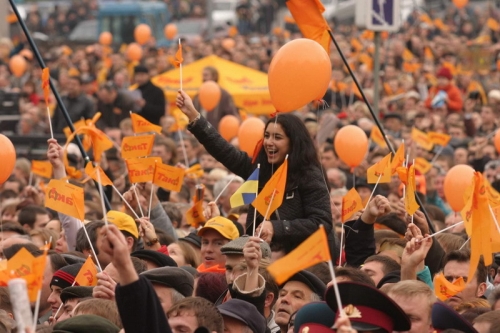
Depuis la révolution orange de 2004, les États-Unis sont intervenus en Ukraine pour déstabiliser les relations avec la Russie. Les différentes tentatives se sont concrétisées dix ans plus tard avec les incidents de Maidan. L'ingérence est flagrante et il s'agit, en l'occurrence, de l'appel téléphonique de Victoria Nuland - "Fuck the EU !" - pour révéler qu'elle ne se contente pas de surveiller les événements, mais qu'elle assure une direction politique et opérationnelle. De 2014 à 2022, grâce aux sanctions et à l'aide militaire des États-Unis et de l'OTAN, l'armée a été restructurée, des milices paramilitaires ont été équipées et entraînées, et des laboratoires de recherche biologique ont été installés par des entreprises américaines. Dans une tentative grotesque de faire passer la question des laboratoires pour des fake news, l'équipe Vox Check écrit: "Des laboratoires biologiques américains secrets en Ukraine? Un mythe de la propagande russe. Rien ne prouve qu'il y en ait... Cependant, il existe une coopération entre les institutions ukrainiennes et américaines. Depuis 2005, les États-Unis ont aidé à moderniser les laboratoires ukrainiens, à mener des recherches et à améliorer la sécurité pour prévenir les épidémies de maladies infectieuses dangereuses par le biais du programme de réduction des menaces biologiques. Pendant toute la période de coopération, les États-Unis ont investi environ 200 millions de dollars dans le développement de 46 laboratoires et institutions médicales en Ukraine. Ces institutions ne sont pas impliquées dans le développement d'armes chimiques ou biologiques".
Et en effet, comme la mutuelle ukrainienne ne s'occupe pas de vaccins mais d'agents pathogènes à haut risque, l'Organisation mondiale de la santé a conseillé à l'Ukraine, le 11 mars dernier (source : Reuters), de détruire ces agents hébergés dans les laboratoires de santé publique du pays afin d'éviter "toute fuite potentielle" qui propagerait des maladies au sein de la population.
Mais la question est que "au contraire, les États-Unis ont lancé un programme visant à empêcher le développement de telles armes. L'Union soviétique avait son propre programme d'armes biologiques. Après l'effondrement, des matières biologiques dangereuses sont restées sur le territoire de l'Ukraine. Le programme américain vise à garantir que ces matériaux ne soient pas volés ou utilisés à des fins autres que la recherche. Jusqu'en 2014, le programme s'étendait également aux laboratoires russes".
Cependant, ces matériaux laissés par l'URSS soulèvent la question d'autres matériaux soviétiques en Ukraine. L'URSS disposait d'un stock de près de 40.000 tonnes d'agents chimiques neurotoxiques, vésicants et suffocants. Selon certains rapports, le stock total a dépassé 50.000 tonnes, avec un stock supplémentaire de 32.300 tonnes d'agents phosphorés. Quelle proportion de ce stock est restée en Ukraine?
Officiellement aucune, mais si les armes biologiques sont laissées, pourquoi ne pas laisser aussi les armes chimiques que la Russie et les États-Unis possèdent encore?
Les traces des États-Unis en Ukraine sont également présentes ici, ne serait-ce que parce qu'elles savent exactement où elles ont abouti. Si l'on devait mesurer l'implication américaine par le nombre de soldats américains sur le terrain, on peut se limiter à compter les soi-disant volontaires parmi les combattants et les contractants étrangers. Le président Zelensky a parlé d'environ 20.000 volontaires du monde entier (y compris des États-Unis).
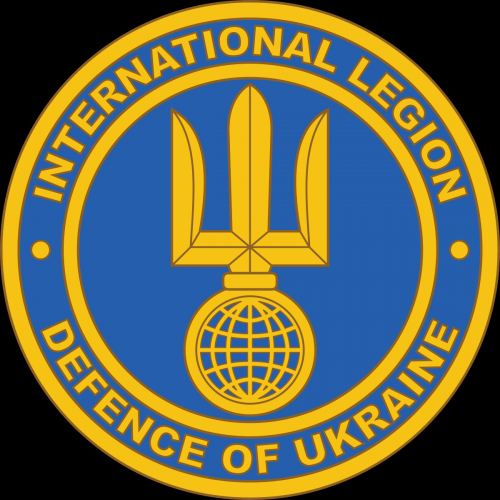
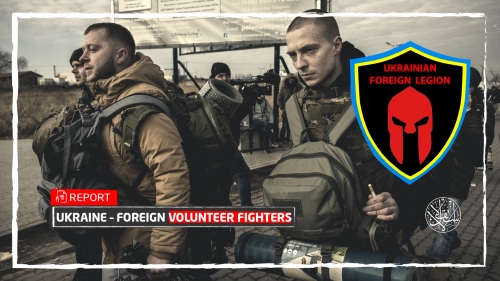
La "légion internationale" a été intégrée aux forces de défense de l'Ukraine, afin de ne pas tomber dans un vide juridique sur le statut des mercenaires. En fait, nombre d'entre eux sont payés avec des fonds donnés par les États-Unis et l'Europe, ainsi que par des "particuliers". Le commandant de la Légion géorgienne, M. Mamulashvili, procède depuis avril 2014 au recrutement et à la formation de bataillons composés de professionnels, principalement américains et britanniques. Eante a personnellement dirigé ses bataillons contre les Russes à l'aéroport d'Hostomel, dans la région de Kiev. Si l'on veut ensuite examiner le rôle des États-Unis dans la question ukrainienne à quelques pas de la frontière, on peut en déduire que la "défense" de l'OTAN est peu défensive et très provocatrice. Le Pentagone a repositionné ses troupes avant l'invasion russe. Les 160 hommes de la Garde nationale de Floride (instructeurs) ont été retirés d'Ukraine. Sur les quelque 40.000 soldats américains présents en Allemagne, plusieurs milliers ont été déployés dans les pays voisins de l'OTAN. L'OTAN a déployé 5000 soldats depuis 2014 dans les États baltes et les États-Unis ont envoyé 5000 autres soldats en Allemagne.
La présence américaine dans la cyberguerre est également ancienne. La dernière attaque russe contre le réseau ukrainien de contrôle de l'électricité (8 avril) a été miraculeusement évitée grâce à Microsoft et à la société slovaque Eset. Le collectif Anonymous a attaqué à plusieurs reprises la Russie et s'est entièrement rangé du côté de l'Ukraine. L'origine des membres éphémères du collectif est des plus variées et offre diverses possibilités aux agents de la cyberguerre de se déguiser derrière cette marque. La même opportunité est offerte aux sites anti-russes comme RURansom Wiper et à des dizaines d'autres plateformes formelles et informelles. Les grandes entreprises américaines sont toutes présentes en Ukraine et boycottent et censurent toute communication "indésirable". Il s'agit d'activités collatérales mais importantes.
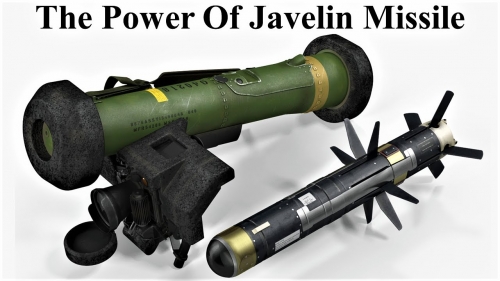
Cependant, l'implication la plus importante se situe avec et derrière l'envoi de fonds et d'armes. Le président Biden a porté la contribution américaine à 1 milliard de dollars en une semaine et à 2 milliards de dollars depuis son entrée en fonction. Les nouvelles armes envoyées comprennent des missiles Stinger (800), des missiles Javelin (2000) et des systèmes antichars (6000). Le transfert de véhicules blindés, de technologies et de drones d'autres pays vers l'Ukraine a été autorisé. Beaucoup de ces systèmes ont également besoin de leurs opérateurs et ceux-ci sont normalement fournis par des sociétés militaires privées, qui continuent à recruter du personnel spécialisé.
Avec tout cela, seul un pays délibérément laissé dans l'ignorance peut encore penser qu'il n'est pas impliqué et peut avoir une Pâques paisible.
16:56 Publié dans Actualité, Affaires européennes | Lien permanent | Commentaires (0) | Tags : ukraine, états-unis, europe, affaires européennes, politique internationale, lara logan |  |
|  del.icio.us |
del.icio.us |  |
|  Digg |
Digg | ![]() Facebook
Facebook
Après la conquête de la mer d'Azov
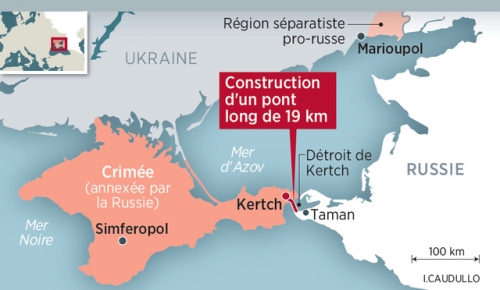
Après la conquête de la mer d'Azov
par Federico Dezzani
Source: https://www.ariannaeditrice.it/articoli/dopo-la-conquista-del-mare-di-azov & Federico Dezzani
Au 57e jour de la guerre russo-ukrainienne, le ministère russe de la Défense a annoncé la conquête de la ville de Marioupol. Il est temps d'analyser comment la campagne militaire a évolué au cours des deux derniers mois, comment elle pourrait évoluer dans un avenir proche et, surtout, quelles seront ses répercussions internationales: il est de plus en plus évident que les puissances anglo-saxonnes veulent utiliser le conflit pour affaiblir la Russie et, en même temps, déstabiliser l'Allemagne et l'Italie.
Une guerre par procuration tous azimuts
Un peu moins de deux mois après le début des hostilités russo-ukrainiennes, le ministère russe de la Défense a annoncé la conquête de la ville de Marioupol, qui compte environ 400.000 âmeset est située sur le littoral de la mer d'Azov: seul le grand complexe sidérurgique, qui fait partie du kombinat de l'acier construit dans le Donbass dans les années 1930, reste encore aux mains des troupes ukrainiennes désormais clairsemées, mais sa chute est une question de temps. La Russie a donc obtenu un premier résultat stratégique tangible: elle a recréé un pont terrestre avec la péninsule de Crimée (annexée en 2014) et transformé la mer d'Azov en un lac intérieur. Les frontières russes sont donc revenues, sur le front sud, à la conformation de la première moitié du XVIIIe siècle, lorsque l'empire tsariste a réussi à arracher la mer d'Azov aux Turcs et à entrer dans les mers chaudes.
Il est particulièrement utile de reconstituer comment la Russie est parvenue à ce résultat en l'espace de deux mois. Dans notre analyse effectuée au "jour -1", nous avions supposé une campagne militaire de grande envergure, d'une durée de 30 à 40 jours, qui conduirait les Russes jusqu'au Dniepr et à partir Odessa jusqu'au Dniestr. Les faits montrent toutefois que cette option, une campagne militaire de grande envergure sur le territoire ukrainien, n'a jamais été envisagée par les stratèges russes qui pensaient à tort pouvoir se limiter à une "opération militaire spéciale" aux fins éminemment politiques, à savoir le renversement du gouvernement Zelensky et l'avènement d'une junte militaire qui rétablirait la coopération traditionnelle entre la Russie et l'Ukraine. Appeler les opérations qui ont duré du 25 février au 31 mars la "bataille de Kiev" est erroné: on peut tout au plus parler d'une "intimidation de Kiev", car les Russes n'ont jamais envisagé de conquérir la ville dans cette phase de la guerre. La "première phase" de la campagne militaire peut être résumée par l'appel lancé par Poutine aux militaires ukrainiens le 26 février 2022 pour qu'ils prennent le pouvoir et se débarrassent de la "bande de drogués et de néonazis", facilitant ainsi le début des négociations.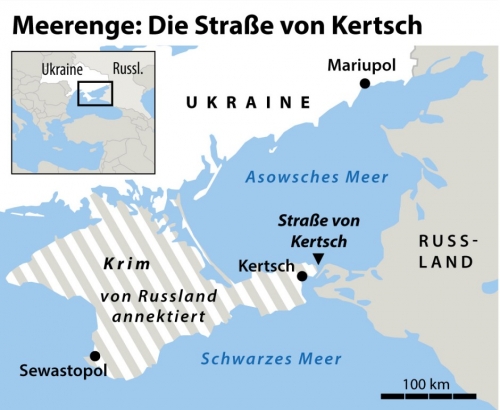
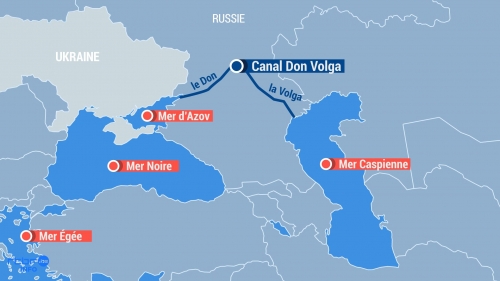
Ces calculs se sont révélés erronés, car Moscou a sous-estimé le degré de pénétration des puissances anglo-saxonnes dans l'appareil ukrainien: en huit ans (le temps écoulé entre la révolution colorée de 2014 et aujourd'hui), Londres et Washington ont eu les moyens de s'insinuer jusque dans le coin le plus caché de l'État et de l'armée ukrainiens, éliminant les éléments qui auraient pu accepter l'appel de Poutine et renverser Zelensky. À ce moment-là, les Russes se sont retrouvés dans une position militaire aussi inconfortable qu'improductive: une tête de pont autour de Kiev, alimentée avec de grandes difficultés logistiques par la Biélorussie et exposée à la guérilla des nationalistes ukrainiens. Tant qu'il y avait la possibilité d'un règlement politique du conflit (les négociations tenues en Biélorussie puis en Turquie), les Russes sont restés aux portes de Kiev. Une fois ce scénario écarté, ils se sont retirés en bon ordre du nord de l'Ukraine pour poursuivre des objectifs militaires plus concrets dans le sud-est de l'Ukraine: c'est la "phase deux", annoncée dans les derniers jours de mars. La nomination du général Aleksandr Dvornikov, déjà en charge des opérations militaires en Syrie, comme commandant unique du front ukrainien, annoncée le 9 avril, peut être considérée comme le tournant de la campagne, qui prend de moins en moins de connotations politiques et de plus en plus de connotations militaires. Il convient toutefois de noter que deux mois après l'ouverture du conflit, la Russie ne s'était pas encore lancée dans la destruction systématique des infrastructures ukrainiennes, qui, si une approche purement militaire avait été suivie, aurait dû avoir lieu dès les premières heures de la campagne.
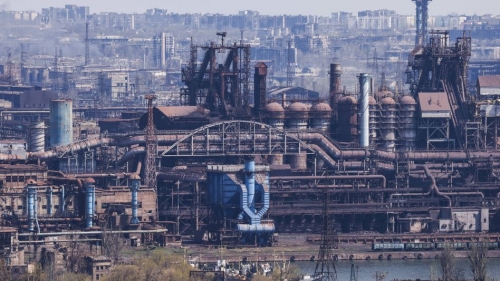
La conquête de Mariupol (avec ses aciéries, photo ci-dessus) annoncée le 21 avril, avec le déploiement consécutif des troupes engagées dans la ville, devrait être le prodrome de la déjà célèbre "bataille du Donbass", dont les Russes ont jeté les bases en conquérant, le 24 mars, le saillant d'Izyum: sur le papier, elle se préfigure ainsi comme une grande tenaille qui, partant du nord et du sud, devrait se refermer sur la ville de Kramatosk. Les avantages que pourraient obtenir les Russes seraient multiples: la destruction de l'armée ukrainienne concentrée depuis le début des hostilités dans le Donbass (estimée à environ 40.000-60.000 unités) et l'affinement des futures frontières, de manière à rendre compacte la région à annexer à la Russie. Quoi qu'il en soit, même en cas de défaite sévère de l'armée ukrainienne, il est peu probable que la "bataille du Donbass" marque la fin des hostilités.
Les puissances anglo-saxonnes ont intérêt à prolonger le conflit le plus longtemps possible et, à cette fin, s'apprêtent à déverser de plus en plus d'armes en Ukraine pour alimenter la "résistance". Le Royaume-Uni, en particulier, qui joue un rôle de premier plan en Ukraine, comme en témoigne le voyage de Johnson à Kiev le 9 avril, a promis d'envoyer des instructeurs, de l'artillerie, des missiles anti-navires Harpoon et même des véhicules blindés pour transporter les systèmes anti-aériens Starstreak. Cet activisme britannique s'explique par le fait que dans la "troisième guerre mondiale" menée par les puissances anglo-saxonnes contre les puissances continentales pour le contrôle du Rimland, le quadrant européen de l'Eurasie a été mis entre les mains de Londres, tandis que Washington et Canberra doivent se concentrer sur le Pacifique et la Chine.
Qu'est-ce que les puissances anglo-saxonnes espèrent gagner en prolongeant jusqu'au bout la guerre en Ukraine, à créer une nouvelle "Syrie" au cœur de l'Europe? Comme nous l'avons souligné à plusieurs reprises dans nos analyses, toute compréhension géopolitique des événements actuels doit englober l'Eurasie dans son ensemble et donc l'axe horizontal Chine-Russie-Allemagne (avec ses nombreuses branches verticales en Birmanie, au Pakistan, en Iran, en Italie, etc.). En prolongeant le conflit pour au moins toute l'année 2022, en jetant de plus en plus d'armes létales sur le théâtre ukrainien, les puissances maritimes anglo-saxonnes espèrent :
- affaiblir davantage la Russie, de manière à rendre possible la chute de Poutine et la relocalisation stratégique du pays dans une fonction anti-chinoise (ou du moins la disparition de la Russie en tant que facteur de puissance, dans le sillage d'une crise politique et d'un effondrement socio-économique) ;
- mener à bien la déstabilisation de l'Europe, en mettant un accent particulier sur l'Allemagne et l'Italie.
A plusieurs reprises, en effet, il a été souligné que les objectifs anglo-saxons de la guerre en Ukraine se situaient sur deux fronts: le russe et l'allemand. Les invectives de plus en plus violentes de Zelensky à l'encontre des dirigeants allemands, coupables de ne pas fournir suffisamment d'armes et de faire obstacle à l'embargo total sur la Russie, illustrent bien ce phénomène. En exacerbant le conflit en Ukraine et en le faisant traîner jusqu'à l'automne prochain, les Anglo-Américains espèrent imposer le blocus convoité sur les approvisionnements énergétiques en provenance de Russie, plongeant ainsi l'Allemagne et l'Italie, qui sont les plus dépendantes du gaz russe, dans une récession économique grave et prolongée. À ce moment-là, l'"axe médian" de l'Europe, qui a son prolongement naturel en Algérie et qui tend naturellement à converger vers la Russie et la Chine, serait jeté dans le chaos ou, du moins, sérieusement affaibli, également parce que les Anglo-Saxons travaillent activement à faire de la terre brûlée partout où les Italiens et les Allemands peuvent s'approvisionner, en Libye comme en Angola. Chaque missile Starstreak envoyé par les Britanniques en Ukraine est un missile visant à laisser l'Allemagne et l'Italie sans énergie: tout porte à croire que l'automne 2022 sera l'un des plus difficiles de mémoire d'homme.
16:03 Publié dans Actualité, Affaires européennes, Géopolitique | Lien permanent | Commentaires (0) | Tags : politique internationale, ukraine, géopolitique, mer d'azov, mer noire, espace pontique, russie, allemagne, italie, europe, affaires européennes |  |
|  del.icio.us |
del.icio.us |  |
|  Digg |
Digg | ![]() Facebook
Facebook
lundi, 25 avril 2022
Nord Stream 2, une des clés de la guerre en Ukraine
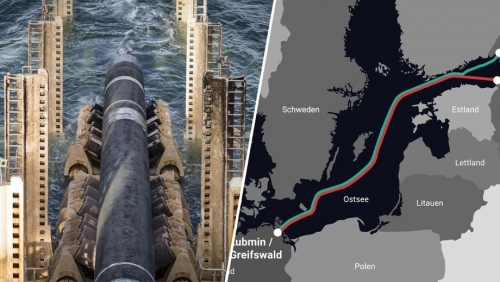
Nord Stream 2, une des clés de la guerre en Ukraine
Daniel Miguel López Rodríguez
Source: https://posmodernia.com/nord-stream-2-una-de-las-claves-de-la-guerra-de-ucrania/
Le flux du Nord
Le sous-sol ukrainien contient un réseau de gazoducs par lequel passe une partie de l'approvisionnement russe vers l'Europe. Entre 2004 et 2005, 80 % du gaz russe destiné à l'Europe a transité par le sous-sol ukrainien. Lorsque Gazprom (le géant russe de l'énergie appartenant à l'État) a interrompu l'approvisionnement des Ukrainiens en janvier 2006 et en janvier 2009, ces derniers ont saisi le gaz destiné à l'Europe, ce qui a entraîné des pertes énormes pour ces pays, qui sont très dépendants du gaz russe, et a jeté un sérieux discrédit sur la Russie en tant que fournisseur.
Afin d'éviter ce transit ukrainien, les Russes ont décidé de construire deux nouveaux gazoducs. Gazprom a fait valoir que le fait de relier un gazoduc directement à l'Allemagne sans avoir besoin de passer par des pays de transit permettrait d'éviter que les exportations de gaz russe vers l'Europe occidentale ne soient coupées, comme cela s'est produit deux fois auparavant. C'est ainsi qu'est né le projet Nord Stream (Севеверный поток), un gazoduc qui relierait la Russie à l'Europe (directement à l'Allemagne via la mer Baltique) sans devoir passer par l'Ukraine ou la Biélorussie.
En avril 2006 déjà, le ministre polonais de la défense, Radek Sikorski, comparait les accords sur la construction d'un gazoduc au pacte de non-agression germano-soviétique, le pacte Ribbentrop-Molotov signé aux premières heures du 24 août 1939, car la Pologne est particulièrement sensible aux accords passés par-dessus sa tête (https://www.voanews.com/a/a-13-polish-defense-minister-pi... ). Tout pacte conclu par la Russie et l'Allemagne y fera penser et sera diabolisé (telle est la simplicité de la propagande, mais elle est tout aussi efficace non pas en raison du mérite des propagandistes mais du démérite du vulgaire ignorant, qui abonde).
Le ministre suédois de la défense, Mikael Odenberg, a indiqué que le projet constituait un danger pour la politique de sécurité de la Suède, car le gazoduc traversant la Baltique entraînerait la présence de la marine russe dans la zone économique de la Suède, ce que les Russes utiliseraient au profit de leurs renseignements militaires. En fait, Poutine justifierait la présence de la marine russe pour assurer la sécurité écologique.
L'hebdomadaire allemand Stern a émis l'hypothèse que le câble à fibre optique et les stations relais le long du gazoduc pourraient être utilisés pour l'espionnage russe, mais Nord Stream AG (le constructeur du gazoduc) a répondu en arguant qu'un câble de contrôle à fibre optique n'était pas nécessaire et n'avait même pas été prévu. Le vice-président du conseil d'administration de Gazprom, Alexander Medvedev, minimise la question en soulignant que "certaines objections sont soulevées qui sont risibles : politiques, militaires ou liées à l'espionnage. C'est vraiment surprenant car dans le monde moderne, il est ridicule de dire qu'un gazoduc est une arme dans une guerre d'espionnage" (https://web.archive.org/web/20070927201444/ et http://www.upstreamonline.com/live/article138001.ece ). Où que soient les Russes, on craint toujours les espions (on ne se méfie pas autant des Ricains, malgré les révélations d'Edward Snowden : l'enfer, c'est toujours les autres).
Le Rockefellerien Greenpeace se plaindrait également de la construction du gazoduc, car il traverserait plusieurs zones classées comme aires marines de conservation.
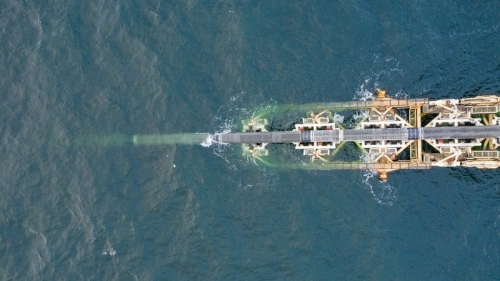
Le 13 juin 2007, face aux préoccupations écologiques, le ministre russe des Affaires étrangères, Sergei Lavrov, a déclaré que "la Russie respecte pleinement le désir d'assurer la durabilité environnementale à 100 % du projet et soutient entièrement cette approche, et toutes les préoccupations environnementales seront traitées dans le cadre du processus d'évaluation de l'impact environnemental" (https://www.upstreamonline.com/online/russia-backs-green-... ).
Le gazoduc devait être inauguré le 8 novembre 2011 lors d'une cérémonie dans la municipalité de Lubmin (Mecklembourg-Poméranie occidentale) par la chancelière Angela Merkel et le président russe Dmitri Medvedev ; étaient également présents le Premier ministre français François Fillon et le Premier ministre néerlandais Mark Rutte.
Il était également prévu de construire South Stream, un gazoduc qui devait relier la Russie à la Bulgarie en traversant la mer Noire jusqu'à la Grèce et l'Italie. Mais il a finalement été annulé au profit de Blue Stream, qui transporte du gaz naturel du sud de la Russie vers la Turquie via la mer Noire. Grâce à ce gazoduc, la Turquie est le deuxième plus grand importateur de gaz russe, juste derrière l'Allemagne.
Alors que l'Allemagne a pu réaliser le projet Nord Stream 1, la Grèce et l'Italie ont vu leur projet South Stream mis au rebut. C'est un signe de qui a le plus de pouvoir dans la prétentieuse Union européenne. Mais Nord Stream 2 n'est pas allé aussi loin et - comme nous le verrons - les Allemands se sont pliés aux diktats des Américains.
Nord Stream 1 se compose de deux pipelines allant de Vyborg (nord-ouest de la Russie) à Greifswald (nord-est de l'Allemagne). Il a la capacité de transporter 55 milliards de mètres cubes par an, même si en 2021, il était capable de transporter 59,2 milliards de mètres cubes. Il s'agit du gazoduc par lequel transite le plus grand volume de gaz à destination de l'UE.
Les travaux sur le gazoduc Nord Stream 2 ont duré de 2018 à 2021, et on estime que le matériau du gazoduc peut durer environ 50 ans. Le pipeline part de la station de compression Slavyanskaya, près du port d'Ust-Luga (dans le district Kingiseppsky de l'Oblast de Leningrad), et va jusqu'à Greifswald (Poméranie occidentale). En 2019, la société suisse Allsea, qui était chargée de poser le gazoduc, a abandonné le projet et Gazprom a dû le mener à bien par ses propres moyens. La première ligne a été achevée en juin 2021 et la seconde en septembre. Son ouverture était prévue pour le milieu de l'année 2022, ce qui devait permettre de doubler le gaz transporté pour atteindre 110 milliards de mètres cubes par an. Outre Gazprom, les partenaires pour la construction de Nord Stream 2 ont été Uniper, Wintershall, OMV, Engie et Shell plc.
Le gouvernement allemand a approuvé le projet en mars 2018, afin d'éloigner l'Allemagne du nucléaire et du charbon (c'est-à-dire pour des raisons environnementales, toujours aussi sensibles en Allemagne, déjà depuis des temps pas particulièrement démocratiques). Les coûts du gazoduc sont estimés à 9,9 milliards d'euros, Gazprom apportant 4,75 milliards d'euros et ses partenaires le reste.
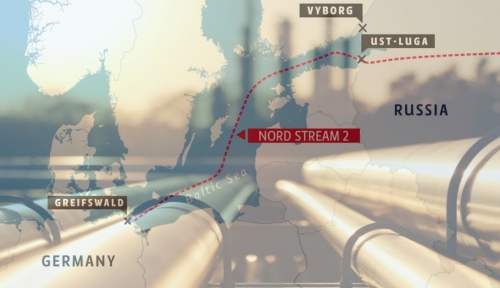
Nord Stream 2 aurait complété les troisième et quatrième lignes (par rapport aux première et deuxième lignes de Nord Stream 1). À travers la Baltique, Nord Stream 1 et 2 suivent fondamentalement le même itinéraire. Les deux pipelines tirent leur gaz des gisements de la péninsule de Yamal et des baies d'Ob et de Taz. Avec ces deux gazoducs (avec quatre lignes au total), l'Allemagne fournirait du gaz russe à d'autres pays, ce qui améliorerait sans aucun doute la situation sur le marché européen et permettrait de surmonter la crise énergétique. Les Allemands sont allés jusqu'à affirmer que le Nord Stream 2 serait plus rentable que les livraisons terrestres via l'Europe de l'Est. La Russie a fourni 35,4 % du gaz arrivant en Allemagne (et avec Nord Stream 2, elle aurait doublé cette quantité) et 34 % du pétrole.
Les principaux opposants à Nord Stream 2 ont été les pays baltes, la République tchèque, la Slovaquie, la Hongrie ( ?), la Roumanie, la Croatie, la Moldavie et principalement la Pologne et l'Ukraine, tous soutenus par la Commission européenne et les États-Unis. Ces pays se sont opposés à Nord Stream 2 au motif qu'un gazoduc direct vers l'Allemagne pourrait entraîner l'arrêt de leur approvisionnement en énergie et les priver des lucratifs frais de transit.
Chronologie de la politique américaine contre Nord Stream 2
Les plaintes américaines contre le gazoduc ne sont pas propres à l'administration Biden (qui a subi la pression de ses collègues démocrates pour adopter une ligne dure contre la Russie, qualifiant ainsi Poutine de "meurtrier" - comme si l'administration Obama dont il était le vice-président n'avait pas commis d'innombrables crimes de guerre, bien plus que la Russie ne l'a jamais fait : mais le premier président afro-américain est un démon qui "ne sent pas le soufre"). Déjà sous Obama, les protestations ont commencé alors que le projet n'avait pas encore totalement pris forme (l'idée du projet a commencé à prendre forme en octobre 2012).
Sous l'administration Trump, les plaintes se sont poursuivies et n'ont jamais cessé, même si Trump a d'abord affirmé qu'il n'appliquerait pas la loi contre les ennemis de l'Amérique par le biais de sanctions sur les exportations énergétiques russes, mais il a rapidement changé d'avis. M. Trump a même menacé d'imposer des droits de douane aux pays de l'UE et a proposé de rouvrir les négociations en vue de conclure un accord commercial entre les États-Unis et l'UE si le projet était annulé.
Le 27 janvier 2018, coïncidant avec le 73e anniversaire de la libération du camp de concentration d'Auschwitz, le secrétaire d'État Rex Tillerson (un ancien PDG d'Exxon Mobil, c'est-à-dire un homme de Rockefeller infiltré dans l'administration Trump, qui sera finalement évincé par le plus loyal Mike Pompeo) a fait valoir que les États-Unis et la Pologne s'opposaient à Nord Stream 2 en raison du danger qu'il représente pour la sécurité et la stabilité énergétiques de l'Europe, "tout en donnant à la Russie un outil supplémentaire pour politiser le secteur de l'énergie" ( https://www.expansion.com/economia/politica/2018/01/27/5a... ).
Les sénateurs américains des deux partis se sont inquiétés en mars 2018, lorsque le gouvernement allemand a approuvé le projet, et ont écrit que "en contournant l'Ukraine, Nord Stream II éliminera l'une des principales raisons pour lesquelles la Russie évite un conflit à grande échelle dans l'est de l'Ukraine, comme le Kremlin le sait bien" (https://www.cfr.org/in-brief/nord-stream-2-germany-captiv... ).
Le transit ukrainien fournissait autrefois 44 % du gaz russe à l'UE, ce qui permettait aux caisses de l'État (de plus en plus corrompu) d'empocher quelque 3 milliards de dollars par mois. Mais avec Nord Stream 2, cela devait changer et le transit par le sous-sol ukrainien devait être encore décuplé. Cela aurait fait perdre à l'Ukraine 3 % de son PIB. L'Ukraine y voyait une atteinte à sa souveraineté, mais aussi à la sécurité énergétique collective de l'Europe dans son ensemble, car le transit du gaz par l'Ukraine dissuade l'agression russe. L'ouverture de Nord Stream 2, qui aurait fait de l'Allemagne la première plaque tournante du gaz en Europe, aurait mis fin à cette situation.
En janvier 2019, l'ambassadeur américain en Allemagne, Richard Grenell, a envoyé une lettre aux entreprises qui construisent le gazoduc, les exhortant à abandonner le projet et les menaçant de sanctions si elles le poursuivent. En décembre de la même année, les sénateurs républicains Ted Cruz et Ron Johnson ont également fait pression sur les entreprises impliquées dans le projet.
Le président du Conseil européen Donald Tusk, le Premier ministre polonais Mateusz Morawiecki et le ministre britannique des Affaires étrangères de l'époque Boris Johnson ont protesté contre la construction de Nord Stream 2. Tusk a clairement indiqué que le gazoduc n'était pas dans l'intérêt de l'Union européenne. Les fonctionnaires de la Commission européenne ont déclaré que "Nord Stream 2 n'améliore pas la sécurité énergétique [de l'UE]" (https://euobserver.com/world/141584 ).
Nord Stream 2 est quelque chose qui a divisé l'UE. Bien que lorsque Donald Trump était dans le bureau ovale de la Maison Blanche, le projet ne semblait pas si mauvais, et la France, l'Autriche et l'Allemagne, plus la Commission européenne, ont critiqué les États-Unis (c'est-à-dire l'administration Trump) pour les nouvelles sanctions contre la Russie au sujet du pipeline, se plaignant que les États-Unis menaçaient l'approvisionnement énergétique de l'Europe.
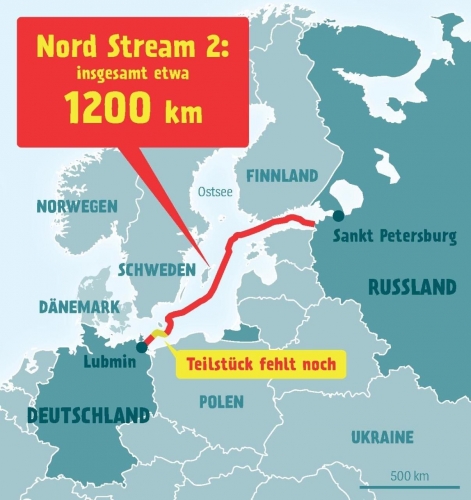
Le chancelier autrichien Christian Kern et le ministre allemand des Affaires étrangères Sigman Gabriel se sont plaints dans une déclaration commune : "L'approvisionnement énergétique de l'Europe est l'affaire de l'Europe, pas celle des États-Unis d'Amérique" (https://www.usnews.com/news/business/articles/2017-06-15/... ). Et ils ajoutent : "Menacer les entreprises d'Allemagne, d'Autriche et d'autres États européens de sanctions sur le marché américain si elles participent ou financent des projets de gaz naturel comme Nord Stream 2 avec la Russie introduit une qualité complètement nouvelle et très négative dans les relations entre l'Europe et les États-Unis" (https://www.politico.eu/article/germany-and-austria-warn-... ). Mais - comme nous le verrons - les politiciens allemands, avec un gouvernement social-démocrate, n'ont pas été aussi audacieux avec l'administration Biden.
Isabelle Kocher, PDG du groupe ENGIE (un groupe local français qui distribue de l'électricité, du gaz naturel, du pétrole et des énergies renouvelables), a critiqué les sanctions américaines et a affirmé qu'elles tentaient de promouvoir le gaz américain en Europe (ce qui est la clé de toute l'affaire). Olaf Scholz, lorsqu'il était ministre des finances dans le gouvernement de coalition dirigé par Merkel, a rejeté les sanctions comme "une intervention sévère dans les affaires intérieures allemandes et européennes". Un porte-parole de l'UE a critiqué "l'imposition de sanctions contre des entreprises de l'UE faisant des affaires légitimes" (https://www.dw.com/en/germany-eu-decry-us-nord-stream-san... ).
Le ministre allemand des Affaires étrangères, Heiko Mass, a déclaré sur Twitter que "la politique énergétique européenne se décide en Europe, pas aux États-Unis". M. Lavrov a affirmé que le Congrès américain "est littéralement submergé par le désir de tout faire pour détruire" les relations avec la Russie (https://www.cnbc.com/2019/12/16/ukraine-and-russia-look-t... ). Toutefois, il convient de noter que l'Allemagne a fortement soutenu les sanctions contre la Russie suite à l'annexion de la Crimée en 2014.
L'Association allemande des entreprises orientales a déclaré dans un communiqué que "les États-Unis veulent vendre leur gaz liquéfié en Europe, pour lequel l'Allemagne construit des terminaux. Si nous arrivons à la conclusion que les sanctions américaines visent à chasser les concurrents du marché européen, notre enthousiasme pour les projets bilatéraux avec les États-Unis se refroidira considérablement" (https://www.dw.com/en/nord-stream-2-gas-pipeline-faces-sa... ).
Le 21 décembre 2019, Trump a signé une loi imposant des sanctions aux entreprises ayant contribué à la construction de l'oléoduc, qui a été interrompue après la signature de Trump, mais reprendrait en décembre 2020, après l'élection de Joe Biden à la présidence. Mais immédiatement, le 1er janvier 2021, un projet de loi annuel sur la politique de défense adopté par le Congrès américain prévoyait des sanctions pour les entreprises travaillant sur le pipeline ou le sécurisant. Le 26 janvier, la Maison Blanche a annoncé que le nouveau président estime également que "Nord Stream 2 est une mauvaise affaire pour l'Europe", et que son administration va donc "revoir" les nouvelles sanctions (https://www.reuters.com/article/us-usa-biden-nord-stream-... ).
Ainsi, le bipartisme au Capitole s'est prononcé contre l'achèvement du gazoduc Nord Stream 2, non pas parce que c'est "une mauvaise affaire pour l'Europe", mais parce que c'est une mauvaise affaire pour les États-Unis. Sur ce point, les "mondialistes" et les "patriotes" sont d'accord.
Le 30 juillet 2020, le secrétaire d'État Mike Pompeo s'est adressé au Sénat en critiquant la construction de Nord Stream 2 : "Nous ferons tout ce qui est en notre pouvoir pour nous assurer que ce gazoduc ne menace pas l'Europe. Nous voulons que l'Europe dispose de ressources énergétiques réelles, sûres, stables, sûres et non convertibles". C'est comme s'il disait : "Nous ferons tout ce que nous pouvons pour nous assurer que ce pipeline ne menace pas les États-Unis. Nous voulons que l'Europe dispose de ressources énergétiques qu'elle achète aux États-Unis". Il a ajouté que le département d'État et le département du Trésor "ont très clairement indiqué, dans nos conversations avec ceux qui ont des équipes sur place, la menace expresse que représente pour eux la poursuite des travaux d'achèvement du pipeline" (https://www.rferl.org/a/pompeo-u-s-will-do-everything-to-... ).
Le 20 avril 2021, on pouvait lire sur le site Web du Conseil européen des relations étrangères (think tank de Soros) : "Ce serait mauvais pour l'Europe si la pression américaine devait forcer l'annulation du gazoduc et laisser l'Allemagne et les autres États membres dont les entreprises participent à sa construction amers et meurtris. Ce serait également mauvais pour l'Europe si le gazoduc finissait par balayer les réticences de la Pologne et par dépeindre l'Allemagne comme un acteur égoïste qui ne se soucie pas de ses partenaires. L'un ou l'autre résultat affaiblirait également l'alliance transatlantique et, plus ou moins directement, profiterait à Moscou... si Washington arrête le projet, Moscou trouvera une autre raison de rejeter l'Europe comme un acteur politique qui manque de crédibilité. Bien sûr, cela ne doit pas signifier que l'Europe doit sauver Nord Stream 2 juste pour impressionner la Russie. Le raisonnement de l'UE devrait avoir des racines plus profondes que cela". Il s'agit donc d'un "problème de gestion des relations" (https://ecfr.eu/article/the-nord-stream-2-dispute-and-the... ).
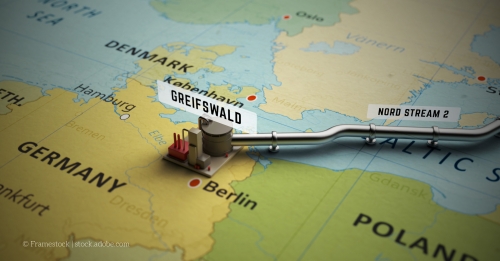
Cependant, le 19 mai 2021, le gouvernement américain a levé les sanctions contre Nord Stream AG, mais a imposé des sanctions contre quatre banques russes et cinq sociétés russes. Sergueï Ryabkov, vice-ministre russe des Affaires étrangères, a salué cette démarche et y a vu "une opportunité pour une transition progressive vers la normalisation de nos liens bilatéraux" (https://www.bbc.com/news/world-us-canada-57180674 ).
Le sénateur républicain Jim Risch a déclaré qu'une telle démarche était "un cadeau à Poutine et ne fera qu'affaiblir les États-Unis" (https://www.reuters.com/business/energy/us-waive-sanction...).
Yurity Vitrenko de Naftogaz (la compagnie pétrolière et gazière d'État ukrainienne) s'opposerait à cette démarche et affirmerait que l'Ukraine fait pression sur les États-Unis pour qu'ils réimposent des sanctions afin d'empêcher l'ouverture du pipeline. Biden prétendrait qu'il a mis fin aux sanctions parce que le pipeline était presque terminé et parce que les sanctions avaient nui aux relations entre les États-Unis et l'Union européenne.
Le président ukrainien, alors inconnu en Occident, Volodymyr Zelensky, s'est dit "surpris et déçu" par la décision de l'administration Biden, qui a également refusé de sanctionner le PDG de Nord Stream AG, Mathias Warning, un allié de Poutine.
Cependant, en juin 2021, la pose des deux lignes de pipelines a été entièrement achevée. Le 20 juillet 2021, Biden et une Angela Merkel sortante ont convenu que les États-Unis pourraient sanctionner la Russie si elle utilisait Nord Stream 2 comme une "arme politique", dans le but d'empêcher la Pologne et l'Ukraine de manquer de gaz russe.
Mme Merkel est une atlantiste avouée et n'était pas exactement enthousiaste à l'égard du projet Nord Stream 2, mais elle ne voyait aucun moyen de faire marche arrière. Pour elle, c'était une situation très délicate.
L'Ukraine obtiendrait un prêt de 50 millions de dollars pour investir dans les technologies vertes jusqu'en 2024, et l'Allemagne créerait un fonds d'un milliard de dollars pour la transition de l'Ukraine vers l'énergie verte, afin de compenser la perte de droits de douane due au fait que tout le gaz russe qui devait passer par le gazoduc Nord Stream 2 ne passerait pas par son sous-sol.
Après cette étrange hésitation, le département d'État américain prendra une décision complète et imposera, en novembre 2021, de nouvelles sanctions financières aux entreprises russes liées à Nord Stream 2.
Le 9 décembre 2021, le Premier ministre polonais Mateusz Marawiecki a fait pression sur le nouveau chancelier allemand, le social-démocrate Olaf Scholz, pour qu'il n'inaugure pas le Nord Stream 2 et ne cède pas à la pression russe, et donc "ne permette pas que le Nord Stream 2 soit utilisé comme un instrument de chantage contre l'Ukraine, comme un instrument de chantage contre la Pologne, comme un instrument de chantage contre l'Union européenne" (https://www.metro.us/polish-pm-tells-germanys/ ).
Après avoir détecté des troupes russes à la frontière orientale de l'Ukraine, le secrétaire d'État Antony Blinken a annoncé de nouvelles sanctions le 23 décembre.
Olaf Scholz serait pressé d'arrêter l'ouverture du pipeline lors du sommet de l'UE. Le 7 février 2022, il rencontrera Biden à la Maison Blanche et, lors de la conférence de presse, il déclarera que les États-Unis et l'Allemagne sont "absolument unis et nous ne prendrons pas de mesures différentes". Nous prendrons les mêmes mesures et elles seront très, très dures pour la Russie et ils doivent le comprendre. Toutes les mesures que nous prendrons, nous les prendrons ensemble. Comme l'a dit le président [Biden], nous nous y préparons. Vous pouvez comprendre et vous pouvez être absolument sûrs que l'Allemagne sera de concert avec tous ses alliés et surtout les États-Unis, que nous prendrons les mêmes mesures. Il n'y aura aucune différence dans cette situation. Je dis à nos amis américains que nous serons unis. Nous agirons ensemble et nous prendrons toutes les mesures nécessaires et toutes les mesures nécessaires que nous prendrons ensemble" (https://edition.cnn.com/2022/02/07/politics/biden-scholz-... ).
On peut voir qu'il ne se plaignait plus de l'intervention des États-Unis "dans les affaires intérieures allemandes et européennes", comme on l'a vu dire lorsqu'il était ministre des finances dans le gouvernement de coalition avec Merkel, alors que Trump était à la Maison Blanche.
Pour sa part, Joe Biden a averti que si la Russie envahit l'Ukraine, avec "des chars et des troupes", comme cela finirait par arriver, "alors il n'y aura plus de Nord Stream 2 : nous y mettrons fin" (https://edition.cnn.com/2022/02/07/politics/biden-scholz-... ).
Face aux menaces de Biden envers la Russie, Scholz a gardé un silence timide, ne disant absolument rien sur l'ingérence flagrante des États-Unis dans les relations économiques de l'Allemagne avec la Russie. Il s'est plié aux diktats de Washington.
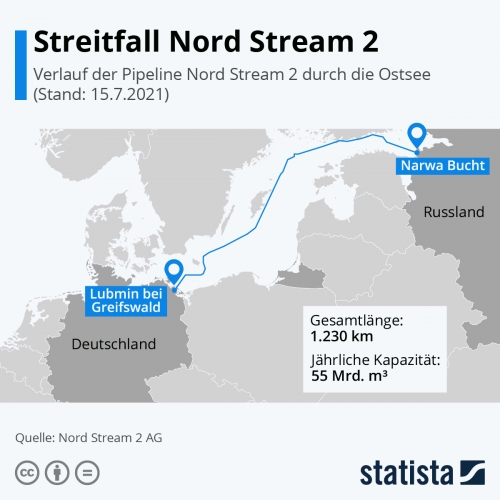
Le 15 février, Scholz devait rencontrer Poutine à Moscou, où le dirigeant russe a affirmé que le gazoduc renforcerait la sécurité énergétique européenne et qu'il s'agissait d'une question "purement commerciale" (https://www.reuters.com/business/energy/putin-says-nord-s... ). Comme si l'économie n'était pas une économie-politique et une question géopolitique de la plus haute importance et, comme nous l'avons vu, d'une transcendance vitale.
Scholz a affirmé que les négociations avaient été intenses mais confiantes et a supplié la Russie d'éviter toute interprétation dans le conflit avec l'Ukraine.
Lors de la conférence de presse, Poutine est allé jusqu'à dire : "L'Allemagne est l'un des principaux partenaires de la Russie. Nous nous sommes toujours efforcés de favoriser l'interaction entre nos États. L'Allemagne est le deuxième partenaire commercial extérieur de la Russie, après la Chine. Malgré la situation difficile causée par la pandémie de coronavirus et la volatilité des marchés mondiaux, à la fin de 2021, les échanges mutuels ont augmenté de 36 % et ont atteint près de 57 milliards. Dans les années 1970, nos pays ont mis en œuvre avec succès un projet historique. Il s'appelait "Gaz pour les tuyaux". Et depuis lors, les consommateurs allemands et européens sont approvisionnés en gaz russe de manière fiable et sans interruption. Aujourd'hui, la Russie satisfait plus d'un tiers des besoins de l'Allemagne en matière de transport d'énergie" (https://1prime.ru/exclusive/20220220/836108179.html ).
Le projet "Gaz pour les pipelines" a été possible malgré la guerre froide. Les États-Unis ont tenté d'empêcher la construction du gazoduc Urengoy-Pomary-Uzhgorod et ont également essayé d'empêcher les entrepreneurs allemands de participer au projet, bien qu'il ait finalement été construit en 1982-1984 et officiellement ouvert en France, complétant le système de transport transcontinental de gaz Sibérie occidentale-Europe occidentale qui était en place depuis 1973. Ce gazoduc traverse l'Ukraine, pompant du gaz vers la Slovaquie, la Hongrie et la Roumanie. À cette époque, l'URSS n'avait pas la capacité de produire les pipelines nécessaires. Après la construction, d'importantes livraisons de gaz en provenance de Russie ont commencé, depuis le gigantesque champ de Vengoyskoye vers l'Allemagne et d'autres pays européens. Les conséquences d'une telle quantité de gaz ont été le remplacement du charbon américain sur le marché européen, et la RFA a bénéficié d'un énorme élan économique. Nous constatons que les accords gaziers entre la Russie et l'Europe (alors l'URSS) n'ont pas profité aux États-Unis, où ils en prendraient acte.
Scholz a ensuite rencontré Zelensky, accusé d'avoir utilisé le "livre de jeu de Merkel" en évitant les questions sur le gazoduc lors de la conférence de presse qu'il a donnée avec le président ukrainien (https://www.telegraph.co.uk/news/2022/02/14/olaf-scholz-f... ).
La présidente de la Commission européenne, Ursula von der Leyen, a affirmé que l'avenir du pipeline dépendrait du comportement de la Russie en Ukraine. Le 19 février, elle a déclaré à la Conférence sur la sécurité de Munich que l'Europe ne pouvait pas être aussi dépendante de la Russie pour ses besoins énergétiques (peut-être veut-elle qu'elle soit dépendante des États-Unis, et pas seulement sur le plan énergétique mais aussi sur le plan géopolitique, ce qui est la conséquence logique). "Une Union européenne forte ne peut pas être aussi dépendante d'un fournisseur d'énergie qui menace de déclencher une guerre sur notre continent. Nous pouvons imposer des coûts élevés et des conséquences graves sur les intérêts économiques de Moscou. La pensée bizarre du Kremlin, qui découle directement d'un passé sombre, pourrait coûter à la Russie un avenir prospère. Nous espérons encore que la diplomatie n'a pas dit son dernier mot" (https://www.dw.com/en/natos-jens-stoltenberg-urges-russia... ).
Le 22 février, le lendemain de la reconnaissance par la Russie des républiques populaires de Donetsk et de Lougansk, Olaf Scholz, qui a toujours été favorable au projet mais qui venait de voir Biden (alors qu'il devait rendre visite à Poutine immédiatement après), a suspendu la certification de Nord Stream 2. <...> Il s'agit d'une étape nécessaire pour que la certification du pipeline ne puisse avoir lieu maintenant. Sans cette certification, Nord Stream 2 ne peut être lancé" (https://www.vedomosti.ru/economics/articles/2022/02/22/91... ). La ministre allemande des Affaires étrangères, Annalena Berbock, a déclaré aux journalistes que le gouvernement allemand avait "gelé" le projet.
Le 23 février, M. Biden a ordonné des sanctions contre l'exploitant du gazoduc, Nord Stream 2 AG, ainsi que contre des responsables de la société. "Ces mesures sont une autre partie de notre tranche initiale de sanctions en réponse aux actions de la Russie en Ukraine. Comme je l'ai dit clairement, nous n'hésiterons pas à prendre de nouvelles mesures si la Russie poursuit l'escalade." Ces sanctions ont été imposées après des "consultations étroites" entre les gouvernements américain et allemand. Et il a remercié Scholz pour son "étroite coopération et son engagement inébranlable à tenir la Russie responsable de ses actions" ; en d'autres termes, il l'a remercié pour sa soumission aux États-Unis. En reconnaissant les républiques populaires de Donetsk et de Lougansk, Poutine, a déclaré Biden, "a donné au monde une incitation irrésistible à abandonner le gaz russe et à passer à d'autres formes d'énergie" (https://www.rbc.ru/politics/23/02/2022/621684c49a794730b4... ).
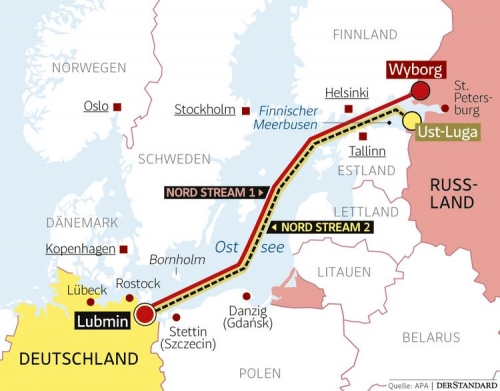
Le jour suivant, la Russie commencera une "opération militaire spéciale" en Ukraine. Les États-Unis avaient donc déjà la guerre qu'il leur fallait pour empêcher l'ouverture du gazoduc Nord Stream 2 et la rupture des relations germano-russes ; même si Nord Stream 1 continuerait à transporter du gaz vers l'Allemagne, fonctionnant comme les autres gazoducs approvisionnant l'Europe, dont la Russie empoche quelque 800 millions d'euros par jour, plus 260 millions d'euros pour l'exportation de pétrole.
Le 8 mars, les États-Unis ont interdit toute importation de pétrole et de gaz en provenance de Russie, établissant un record historique pour le prix de l'essence (7 % du pétrole consommé aux États-Unis est russe).
Le 9 mars, le secrétaire de presse du président russe, Dmitry Preskov, a répondu à la sous-secrétaire d'État américaine aux affaires politiques, Victoria Nuland - la femme qui a dit "fuck the EU" (https://www.youtube.com/watch?v=dO80WVMy5E4&ab_channe... ), en déclarant que Nord Stream 2 est "mort et ne sera pas ressuscité" (un jour plus tôt, devant le Congrès américain, elle avait déclaré que le gazoduc n'est qu'"un tas de métal au fond de la mer") - en lui disant que le gazoduc est prêt à être utilisé, en ajoutant que les États-Unis déclarent la guerre économique à la Russie.
Un différend géo-économique et donc géopolitique
Plutôt qu'un projet d'infrastructure dans le pouvoir fédérateur (ou le commerce international) des couches corticales des États concernés, Nord Stream 2 ressemble davantage à un symbole de discorde dans le pouvoir diplomatique, voire militaire, que l'on observe en Ukraine. Il ne fait aucun doute que Nord Stream 2 et tous les gazoducs et oléoducs entraînent des problèmes géopolitiques, car les ressources de base sont intégrées dans les problèmes corticaux de la dialectique des États (l'économie est toujours l'économie-politique ; c'est-à-dire que les deux ne peuvent être compris comme des sphères mégaréales mais comme des concepts conjugués : conceptuellement dissociables, existentiellement inséparables).
Sans aucun doute, comme on l'accuse à juste titre, la Russie utilise sa puissance énergétique comme une arme géopolitique et géostratégique, tout comme les États-Unis. En effet, cette puissance russe est énorme. En additionnant les exportations de pétrole, de gaz et de charbon, la Russie serait le premier exportateur mondial de ces produits.
Si Nord Stream 2 avait été mis en œuvre, les États-Unis auraient perdu leur influence sur l'UE et aussi sur l'Ukraine. Cela rendrait les pays européens, notamment l'Allemagne, encore plus dépendants des ressources énergétiques russes. Certains de ces pays et bien sûr le meneur de la bande, les États-Unis, ont pris position contre la construction de ce pipeline. L'Ukraine est considérée comme l'une des économies les plus touchées si le Nord Stream 2 est mis en service, car une grande quantité de matières premières en provenance de Russie ne passerait plus par son sous-sol (bien que cela affecte également le Belarus, allié plutôt vassal de la Russie).
Les Russes affirment qu'avec Nord Stream 2, le prix du gaz baisserait, car quelque 55 milliards de mètres cubes de gaz seraient transportés par an (plus ou moins la même quantité que Nord Stream 1). Il ne faut pas oublier qu'un peu plus d'un tiers du gaz qui atteint l'Europe provient de Russie.
En Espagne, seulement 10 % du gaz que nous recevons est russe. L'Algérie (alliée historique de la Russie) est notre principal exportateur de gaz (30 % de son gaz finit en Espagne), et le gouvernement de Pedro Sánchez ne fait pas vraiment preuve de tact diplomatique avec ce pays ; il le traite même avec une extrême insouciance, cédant le Sahara au Maroc (abandonnant pour la deuxième fois les pauvres Sahraouis). C'est peut-être la récompense que le sultanat a reçue pour avoir reconnu Israël. Mais puisqu'en Espagne, depuis plusieurs décennies, la politique étrangère est une trahison continue plutôt qu'une politique étrangère ?
Regardez ce que dit le rapport 2019 de l'important groupe de réflexion américain RAND Corporation : "Augmenter la capacité de l'Europe à importer du gaz de fournisseurs autres que la Russie pourrait étirer la Russie sur le plan économique et protéger l'Europe de la coercition énergétique russe. L'Europe avance lentement dans cette direction en construisant des usines de regazéification de gaz naturel liquéfié (GNL). Mais pour être vraiment efficace, cette option nécessiterait que les marchés mondiaux du GNL deviennent plus flexibles qu'ils ne le sont déjà et que le GNL devienne plus compétitif en termes de prix par rapport au gaz russe" (https://www.rand.org/pubs/research_briefs/RB10014.html ).
L'Allemagne verrait sa sécurité énergétique menacée si Nord Stream 2 n'est pas mis en service. Et il ne faut pas oublier que ce projet a été construit à l'initiative de Berlin et non de Moscou. Et pourtant, l'Allemagne s'est rangée du côté de l'Ukraine (se pliant ainsi aux diktats de l'empire de Washington).
Mais il faut garder à l'esprit qu'avec Nord Stream 2, la relation entre la Russie et l'Allemagne ne serait pas exclusivement une relation de dépendance de la seconde vis-à-vis de la première, puisque la Russie dépendrait également de l'Allemagne, c'est-à-dire qu'une relation de coopération serait établie, ce que les États-Unis ne veulent pas. Et l'Allemagne distribuerait à son tour le gaz qui arrive de Russie aux autres pays.
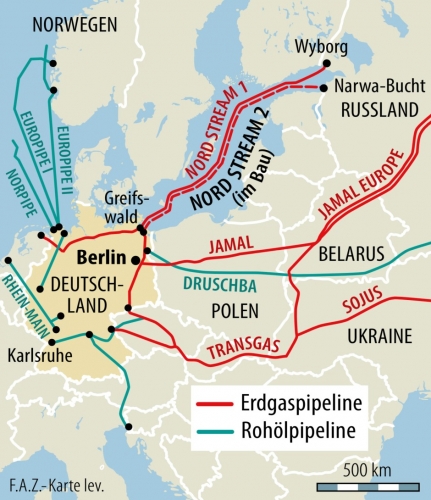
Le problème serait que si ce gazoduc commence à pomper du gaz, les États-Unis pourraient alors perdre la vassalité de l'Allemagne et d'autres pays européens. Les États-Unis ont toujours essayé d'empêcher les relations commerciales entre l'Allemagne et la Russie de s'épanouir (comme ils l'ont fait lorsqu'il s'agissait de la RFA et de l'URSS, comme nous l'avons vu).
D'où les plaintes de Biden (ainsi que celles de Trump, et déjà celles d'Obama), car les États-Unis veulent à tout prix empêcher l'ouverture de Nord Stream 2. Ce gazoduc n'aiderait-il pas la Russie à consolider le leadership allemand dans l'UE ? Bien qu'historiquement, malgré Napoléon, la Russie a eu de meilleures relations avec la France. Et les Russes n'oublient certainement pas les deux guerres mondiales, en particulier la Grande Guerre patriotique.
L'Allemagne a fait valoir que Nord Stream 1 n'empêchait pas le Reich d'adopter une ligne dure contre l'expansionnisme russe. Et, élément crucial, que les États-Unis se sont opposés au projet parce qu'ils voulaient vendre davantage de gaz naturel liquéfié sur les marchés européens (cela résume l'intrigue).
Près d'un quart de la consommation énergétique de l'UE est constituée de gaz naturel, dont un tiers provient de Russie, les pays de l'Est étant évidemment plus dépendants de ce gaz. L'UE obtient 40 % de son gaz de la Russie, ainsi que 27 % de son pétrole. Les États-Unis ne reçoivent pas de gaz russe, bien que - comme nous l'avons déjà dit - ils reçoivent 7 % de leur pétrole (qu'ils ont maintenant l'intention de remplacer par du pétrole vénézuélien). Le 25 mars 2022, l'UE a signé un accord dans lequel les États-Unis fourniront 15 milliards de mètres cubes de gaz liquéfié au marché européen cette année. Et entre maintenant et 2030. Mission accomplie : l'Europe courbe la tête devant son serviteur.
Et comment les États-Unis peuvent-ils se permettre de freiner un projet entre deux nations souveraines derrière un chantier pharaonique à des milliers de kilomètres de distance ? Se pourrait-il que l'Allemagne, qui avec la France dirige l'UE, ne soit rien d'autre qu'un vassal des États-Unis, même si elle a maintenant l'intention de se réarmer ? Et si l'axe franco-allemand est un vassal des États-Unis, l'Espagne, l'Espagne délaissée, ne sera-t-elle pas un vassal des vassaux ? Quoi qu'il en soit, les États-Unis se sont comportés envers l'Allemagne comme le gangster extorqueur : celui qui oblige les commerçants sous la menace d'une arme à acheter ses marchandises. Puis, armés d'un visage en diborure de titane, ils appellent cela un "marché libre".
Selon un rapport de la Commission européenne intitulé "EU-US LNG trade", en 2021, le record d'approvisionnement en gaz naturel liquéfié (GNL) des États-Unis vers l'UE a été battu, dépassant les 22 milliards de mètres cubes. En janvier 2022, elle a déjà atteint 4,4 milliards de mètres cubes (si elle continue à ce rythme, elle atteindra plus de 50 milliards). Mais cela ne suffit pas pour les États-Unis. Bien que la Commission européenne soit favorable à ce que les Yankees soient les principaux fournisseurs de gaz naturel sur le marché européen.
Au vu de tout cela, on pourrait dire que les États-Unis ont fomenté une guerre en Ukraine afin de restreindre la coopération économique de l'UE avec la Russie, ce qui va à l'encontre des intérêts de l'Union, qui s'est comportée dans cette crise comme un ensemble d'États vassaux de Washington ; ce qui est le cas depuis longtemps, pratiquement depuis la Seconde Guerre mondiale, sauf que cela apparaît maintenant de manière embarrassante.
Dans une interview avec Jacques Baud, colonel de l'armée suisse, expert en renseignement militaire et député à l'OTAN et à l'ONU, il a déclaré : "Je suis sûr que Poutine ne voulait pas attaquer l'Ukraine, il l'a dit à plusieurs reprises. De toute évidence, les États-Unis ont exercé des pressions pour déclencher la guerre. Les États-Unis ont peu d'intérêt pour l'Ukraine elle-même. Ce qu'ils voulaient, c'était augmenter la pression sur l'Allemagne pour qu'elle ferme Nord Stream II. Ils voulaient que l'Ukraine provoque la Russie, et si la Russie réagissait, Nord Stream II serait gelé" (https://www.lahaine.org/mundo.php/militar-suizo-experto-d... ).
Le Royaume-Uni semble également devoir bénéficier de son statut de pays de "transit" pour l'approvisionnement en gaz naturel de l'Europe, via le gazoduc traversant la Belgique et les Pays-Bas, qui tentera de se sevrer de sa dépendance au gaz russe, comme le prévoit pour cet été le seul opérateur énergétique britannique qui collecte le gaz de la mer du Nord en Norvège : National Grid. Selon le Daily Telegraph, National Grid pense pouvoir exporter environ 5,1 milliards de m3 vers l'Europe cet été. Elle envisage également d'importer du gaz liquéfié des États-Unis au Royaume-Uni pour le transformer en gaz normal et l'exporter en Europe.
En raison de l'opération militaire russe dans la marine des pays de l'OTAN (pas tous) en Ukraine, la non-ouverture de Nord Stream 2 n'a pas divisé les pays européens, comme ce fut le cas en 2003 avec la guerre en Irak, même si le Royaume-Uni a quitté l'UE. Il semble y avoir un consensus anti-russe (la Hongrie anti-sorosienne est peut-être l'exception, quoique de manière ambiguë).
Pour gagner l'alliance de la Russie contre la Chine, ni l'administration Trump (ce qui était son intention) ni l'administration Biden (qui a montré au monde sa russophobie exacerbée, dans la lignée du trilatéraliste-rockefellerien polonais et américain Zbigniew Brzezinski) n'ont su agir avec tact diplomatique. Et ils devraient savoir que les alliances sont aussi importantes que les forces elles-mêmes. C'est pourquoi la Russie a conquis l'allié chinois, mais toujours avec la crainte que ce dernier ne l'absorbe ou ne la trahisse à un moment donné (l'hypocrisie est notre pain quotidien dans les relations internationales).
L'humiliation du président allemand par Zelensky
Pendant des années, le président allemand Frank-Walter Steinmeier a entretenu une relation cordiale avec Vladimir Poutine, dont il a fait l'éloge en tant que chancelier sous Gerhard Schröder, puis en tant que ministre des affaires étrangères sous Angela Merkel. Et il a également montré son plus grand soutien au projet Nord Stream 2 pendant ces années, jusqu'à juste avant la guerre, ce que, après l'entrée des troupes russes en Ukraine, le chef d'État allemand a admis comme une "erreur manifeste". Une erreur qu'il a entretenue pendant des années, presque une décennie ? Après la diffusion sur Twitter de photos de M. Steinmeier embrassant le ministre russe des Affaires étrangères, Sergueï Lavrov, le président a exprimé ses remords. Pour cela, il ne serait pas le bienvenu à Kiev, et a dû annuler sa visite : "Il semble que ma présence ne soit pas souhaitée" (https://www.elmundo.es/internacional/2022/04/12/6255a91f2... ). "Nous n'avons pas réussi à créer une maison européenne commune qui inclut la Russie. Nous n'avons pas réussi à inclure la Russie dans l'architecture de sécurité globale. Nous nous sommes accrochés à des ponts auxquels la Russie ne croyait plus, comme nos partenaires nous en avaient avertis" (https://ria.ru/20220404/evropa-1781787894.html ). Tout cela montre la honteuse servilité de l'Allemagne envers les États-Unis.
L'ambassadeur ukrainien à Berlin, Andriy Melnyk, poursuit en soulignant que l'Allemagne a "trop d'intérêts particuliers" en Russie et que Steinmeier est en grande partie à blâmer, car il a passé des décennies à tisser une toile d'araignée de contacts avec la Russie (tout comme Merkel, avec qui Poutine a parlé en russe et en allemand). "Beaucoup de ceux qui sont maintenant en charge dans la coalition (allemande) sont impliqués dans cette affaire" (https://www.elmundo.es/internacional/2022/04/12/6255a91f2... ).
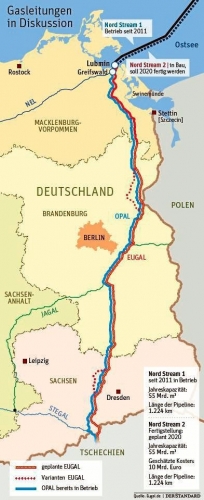
Le porte-parole adjoint du gouvernement allemand, Wolfgang Büchner, a calmé les esprits en comprenant "la situation exceptionnelle" que traverse l'Ukraine. Il a déclaré que "l'Allemagne a été et est l'un des plus ardents défenseurs de l'Ukraine... et continuera de l'être. Le président a une position claire et sans équivoque en faveur de l'Ukraine" (https://www.elespanol.com/mundo/europa/20220413/zelenski-... ).
Dans le magazine allemand Spiegel, Steinmeier a rappelé qu'en 2001, Poutine avait prononcé un discours en allemand au Bundestag même : "Le Poutine de 2001 n'a rien à voir avec le Poutine de 2022, que nous voyons maintenant comme un fauteur de guerre brutal et retranché" (https://www.elespanol.com/mundo/europa/20220413/zelenski-... ). Et qu'il attendait toujours "un reste de rationalité de la part de Vladimir Poutine" (https://www.spiegel.de/politik/frank-walter-steinmeier-ue... ).
Mais nous avons déjà montré de manière assez puissante dans les pages du Postmodernisme, en réfléchissant contre l'hystérie des politiciens et des journalistes, que Poutine n'est pas fou : https://posmodernia.com/putin-esta-loco/ .
20:22 Publié dans Actualité, Affaires européennes, Géopolitique | Lien permanent | Commentaires (0) | Tags : géopolitique, politique internationale, allemagne, russie, ukraine, états-unis, nord stream 2, gazoducs, gaz, gaz naturel, hydrocarbures, mer baltique |  |
|  del.icio.us |
del.icio.us |  |
|  Digg |
Digg | ![]() Facebook
Facebook
dimanche, 24 avril 2022
Jeffrey Sachs : l'arrêt de l'élargissement de l'OTAN est le chemin vers la paix
Jeffrey Sachs : l'arrêt de l'élargissement de l'OTAN est le chemin vers la paix
Markku Siira
Source: https://markkusiira.com/2022/04/21/jeffrey-sachs-naton-laajentumisen-pysayttaminen-tie-rauhaan/
On observe un changement intéressant parmi les universitaires américains: alors qu'auparavant, seuls les réalistes (comme le politologue John Mearsheimer) tenaient l'OTAN pour responsable de la crise actuelle en Ukraine, désormais, même les mondialistes comme Jeffrey Sachs reconnaissent que c'est exactement le cas. Sachs explique son point de vue dans un éditorial pour CNN.
Sachs estime que la stratégie américaine "visant à aider l'Ukraine à vaincre l'agression russe en imposant des sanctions sévères et en fournissant à l'armée ukrainienne des armes de pointe" a peu de chances de réussir.
L'économiste américain estime que la seule solution est un accord de paix négocié. "Toutefois, pour parvenir à un accord, les États-Unis devraient faire des compromis sur l'OTAN, ce que Washington a rejeté jusqu'à présent."
Selon la Russie, les négociations sont dans l'impasse. Avant de lancer son opération militaire, Poutine a présenté à l'Occident une liste de demandes, dont notamment "l'arrêt de l'expansion de l'OTAN". Les États-Unis n'ont pas voulu s'engager dans cette voie, mais M. Sachs estime que le moment est venu de "revoir cette politique".
Sachs se rapproche de la position des réalistes en matière de politique étrangère et de sécurité. Selon lui, "l'approche américaine en matière de transferts d'armes et de sanctions" peut sembler convaincante "dans la chambre d'écho de l'opinion publique américaine, mais elle ne fonctionne pas sur la scène mondiale". Selon M. Sachs, même aux États-Unis et en Europe, les sanctions bénéficient d'un "faible soutien" et un "retour de bâton politique" pourrait encore se produire.
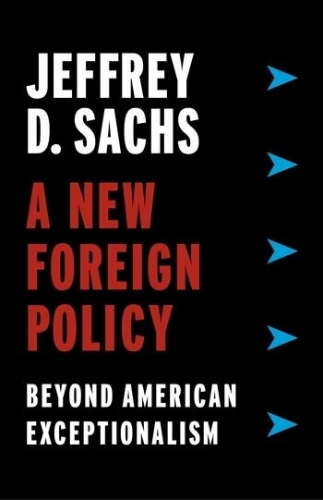
En Occident, il a été considéré comme acquis que l'action militaire en Ukraine mettrait la Russie dans la position d'un pion exclu. Selon Sachs, ce n'est pas le cas : les pays émergents en particulier ont refusé de se joindre à la campagne de l'Occident visant à isoler la Russie.
Cet échec s'est traduit tout récemment par le vote dirigé par les États-Unis visant à exclure la Russie du Conseil des droits de l'homme de l'ONU. "Il est vrai que 93 pays ont soutenu la démarche, mais 100 autres ne l'ont pas fait (24 se sont opposés, 58 se sont abstenus et 18 n'ont pas voté du tout). Plus important encore, 76 % de la population mondiale vit dans ces 100 pays".
La politique de sanctions américaines présente une "myriade de problèmes", selon l'économiste.
La première est que "si les sanctions causeront des difficultés économiques en Russie, il est peu probable qu'elles modifient la politique russe de manière décisive".
"Pensez aux sanctions sévères imposées par les États-Unis au Venezuela, à l'Iran et à la Corée du Nord", suggère Sachs. "Ils ont affaibli l'économie de ces pays, mais n'ont pas modifié leurs politiques de la manière souhaitée."
Deuxièmement, "les sanctions sont faciles à contourner, du moins en partie, et d'autres contournements sont susceptibles d'apparaître au fil du temps". Les sanctions américaines s'appliquent le plus efficacement aux "transactions en dollars impliquant le système bancaire américain".
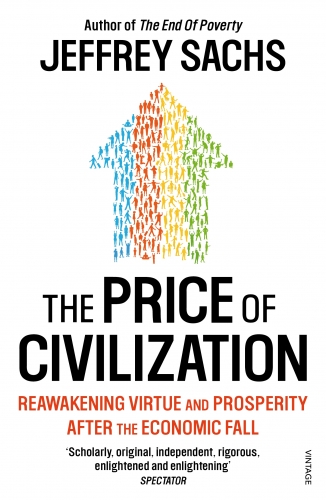
Les pays qui cherchent à contourner les sanctions trouveront des moyens de faire des affaires par des moyens autres que la banque ou le dollar. "Nous pouvons nous attendre à voir une augmentation du nombre de transactions en roubles, roupies, renminbis et non-dollars avec la Russie", prédit Sachs.
Le troisième problème, selon Sachs, est que la majeure partie du monde ne croit pas aux sanctions. "Lorsque vous additionnez tous les pays et territoires qui ont imposé des sanctions à la Russie - les États-Unis, le Royaume-Uni, l'Union européenne, le Japon, Singapour, l'Australie, la Nouvelle-Zélande et quelques autres pays - leur population combinée ne représente que 14 % de la population mondiale."
Le quatrième problème est "l'effet boomerang". Les sanctions à l'encontre de la Russie ne feront pas seulement du tort à la Russie, mais à l'ensemble de l'économie mondiale, entraînant une augmentation des perturbations de la chaîne d'approvisionnement, de l'inflation et des pénuries alimentaires. C'est pourquoi de nombreux pays européens continuent d'importer du gaz et du pétrole de Russie. "L'effet boomerang est également susceptible de nuire aux démocrates lors des élections de mi-mandat de novembre, car l'inflation ronge les revenus réels des électeurs", estime Sachs.
Un cinquième problème est "la demande inélastique et sensible aux prix des exportations russes d'énergie et de céréales". La chute des exportations russes entraînera une hausse des prix mondiaux de ces matières premières. La Russie pourrait se retrouver avec des volumes d'exportation plus faibles mais des revenus d'exportation presque identiques, voire plus élevés.
Le sixième problème énuméré par Sachs est - surprise, surprise - géopolitique. "D'autres pays - et surtout la Chine - voient la guerre Russie-Ukraine au moins en partie comme une guerre dans laquelle la Russie s'oppose à l'expansion de l'OTAN en Ukraine. C'est pourquoi la Chine soutient sans cesse que la guerre concerne les intérêts légitimes de la Russie en matière de sécurité", explique Sachs.
Les États-Unis aiment dire que l'OTAN est une "alliance purement défensive", mais la Russie, la Chine et bien d'autres pays ne sont pas d'accord. Sachs sait pourquoi. "Ils sont sceptiques quant aux bombardements de l'OTAN en Serbie en 1999, aux forces de l'OTAN en Afghanistan pendant 20 ans après le 11 septembre et aux bombardements de l'OTAN en Libye en 2011, lorsque Mouammar Kadhafi a été renversé."
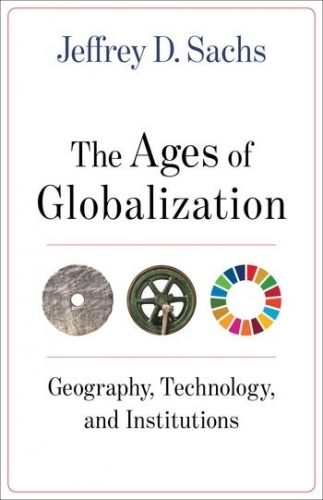
Les dirigeants russes s'opposent à l'expansion de l'OTAN vers l'est depuis qu'elle a commencé au milieu des années 90 avec la République tchèque, la Hongrie et la Pologne. De façon remarquable, lorsque Poutine a demandé à l'OTAN de mettre fin à son expansion en Ukraine, Biden a refusé catégoriquement de négocier avec la Russie.
De nombreux pays dans le monde, y compris une Chine montante, ne soutiennent pas une pression sur la Russie qui pourrait conduire à une expansion de l'OTAN. "Le reste du monde veut la paix, pas la victoire des États-Unis ou de l'OTAN dans une lutte de pouvoir avec la Russie", affirme Sachs.
Les États-Unis aimeraient voir Poutine vaincu militairement, mais il est peu probable que la Russie accepte la défaite et se retire. Les armes des États-Unis et de l'OTAN peuvent imposer des coûts énormes à la Russie, mais elles ne peuvent pas sauver l'Ukraine, qui sera détruite dans le processus, d'autant plus que l'Occident prolonge la crise.
Sachs affirme que l'approche actuelle "sape la stabilité économique et politique dans le monde et peut diviser le monde en camps pro-OTAN et anti-OTAN, ce qui est profondément dommageable à long terme, y compris pour les États-Unis eux-mêmes".
La diplomatie américaine punit donc la Russie, mais a peu de chances de réussir réellement en Ukraine, "en termes d'avancement des intérêts américains". Le véritable succès serait que les troupes russes rentrent chez elles et que la situation en Ukraine se stabilise. Ces résultats peuvent être obtenus à la table des négociations.
L'étape la plus importante, selon Saschi, serait que "les États-Unis, les alliés de l'OTAN et l'Ukraine fassent clairement savoir que l'OTAN ne s'étendra pas en Ukraine". Ensuite, les pays alignés sur Poutine et ceux qui ne prennent aucun parti diraient que "puisque Poutine a arrêté l'expansion de l'OTAN, il est maintenant temps pour la Russie de quitter le champ de bataille et de rentrer chez elle".
Sachs est convaincu que le discours musclé de Biden sur "le retrait de Poutine du pouvoir, le génocide et les crimes de guerre" ne sauvera pas l'Ukraine. "En donnant la priorité à la paix plutôt qu'à l'expansion de l'OTAN, les États-Unis gagneraient le soutien d'une plus grande partie du monde et contribueraient ainsi à apporter la paix en Ukraine et la stabilité dans le monde", estime-t-il.
Pour l'instant du moins, Washington ne partage pas l'avis de Sachs, mais un "soutien militaire plus direct" - artillerie lourde et drones - est toujours prévu pour l'Ukraine. Pendant ce temps, les Russes ont complètement encerclé les forces ukrainiennes dans la ville de Mariupol, dans la zone de l'usine Azovstal. Un tournant décisif sera-t-il bientôt atteint ?
13:30 Publié dans Actualité, Affaires européennes | Lien permanent | Commentaires (0) | Tags : jeffrey sachs, actualité, ukraine, russie, états-unis, sanctions, politique internationale |  |
|  del.icio.us |
del.icio.us |  |
|  Digg |
Digg | ![]() Facebook
Facebook
Maurizio Murelli, éditeur de Douguine : "Voilà ce qui se cache derrière le conflit en Ukraine"
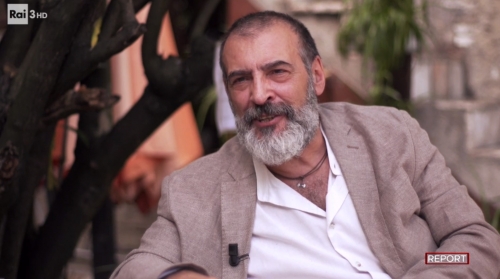
Maurizio Murelli, éditeur de Douguine : "Voilà ce qui se cache derrière le conflit en Ukraine"
Propos recueillis par Umberto Baccolo
Maurizio Murelli est un homme qui a le courage de ses idées, aussi impopulaires soient-elles et quel que soit le prix à payer, et depuis les années 1980, il mène une bataille culturelle et politique pour les diffuser. Anti-libéral, anti-américain, il est issu de la droite radicale, un milieu dans lequel il jouit encore d'un grand crédit, mais qu'il a depuis longtemps abandonné pour d'autres rivages : en particulier, la Quatrième théorie politique d'Alexandre Douguine, le philosophe et politologue russe que Murelli invite à parler en Italie depuis le début des années 1990 et qu'il traduit et publie ici. Il l'a d'abord fait avec sa propre Società Editrice Barbarossa et le magazine associé Orion, et maintenant avec AGA Editrice, qui a pris leur place.
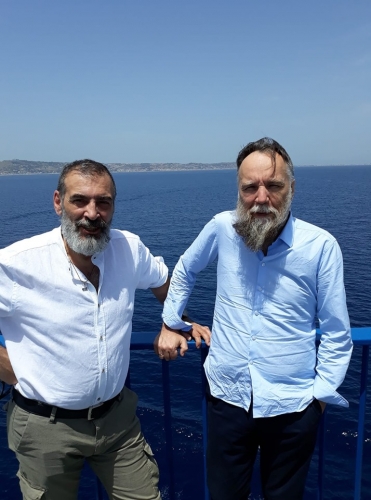
Murelli, comme Douguine, est l'un des rares intellectuels qui, dans ce conflit en Ukraine, se range ouvertement du côté des Russes, sans demi-mesure ni circonlocutions verbales. Dans cette longue interview, il explique en détail pourquoi, racontant ce qu'il n'a pas eu le temps d'expliquer complètement lorsqu'il était récemment invité à la télévision en prime time sur Rete4. Si, après avoir lu l'interview, vous êtes curieux de connaître sa figure atypique, je vous renvoie au film documentaire "Maurizio Murelli - Non siamo caduti d'autunno", que j'ai réalisé en 2020 et qui peut être visionné gratuitement sur YouTube, une chaîne où il a enregistré un certain nombre de visites.
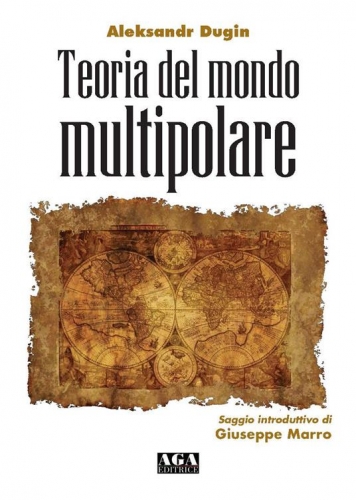
Dans votre analyse très suivie sur Facebook, vous expliquez que la vraie guerre n'est pas celle de l'Ukraine, car elle n'est qu'un front dans un affrontement plus vaste. Pouvez-vous expliquer ce que vous entendez par là et quels sont les véritables éléments en jeu ?
L'Ukraine est un champ de bataille de la Grande Guerre mondiale à laquelle les États-Unis ont donné un nouvel élan et une accélération dans les années 1990 afin d'imposer leur ordre mondial au monde, se concevant, depuis leur naissance, comme la véritable Jérusalem terrestre, leur peuple comme le véritable "peuple élu" dont la mission messianique est de racheter toute l'humanité. Cette vision qui est la leur est bien expliquée par John Kleeves dans le livre "A Dangerous Country" qu'en tant qu'éditeur j'ai publié pour la première fois en 1998 et ai réédité chez AGA Editrice en 2017. Pour être plus précis, la Grande Guerre mondiale pour la conquête du monde a commencé bien avant les années 1990, lorsque - faisant passer la doctrine Monroe d'une échelle continentale à une échelle mondiale - ils sont intervenus en Europe pendant la Première Guerre mondiale, ce qui a permis aux États-Unis d'être décisifs dans la rédaction du traité de Versailles avec lequel ils ont élaboré une première ébauche du nouvel ordre mondial redessinant, de mèche avec les Britanniques, la géographie de l'Europe et aussi de l'Afrique. Ils ont franchi une nouvelle étape avec la Seconde Guerre mondiale, dans laquelle ils sont intervenus via le Pacifique. À cette époque, leur principal intérêt était d'établir leur propre domination dans la zone Pacifique en désintégrant le Japon. La dynamique liée au jeu des alliances a amené les États-Unis sur le théâtre de guerre européen qu'ils ont colonisé à la fin de la guerre. Et voici le Pacte deYalta, qui constitue pour les États-Unis une sorte d'"image fixe" dans leur progression vers l'établissement de leur propre domination mondiale. Les États-Unis se sont retrouvés libérés du pacte de Yalta à la fin des années 1980 avec l'implosion de l'URSS et après avoir réduit le Panama, qui voulait nationaliser le canal, à une peau de chagrin en arrêtant et traînant le président Noriega enchaîné dans sa propre prison ; ils ont commencé leurs guerres au Moyen-Orient, d'abord en parrainant la guerre contre l'Iran, puis en intervenant directement en Irak, puis en Syrie, en Somalie, en Libye et même en Europe contre la Serbie. Tous ces États étaient, avant les années 1990, alliés ou sous le parapluie protecteur de l'URSS. Ils ont promu la guerre de vingt ans contre l'Afghanistan tandis que, par diverses flatteries, ils ont incorporé dans l'OTAN - la feuille de vigne de l'armée américaine - plus ou moins tous les pays de l'ancien Pacte de Varsovie. L'Ukraine est restée à l'extérieur. Par le biais de diverses "révolutions colorées", ils ont tenté de miner de l'intérieur tous les autres États qui n'avaient pas encore été subjugués, jusqu'au coup d'État de Maidan en Ukraine. Il faudrait être myope ou de mauvaise foi, mais il faudrait aussi être un idiot cognitif, pour ne pas voir le schéma global de cette guerre mondiale, asymétrique et menée aussi avec des armes commerciales et des sanctions, souvent contre les Etats les plus faibles, comme ceux d'Afrique, où les Américains se présentent avec le Colt et le chéquier, pour les soumettre, d'une manière ou d'une autre, à leur propre domination. C'est dans ce cadre, certainement décliné en complot par les pontes, que je soutiens que l'Ukraine n'est qu'un des nombreux champs de bataille de la grande guerre biséculaire.
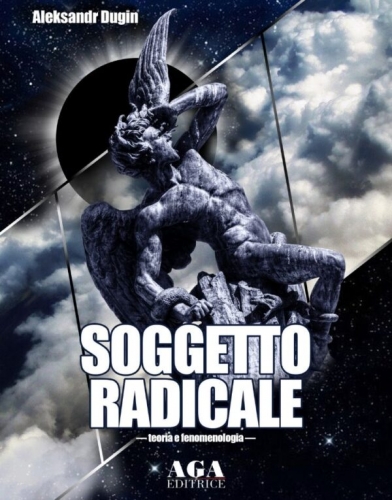
Vous avez longtemps pris vos distances avec la zone dite de la droite radicale, mais il est intéressant de noter que, tout comme dans la gauche radicale, cette situation a produit la plus violente fracture interne depuis longtemps. À votre avis, quelle en est la raison, car cette même crise russo-ukrainienne a créé des divisions aussi nettes et féroces entre les héritiers des idéologies du 20e siècle ?
Tant la "droite radicale" que la "gauche radicale" ne sont que les déchets des orthodoxies idéologiques de la première moitié du 20e siècle, des résidus humains qui vivent depuis des décennies sur des malentendus et des illusions. Tant la "droite" que la "gauche" ne sont pas les antagonistes du libéralisme, mais en sont l'expression directe. Ils sont progressivement conquis et enivrés par les valeurs libérales et à la fin, rayés de la carte, ils rivalisent entre eux pour être plus libéraux que les libéraux déclarés. La gauche vit un véritable psychodrame. La Russie, berceau du communisme inversé, a brisé la propre certitude centrée sur l'inéluctabilité du cours historique tel que conçu par la gauche. Dans leur album de famille, il y a l'oncle Lénine qui est renié et reste seul comme une momie emblématique sur la Place Rouge. Pour eux, il était inéluctable que le Quatrième État, celui du prolétariat, batte le Troisième État, celui de la bourgeoisie et du capitalisme. C'est le contraire qui s'est produit. Pour l'essentiel, l'aile gauche a d'abord répudié le communisme, puis a recherché de nouvelles échelles de valeurs progressistes, toutes raffinées et essentiellement individualistes. Au point que si vous mettez une centaine de gauchistes devant vous, il n'y en a pas deux qui puissent se superposer, c'est-à-dire qu'ils auraient la même idée de comment être de gauche. Et en fait, ils sont tous en conflit les uns avec les autres pour revendiquer l'authentique "forme de la gauche". Mais je dois m'arrêter ici, car toute la question serait trop longue à expliquer. Les événements en cours en Ukraine obligent la "droite" et la "gauche" à prendre parti, tout en restant discrets sur la question. Et si la "droite" et donc les divers néo-fascismes s'enlisent sur un terrain romantique en étant fascinés par les runes et les croix gammées dextrogyres, la gauche, et même ceux qui se sont déclarés communistes, deviennent des serviteurs objectifs de l'impérialisme atlantiste qu'ils ne reconnaissent pas comme tel, tandis qu'en définissant la Fédération de Russie comme un empire, ils ne l'acceptent pas comme tel. Il y a aussi une sorte de ressentiment irrépressible envers la Russie pour la façon dont elle est passée du communisme à autre chose. Et ils sont fascinés par l'idée de résistance et autres bêtises du genre. Je salue avec un énorme plaisir cette désintégration idéologique de la droite et de la gauche, du communisme et du fascisme. Le champ des malentendus est en train d'être nettoyé. Je suis heureux de les voir se tenir côte à côte sur le même front pour défendre les valeurs libérales, l'atlantisme et l'impérialisme atlantique. En restant sur cette position, ils débarrassent le champ des cadavres idéologiques en faveur de ceux qui se sont depuis longtemps libérés des malentendus, en faveur de ceux qui adoptent aujourd'hui une véritable position révolutionnaire et donc une fonction antilibérale.
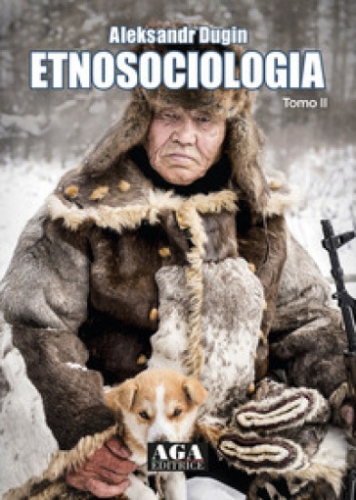
Pour en revenir à la question précédente, j'ai l'impression que beaucoup de gens, à commencer par Poutine lui-même et même Douguine qui parle de nazis et de dénazification, ont tendance à vouloir adapter cette situation à un affrontement entre les anciennes idéologies, où l'on ne sait plus très bien qui sont les nazis et qui sont les communistes. Je pense que cette façon de voir les choses est vieille et inefficace, cependant, que ce qui est en jeu n'est pas le fascisme et le communisme, qu'en pensez-vous ?
Tout d'abord, il faut partir du fait que les terminologies, et donc les langues, utilisées en Occident et celles utilisées en Orient, ce qui vaut également pour la Chine, l'Inde, etc., ne sont pas superposables car elles sont différentes. Pour les détenteurs du pouvoir, les terminologies doivent agir sur ce qu'on appelle l'imaginaire collectif, et les imaginaires en Orient sont différents de ceux qui circulent en Occident. Dans l'imaginaire collectif russe, le nazisme est l'idéologie qui a tenté d'anéantir l'identité russe et qui a fait 26 millions de victimes russes. La Seconde Guerre mondiale se décline en guerre patriotique, c'est-à-dire en guerre pour la défense de l'identité russe que les nazis voulaient nier. Ainsi, en se mettant au service de l'atlantisme, les Ukrainiens ont en fait sublimé les nazis en niant l'identité russe. Il faut garder à l'esprit que non seulement il y a eu huit ans de guerre dans le Donbass pour éradiquer les russophones et les russophiles, mais que durant ces mêmes huit années, il y a eu une répression meurtrière à l'intérieur de l'Ukraine, qui a pris la forme d'une persécution de la culture russe, d'une interdiction de l'utilisation de la langue russe, de la mise hors la loi des partis russophones et d'une série d'assassinats ciblés, de persécutions physiques et d'emprisonnements, des faits dont personne ne parle mais qui sont pourtant bien documentés. Poutine voit dans tout cela une action nazie. Personnellement, je pense que l'adoption par Poutine du concept de "dénazification" a également une valeur tactique: il voulait anticiper l'utilisation de l'épithète "nazi" à son encontre, car c'est ce que fait l'Occident lorsqu'il veut objectiver comme un mal absolu ceux qui sont ses ennemis; il l'a également fait avec Saddam, Assad, Milosevic, etc. Quant à Douguine, il sait très bien que le nazisme en circulation aujourd'hui n'a rien à voir avec le nazisme historique (quoi qu'on pense du nazisme) et l'identifie comme un néo-produit du libéralisme, un faux nazisme créé en "laboratoire" par ceux qui n'ont aucun problème à l'exploiter de diverses manières, selon leur convenance, en la désignant comme un danger dans certains contextes, à d'autres moments, dans d'autres contextes - comme dans le cas de l'Ukraine ou, pour ne citer qu'un exemple, comme au Chili dans les années 1970 - comme quelque chose de bénéfique. Selon Aleksandr Douguine, donc, le nazisme, le fascisme et le communisme étaient une réponse au libéralisme tout au long de la Modernité. Sa position nous place au-delà de la post-modernité (celle dans laquelle nous vivons aujourd'hui) et de la modernité, celle dans laquelle nous vivons hier, et se situe précisément dans la pré-modernité, c'est-à-dire dans le monde de la Tradition. Par conséquent, en ce sens, il est anti-nazi. Il faut également admettre que la remise en jeu du nazisme par Poutine est l'une des causes du court-circuit déterminé dans la "droite" et la "gauche" et que, par conséquent, dans la perspective de leur désintégration, il s'agissait d'une remise en jeu efficace et bénéfique".
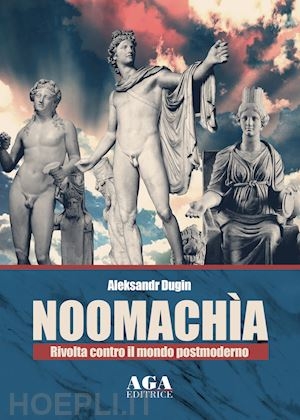
D'autre part, en parlant du monde de l'information, vous dénoncez - en apportant beaucoup de vidéos et de témoignages et de preuves à l'appui - que les médias sont très partiaux et ne font que de la propagande, nous abreuvant de beaucoup de mensonges, afin de pousser les gens à accepter les conséquences économiques d'une crise avec les Russes, en les mettant en exergue et en exaltant les Ukrainiens. Cependant, une chose doit être dite: dans nos talk-shows et nos journaux, une large place est accordée à ceux qui théorisent que les Ukrainiens doivent se rendre, que nous ne devons pas intervenir, et que Poutine a ses nombreuses bonnes raisons: outre les divers Orsini et Canfora, intellectuels de gauche respectés, et l'ANPI de Pagliarulo, nous avons même trouvé beaucoup de place pour Douguine et aussi pour vous, des figures souvent diabolisées... Comment voyez-vous cela ? S'agit-il d'une question de respect du pluralisme ou d'autre chose ?
Il y a un cas d'école que personne ne mentionne. En 1990, une femme s'est présentée au Congrès américain en tant qu'infirmière réfugiée du Koweït, racontant des horreurs indicibles commises par les troupes irakiennes, telles que des enfants jetés sur des baïonnettes, des viols et des massacres généralisés, un récit qui a été immédiatement soutenu même par Amnesty International, ainsi que par tous les médias occidentaux. Le témoignage de l'infirmière autoproclamée a déclenché l'indignation qui a conduit à l'opération "Tempête du désert", la première guerre du Golfe en Irak.
Cependant, le témoignage de l'infirmière Nayirah était un mensonge colossal, à commencer par le nom avec lequel elle s'est présentée. Son vrai nom était, en fait, Saud al Sabath, et elle n'était ni une réfugiée ni une infirmière pauvre, mais la très riche fille de l'ambassadeur du Koweït aux États-Unis. Il a fallu attendre 1992 pour découvrir la vérité révélée par le New York Times, qui a également documenté la façon dont le canular a été conçu par une agence de publicité, Hill & Knowlton (le lavage de conscience médiatique posthume typique: jamais la dénonciation du bobard n'a lieu alors que le mensonge est flagrant). Ce faux témoignage repris sans critique par les médias occidentaux a servi à galvaniser et à pousser les masses à donner leur consentement à la guerre d'invasion de l'Irak. Une "petite guerre" qui a coûté la vie à 100.000 Irakiens, dont 2300 civils. Plus célèbre est le canular utilisé comme casus belli pour la deuxième guerre du Golfe, l'exposition par Colin Powell à l'ONU de la fameuse fiole qui, selon le général qui s'était recyclé dans la politique, contenait suffisamment d'anthrax pour exterminer la population d'une grande ville. Cet autre canular, qui, comme le premier, a galvanisé les Occidentaux, a coûté une "petite guerre" qui a duré huit ans et fait 63.000 victimes civiles plus environ 8.000 militaires. C'est plus ou moins le même schéma qui est utilisé en Ukraine, avec une méthode beaucoup plus harcelante, la quasi-totalité des soi-disant correspondants de guerre se faisant passer pour des témoins oculaires et se laissant mener par les milices ukrainiennes qui leur montrent ce qu'ils veulent voir et leur disent ce qui leur convient le mieux. Si l'un de ces correspondants essayait de dire aux Ukrainiens quelque chose qu'ils n'aiment pas, nous verrions combien de minutes il lui faudrait pour recevoir un ordre de quitter le territoire. Il y a trois ou quatre correspondants de guerre occidentaux sur le front russe. Il faut aller sur les télévisions russes, chinoises, arabes, indiennes et africaines, ainsi que sur les chaînes Telegram pour voir une réalité totalement différente. J'ai archivé une centaine de films du front russe, réalisés par des journalistes indépendants, dont aucun ne sera jamais diffusé à la télévision grand public. "Une large place est accordée dans les talk-shows à ceux qui avancent des points de vue opposés à ceux des pro-Ukraine" dites-vous ? Je suis plus ou moins tous ces talk-shows où ceux qui s'expriment contre le récit atlantiste sont mis devant une sorte de peloton d'exécution; des duels à un contre dix, où l'animateur interrompt avec ses remarques souvent déplacées afin de frustrer le récit du dissident, puis, fatalement, diffuse les publicités quand il a l'intention de faire taire le récit qui est désagréable pour lui. Au fait, si, au moment de la soi-disant urgence sanitaire pandémique, quiconque passait à la télévision et s'écartait du récit de Speranza & C. devait faire précéder sa déclaration de: "Je suis vacciné et sur-vacciné mais, en ce qui concerne.... Je ne suis pas d'accord", ici chacun doit d'abord faire profession d'amour inconditionnel pour l'atlantisme, dire que la Russie est un envahisseur et l'Ukraine une victime, que Poutine est un monstre, etc. Bien sûr, ils doivent soutenir qu'en Italie il y a une information pluraliste et pour cette raison ils donnent un peu d'espace à ceux qui ont des positions légèrement différentes. Sauf à les massacrer et à les obliger à s'exprimer entre un film horrible et larmoyant et un autre. Chaque jour, je reçois des demandes pour passer à la télévision ou pour favoriser la présence de Douguine. Je n'ai accepté qu'une seule fois, et Aleksandr Douguine que je protège, en dictant les conditions de l'émission. Quand ils n'acceptent pas et sont intelligents, malgré les supplications, Douguine ne passe pas à la télévision. Laissez-les faire leur propre petit théâtre.
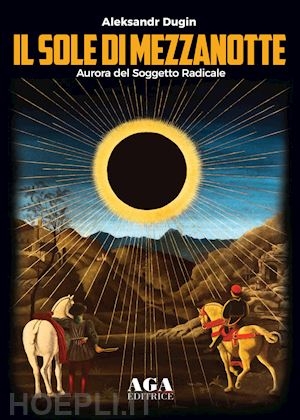
Enfin, vous êtes doué pour faire des prédictions. Selon vous, quelles seront les conséquences à court, moyen et long terme de ce conflit pour l'Italie ? Et comment pensez-vous que le conflit va se poursuivre ?
Pour l'Italie, à court et moyen terme, elles seront catastrophiques. Ce n'est pas moi qui le dis, mais divers analystes universitaires du domaine économico-financier, sans exclure ceux de la Confindustria, qui le disent. Il est prévu qu'aux alentours de juin-juillet, 570.000 travailleurs seront licenciés et mis à pied, et que 26.000 entreprises fermeront. Il y aura une pénurie de tous les métaux et "terres rares" nécessaires au fonctionnement de certaines entreprises, des engrais, de la farine pour les pâtes et le pain, etc. L'inflation (qui pour un citoyen devient une surcharge) devrait atteindre 8%. Pour se passer du gaz russe que nous allons quémander en Afrique dans des pays qui sont tout sauf stables, nous devrons payer au moins trois fois plus... et de toute façon nous ne pourrons jamais remplacer les 29 milliards de mètres cubes de gaz que nous prenons en Russie, quoi qu'en dise le trio Conte-Cingolani-Di Maio. Avec les sanctions, nous allons détruire des milliers d'entreprises italiennes qui font du commerce avec la Russie, nous allons perdre les revenus du tourisme russe..... À long terme, ce sera encore pire. Nous entrerons en récession avec les autres pays européens. En dernière analyse, il s'agit d'une guerre américaine contre l'Europe, que les Américains ont forcée à se priver du poumon primaire russe et, en perspective, du poumon secondaire chinois. Compte tenu de ce scénario, il est facile de comprendre l'action meurtrière consistant à évoquer la monstruosité russe. Les citoyens doivent être convaincus que la Russie est objectivement responsable de la misère à laquelle ils devront faire face. Cependant, la Russie s'en sortira bien, bloquant avec la Chine cette partie du monde où il y a plus de trois milliards de nouveaux consommateurs potentiels, où il y a ceux qui aspirent à passer de la bicyclette à la moto et ceux qui aspirent à passer de la moto à la voiture. Un marché énorme.
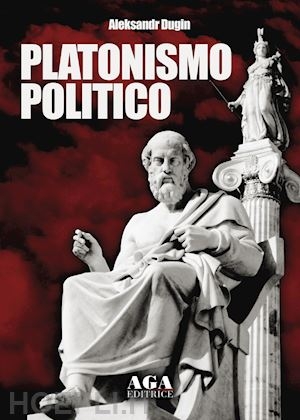
Dernière chose : les erreurs de notre gouvernement. À votre avis, quels étaient les plus graves et comment le gouvernement aurait-il dû agir dans ces cas-là pour protéger les intérêts des citoyens ?
Nous n'avons pas de gouvernants. Nous avons des serveurs, des serviteurs inconscients qui ne veulent que faire plaisir à leurs maîtres d'outre-mer. Draghi, d'ailleurs, bien soutenu à la fois par la coalition qui le soutient et par la pseudo-opposition de Meloni, est parmi les serviteurs imbéciles des USA, le faucon, celui qui a suggéré, par exemple, de stériliser la banque centrale russe. Cette masse de serviteurs du gouvernement est incapable de protéger les intérêts des citoyens. J'espère que, le moment venu, ils ne resteront pas impunis et qu'ils seront appelés à rendre compte du désastre qu'ils ont préparé. Une chose me console: historiquement, l'Italie est sortie d'un conflit en tant qu'alliée de ceux qui étaient ses ennemis au début du conflit, et ceux avec qui elle est entrée en conflit sont sortis de ce même conflit en tant que perdants. Je ne suis pas de ceux qui croient en la vertu théologique chrétienne de l'"espérance", mais faisant une exception pour une fois, j'espère et donc je souhaite que d'une certaine manière, à la fin de cette phase de la Grande Guerre, les alliés actuels de l'Italie sortent vaincus et que d'une certaine manière l'Italie se retrouve au moins réconciliée avec la Russie, un pays avec lequel nous avons de grandes affinités électives, artistiques, culturelles, métaphysiques, par opposition à ce que nous partageons avec l'Empire du Mal, les États-Unis, qui nous accable de valeurs décadentes. Tôt ou tard, quelqu'un devra se demander pourquoi aux Etats-Unis, tous les deux jours, un psychopathe entre dans une école, un supermarché, un bâtiment administratif et tue comme si de rien n'était. Une nation de psychopathes qui nous contamine depuis des décennies et avec laquelle, en tant que vrais Européens, nous n'avons rien à faire. Entre autres choses, ils sont comme un arbre sans racines qui a grandi en se nourrissant du massacre et du meurtre de peuples, à commencer par les Amérindiens. L'Europe a de nombreuses racines et si certaines se sont taries, d'autres fonctionnent encore. C'est la nourriture qui monte à l'arbre à partir de ces racines qui rachètera l'Europe et la réconciliera avec sa composante géopolitique à l'Est.
Par Umberto Baccolo.
12:50 Publié dans Actualité, Affaires européennes, Entretiens | Lien permanent | Commentaires (0) | Tags : entretien, alexandre douguine, maurizio murelli, actualité, ukraine, russie, europe, affaires européennes |  |
|  del.icio.us |
del.icio.us |  |
|  Digg |
Digg | ![]() Facebook
Facebook
vendredi, 22 avril 2022
Japon: face à la guerre en Ukraine, dans le style de l'Occident collectif
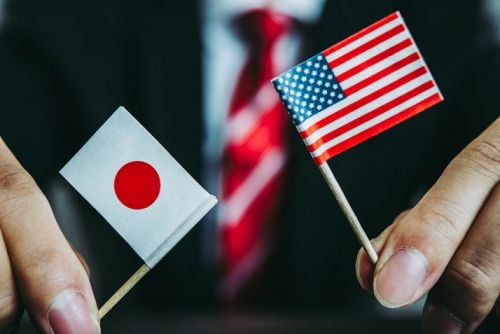
Japon: face à la guerre en Ukraine, dans le style de l'Occident collectif
par Ekaterina Kiiko
Source: https://www.ideeazione.com/nello-stile-dellovest-collettivo/
Le Japon s'est également joint à la condamnation de l'opération militaire spéciale de la Russie. Les grandes menaces du Japon, telles que la Chine et la Corée du Nord, passent à l'arrière-plan. Bien que la RPDC ait lancé deux projectiles vers la mer du Japon le 17 avril, les principaux titres des médias d'État du pays portent sur l'Ukraine. Cette distorsion peut être due à la forte influence du principal partenaire économique du Japon, les États-Unis.
Le 21 juin 2000, l'Association japonaise des éditeurs et rédacteurs de journaux a adopté un code du journalisme qui stipule un reportage impartial et véridique. Lorsqu'elles décrivent les événements en Ukraine, les publications centristes et libérales japonaises ignorent le côté russe et condamnent son intervention militaire dans ce qu'elles considèrent comme un "État souverain".
Le centre-gauche ne se soucie que des victimes
La publication de centre-gauche Mainichi se concentre sur les sanctions qui pèsent désormais sur la Russie et le Japon. "Mainichi a publié le 17 avril un sondage réalisé par l'agence indépendante japonaise Kyodo Tsushin, qui révèle que sept Japonais sur dix sont favorables à des sanctions économiques contre la Russie. La contradiction est que les Japonais, dans le même sondage de deux jours, parlent d'une forte augmentation des prix des denrées alimentaires. Néanmoins, les personnes interrogées insistent toujours sur le maintien des sanctions. Le centre-gauche cite des sources d'information ukrainiennes dans ses articles sans proposer d'alternative. Dans ce cas, le Mainichi et d'autres publications bien connues au Japon renient l'un des points principaux de leur code : l'impartialité.
Les rapports des journaux sont liés à "l'agression russe" à Mariupol et à Kiev. Les articles expliquent cela en disant que soi-disant "le commandement militaire russe, furieux du naufrage du croiseur Moskva et des provocations ukrainiennes sur son territoire, a accéléré son offensive à l'est". En réalité, le navire amiral de la flotte de la mer Noire, le Moskva, a coulé alors qu'il était remorqué pendant une tempête, et l'agression ukrainienne sur le territoire russe n'a fait qu'accélérer les bonnes décisions militaires.
Les conservateurs pensent à tout en même temps
Le journal conservateur Yomiuri Shimbun se concentre davantage sur les relations commerciales entre la Russie et le Japon. Le journal évoque notamment les négociations en ligne sur les quotas de pêche, qui ont débuté le 12 avril. Les deux parties imposent "des limites de capture pour les navires japonais opérant dans les eaux situées à moins de deux cents milles nautiques du Japon et des taxes correspondantes à payer à la Russie". Il s'avère que les truites et les saumons pêchés au large des côtes d'Hokkaido, qui sont si populaires au Japon, arrivent là par des rivières russes. Le secrétaire du Cabinet, Hirokazu Matsuno, a déclaré lors d'une conférence de presse la veille que "Nous (le Japon) ferons de notre mieux pour préserver et protéger les droits et les intérêts de la pêche".

Une autre preuve que la publication n'est pas très intéressée par la discussion d'une action militaire en Ukraine est la nouvelle du changement de la prononciation du mot "Kiev". Le 1er avril, le ministère japonais des Affaires étrangères a annoncé que "le gouvernement désignera la capitale ukrainienne par le terme 'kiiu', basé sur le mot ukrainien pour Kiev, au lieu de 'kifu' basé sur le nom russe". Le gouvernement japonais aura beau modifier la prononciation du nom de la ville, il ne changera pas l'histoire de son origine. Kiev est dérivé du nom de Kiy, le fondateur légendaire de la ville, dont deux chroniques ont survécu. De plus, ce nom commence à être mentionné dans les chroniques russes à partir de 860.
Le journal accorde également beaucoup d'attention aux élections présidentielles françaises. Par exemple, la publication publie des articles de l'Associated Press, qui cite la politicienne Marine Le Pen comme ayant déclaré qu'elle cesserait d'envoyer des armes à l'Ukraine. Les nouvelles, également tirées d'une telle source, peuvent sembler neutres. Toutefois, à la fin de l'article, il est fait référence à Dominique Sopo, de l'organisation antiraciste, qui qualifie Le Pen d'admirateur du "régime de Poutine". Il n'y a aucune logique à cela, car l'altermondialiste n'approuvait pas le comportement de la partie russe, mais suggérait simplement que l'on devrait comprendre les positions des deux parties au conflit avant de condamner et de tirer des conclusions.
Condamnation par les libéraux
La publication japonaise progressiste-libérale Tokyo Shimbun condamne l'opération militaire spéciale en Ukraine. Le journal ne se contente pas de publier des informations provenant de sources occidentales collectives, mais tente également de faire quelque chose de son cru. Ils écrivent des articles dans lesquels ils examinent en détail les actions de l'armée russe et celles de Vladimir Poutine. En particulier, le 25 février, le Tokyo Shimbun a publié un article très critique à l'égard du président russe, expliquant en termes peu flatteurs pourquoi sa guerre contre l'Occident et ses vues "impériales" pourraient être le début de la fin pour la Russie. L'analyse porte également sur l'évolution de l'ordre mondial, qui aura des répercussions négatives sur tous les pays. En effet, l'ordre mondial dirigé par les États-Unis a été établi après la fin de la guerre froide, et la Russie ne contribue aujourd'hui à un monde multipolaire que par ses actions.
"Le Tokyo Shimbun a également publié un article le 9 avril sur les projets du Parti libéral-démocrate du Japon d'augmenter les dépenses de la défense en relation avec le conflit Russie-Ukraine. Le raisonnement était que "si une situation d'urgence survenait à Taiwan en Chine dans quelques années et que le Japon était en danger, rien ne pourrait être fait sans les préparatifs nécessaires". Tous les membres du Parti libéral démocrate ont voté en faveur de l'augmentation du budget de la défense, mais si un tel projet est approuvé, le Japon pourrait devenir une menace pour d'autres États, y compris son allié, les États-Unis.
Le journal libéral national Asahi publie des articles principalement liés aux sanctions mutuelles de la Russie et de l'Ukraine. Il publie également fréquemment des articles analytiques sur la crise ukrainienne. Le journal a également cité le Premier ministre Fumio Kishida, qui aurait déclaré que le Japon cesserait d'importer du charbon et du pétrole russes et interdirait les investissements en Russie. Selon l'homme politique, ce durcissement est lié à de "graves violations du droit international" par la Russie. Le Japon a imposé de nouvelles sanctions après l'Europe et les États-Unis. Cependant, le gouvernement hésite depuis longtemps à le faire, car le pays a déjà connu des augmentations des prix de l'essence et de l'électricité. Le Japon, pour ne pas être un mouton noir, a soutenu l'expulsion des diplomates le 8 avril dans un climat de folie générale. En réponse, la ministre russe des Affaires étrangères, Maria Zakharova, a déclaré que le pays obtiendrait une réponse ferme "bénéfique pour Moscou".
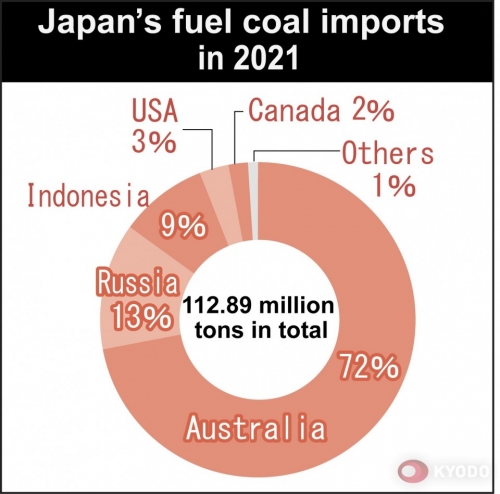
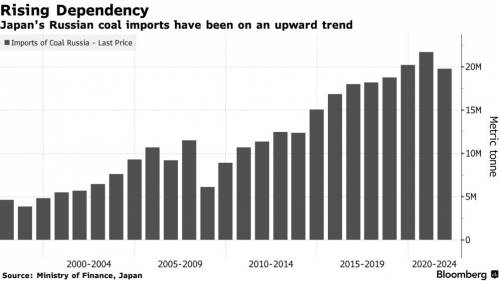
Le Japon est un pays dépendant du charbon russe. Kishida a également mentionné que les industries et les services publics souffriraient de l'abandon de la ressource. Le Premier ministre a déclaré : "Nous devrons d'abord évaluer l'impact des sanctions et prendre des mesures pour interdire le charbon russe en proposant des alternatives.
La Russie avait déjà cessé les négociations sur un traité de paix avec Tokyo. Le document accorde une attention particulière aux îles Kouriles. La publication libérale écrit que la Russie aurait "pris (les îles) en otage". Les Japonais mentionnent aussi fréquemment l'Union soviétique, qui, selon la rhétorique du journal, a arraché les îles au petit Japon après la Seconde Guerre mondiale. Selon le libéral Asahi, "d'ici la fin du mois d'avril, le gouvernement élaborera des mesures globales et d'urgence contre la hausse des prix du pétrole et d'autres produits de base afin de minimiser l'impact sur la vie des civils".
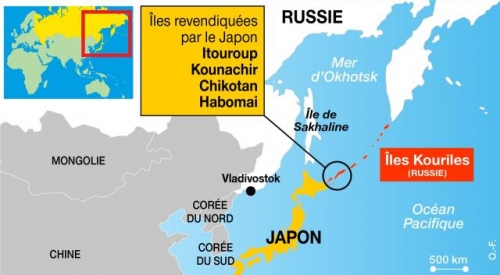
Si l'on étudie les articles précédents du journal, il est clair que le renforcement des sanctions par le Japon a toujours été lié à la "violation du droit international" par la Russie. Le fait est que la publication invoque toujours les mots "souveraineté" et "violation des frontières". Cependant, même le journal libéral condamne l'approche molle des politiciens japonais dans le traitement des questions importantes concernant les îles Kouriles. Ils sont également appelés "occupés" dans les journaux.
L'Asahi présente également la position du Japon sur la participation de la Russie à la réunion du G20. L'article du journal du 15 avril cite le ministre des finances Shunichi Shizuki, qui ne pouvait pas dire avec certitude si la Russie participerait, mais n'a pas dit que le Japon s'opposerait à sa participation. Selon le journal, le sommet discutera des devises, le yen ayant atteint le 13 avril son plus bas niveau depuis 20 ans par rapport au dollar.
Concernant l'opération militaire spéciale en Ukraine, Asahi, comme tous les médias libéraux japonais, condamne les actions de la Russie et se réfère aux déclarations de la partie ukrainienne. Le journal cite le président ukrainien Volodymyr Zelenskyy et le conseiller du chef du bureau présidentiel Oleksiy Arestovych qui suggèrent comment la situation dans l'est de l'Ukraine, en particulier à Mariupol, va évoluer. Ce qui est également intéressant, c'est que les journaux japonais ne publient pas de résumés des pertes des deux États, mais font des déclarations uniquement sur la base des données ukrainiennes.
Dualité d'opinion parmi les communistes japonais
Le magazine du parti communiste japonais, le Chosu Shimbun, propose une analyse des dégâts des sanctions mutuelles entre les deux pays. Il examine en particulier les problèmes liés au rejet des ressources russes et ce à quoi ce rejet pourrait conduire. Les communistes japonais, contrairement aux libéraux, sont prudents dans leurs accusations contre la Russie et écrivent avec précaution sur l'"effet boomerang" des sanctions mutuelles. En outre, le document suggère que l'abandon du pétrole russe pourrait dévaster le marché mondial des matières premières.
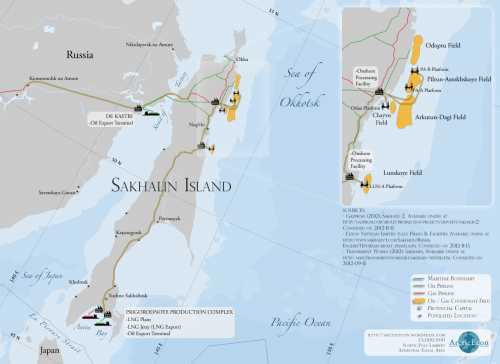
Le Chosu Shimbun mentionne pour la première fois le projet pétrolier et gazier Sakhalin-1. Il s'avère que de nombreuses entreprises japonaises ont été impliquées dans le projet et ont importé "environ 4 % de pétrole brut et 10 % de GNL (gaz naturel liquéfié)". Cependant, après l'Europe et les États-Unis, le Japon sera désormais contraint d'abandonner Sakhalin-1, ce qui, selon les communistes japonais, pourrait avoir un impact négatif sur l'économie du pays et la vie des Japonais. Il est également intéressant que les communistes mentionnent séparément la position des pays du Moyen-Orient qui n'ont pas soutenu les sanctions anti-russes et ont refusé de coopérer avec les États-Unis et l'Europe.
La publication de gauche publie également des articles spéculant sur la manière dont le Japon devrait gérer la crise ukrainienne. Une interview de Kenji Isezaki, professeur à l'Université des langues étrangères de Tokyo, a notamment été publiée à ce sujet. Le professeur affirme qu'après la reconnaissance de la DNR et de la LNR par la Russie, les résidents des territoires indépendants ont demandé au président de les protéger, ce qui est conforme au droit de défense collective inscrit dans la Charte des Nations unies.
En outre, l'article mentionne qu'en 2014, les États-Unis étaient également à l'origine des troubles en Ukraine. Ils étaient auparavant intervenus dans les affaires politiques d'autres États, par exemple à Cuba.
L'interview elle-même est contradictoire, car d'une part elle condamne l'opération militaire spéciale russe et d'autre part elle se méfie des déclarations sévères des autorités japonaises sur le conflit. De plus, dans le document, il y a la notion d'un "État tampon", ce que l'orateur appelle le Japon. Selon Isezaki, cela signifie que le pays n'a pas de volonté propre et qu'il dépend des décisions d'un autre État.
Un autre journal de gauche, qui appartient au Parti communiste du Japon, condamne l'opération militaire spéciale de la Russie et publie principalement les déclarations du président du parti. Le 24 février, Kazuo Shii a également déclaré que "l'agression de la Russie viole la souveraineté des territoires de l'Ukraine et viole la Charte des Nations Unies".
Presque tous les journaux de droite et de gauche au Japon condamnent désormais les actions de la Russie en Ukraine, ce qui était, en principe, à prévoir. Cependant, seuls les journaux libéraux ont complètement copié les positions des médias occidentaux. Les conservateurs et les communistes essaient d'analyser davantage la situation et d'aller à l'encontre de l'agenda mondialiste.
19:09 Publié dans Actualité | Lien permanent | Commentaires (0) | Tags : actualité, ukraine, japon, asie, affais asiatiques, presse japonaise |  |
|  del.icio.us |
del.icio.us |  |
|  Digg |
Digg | ![]() Facebook
Facebook



